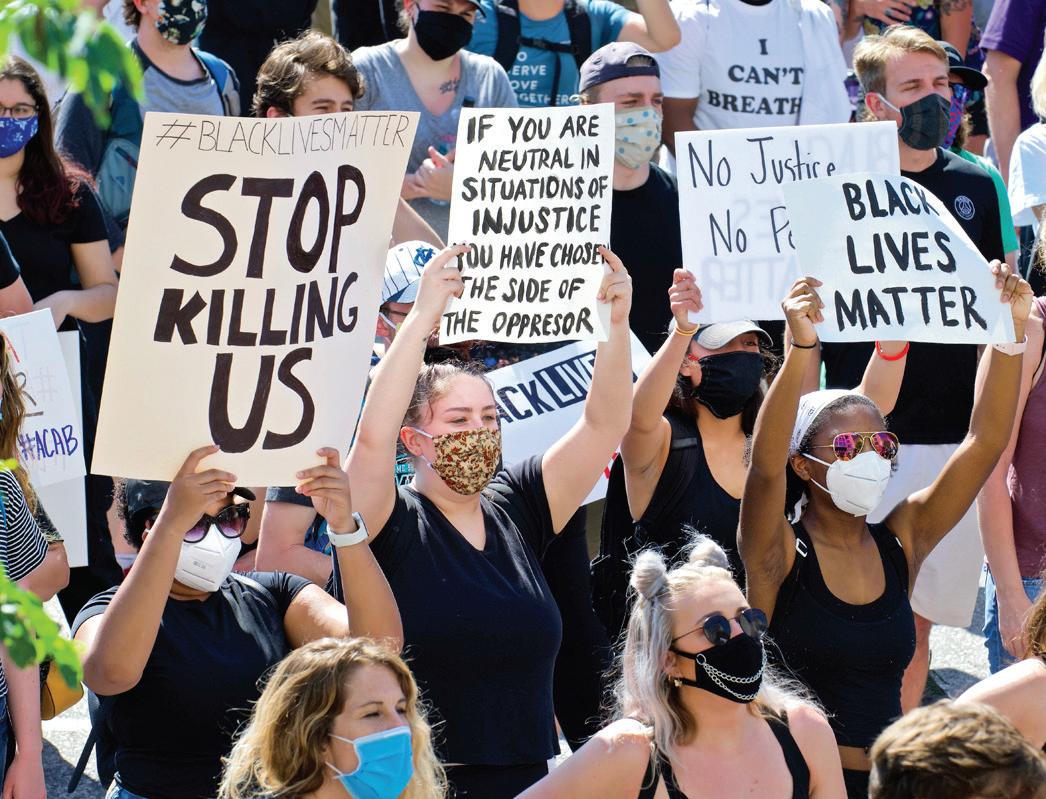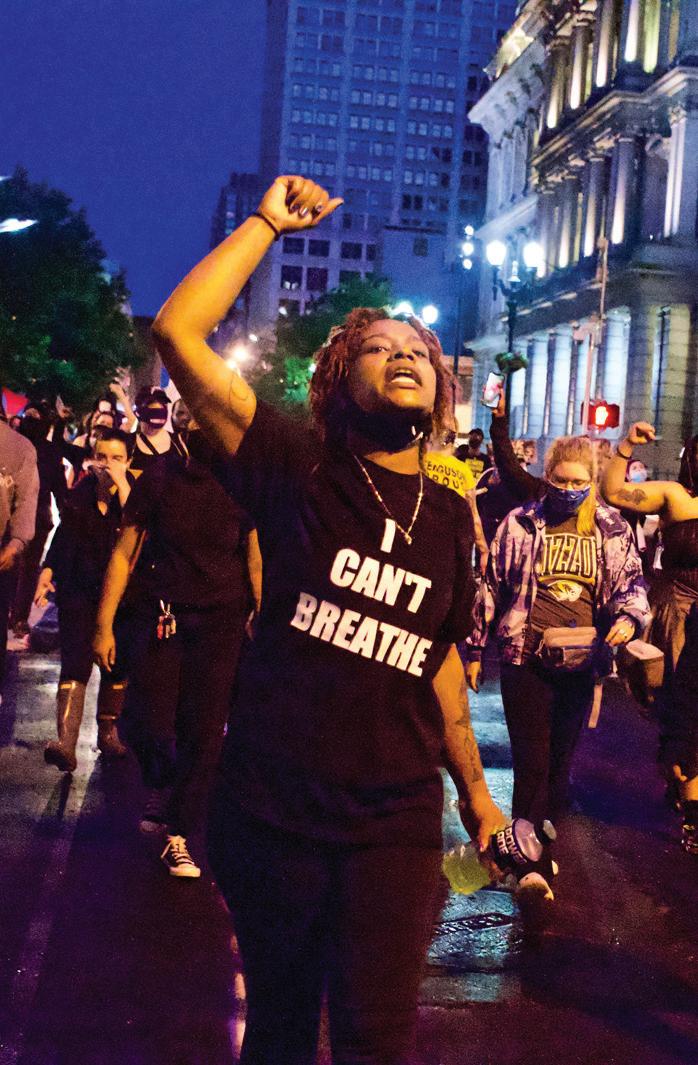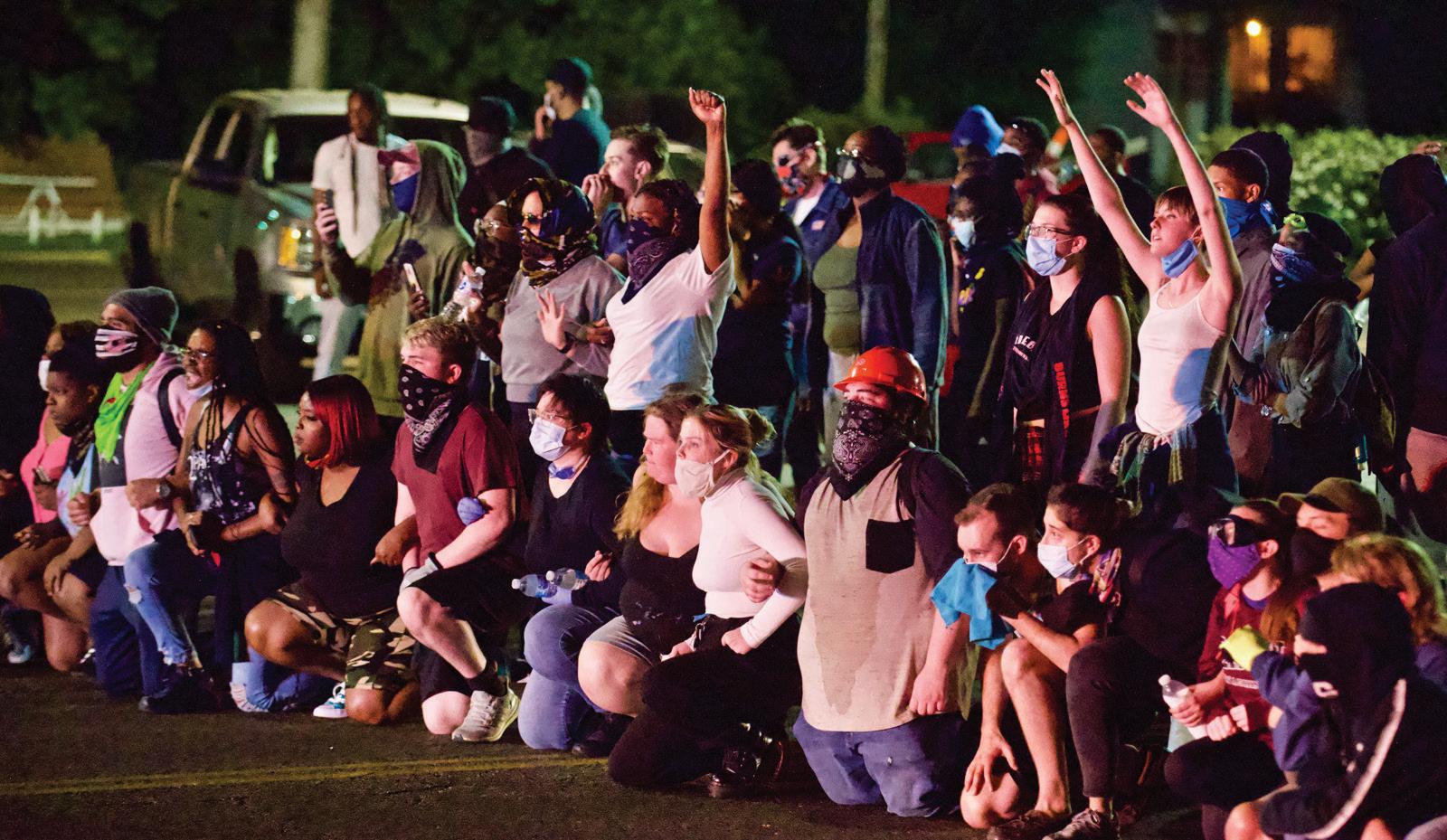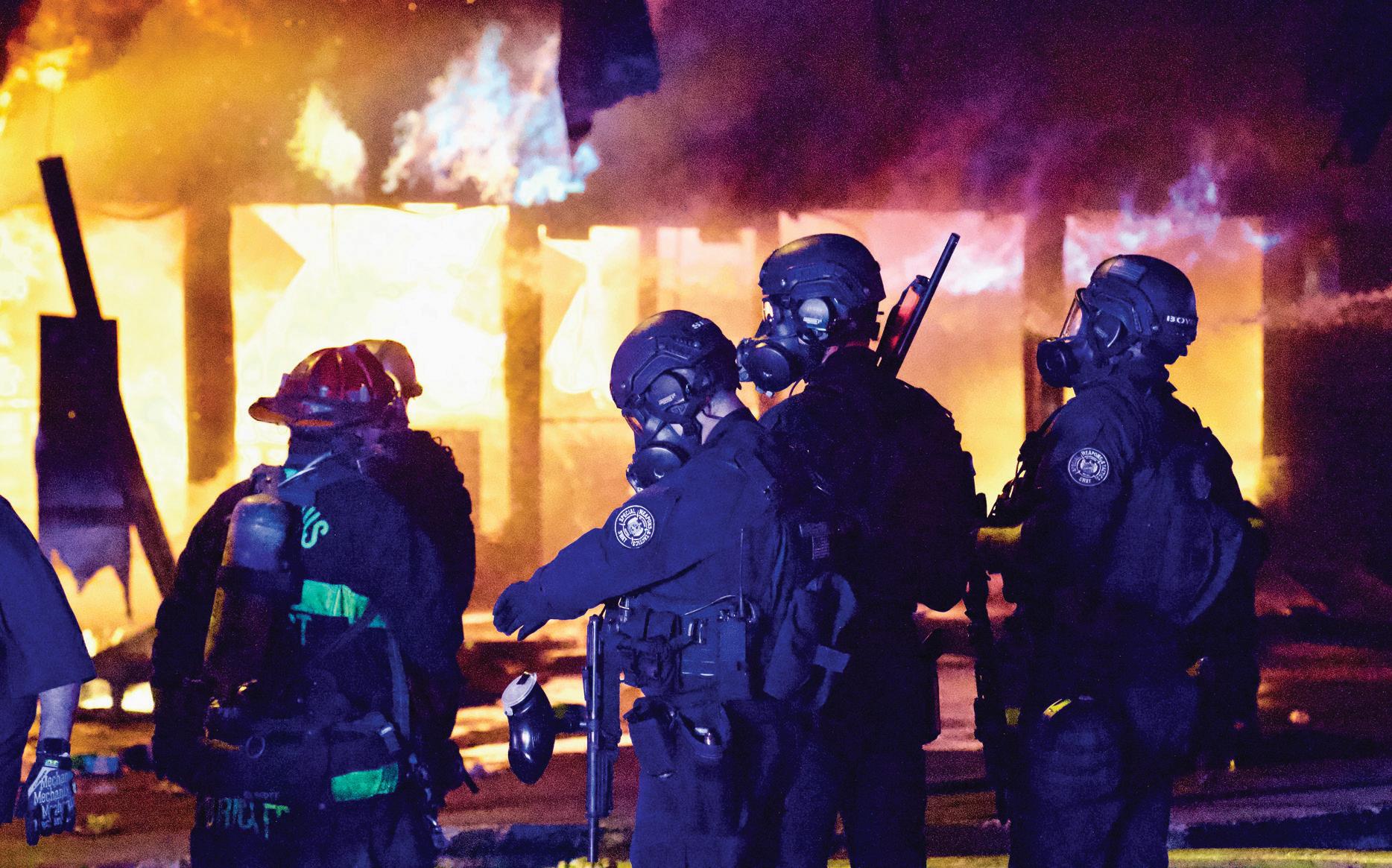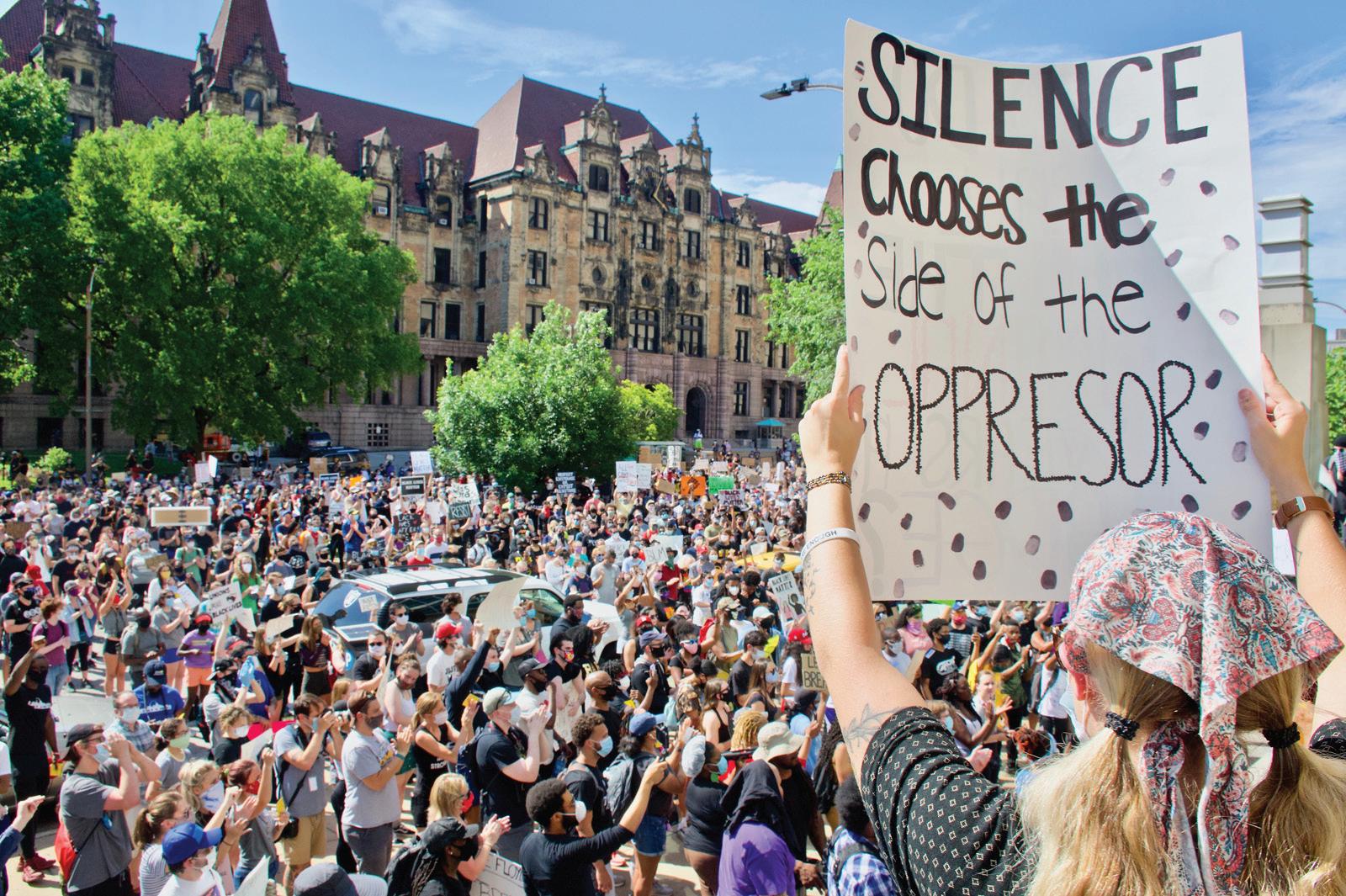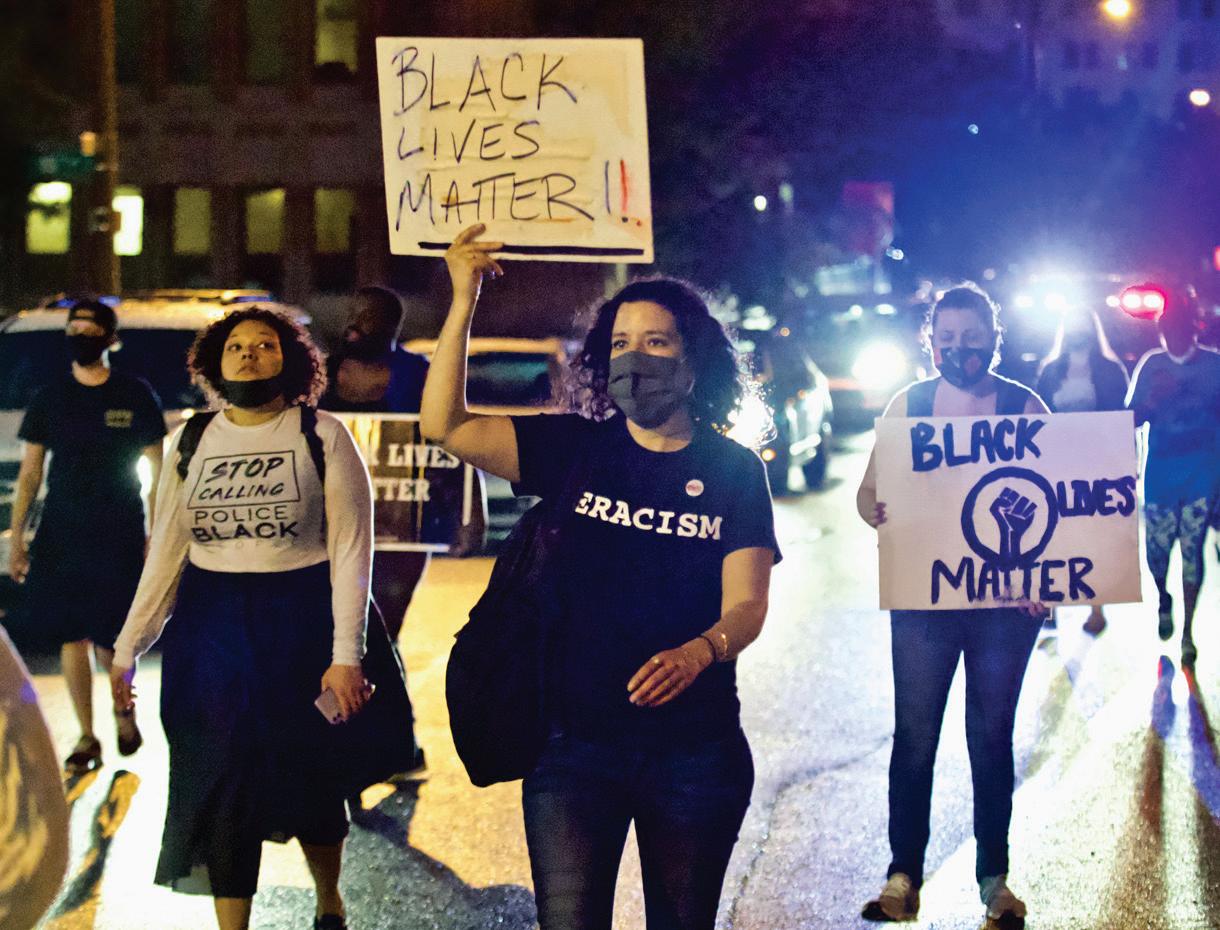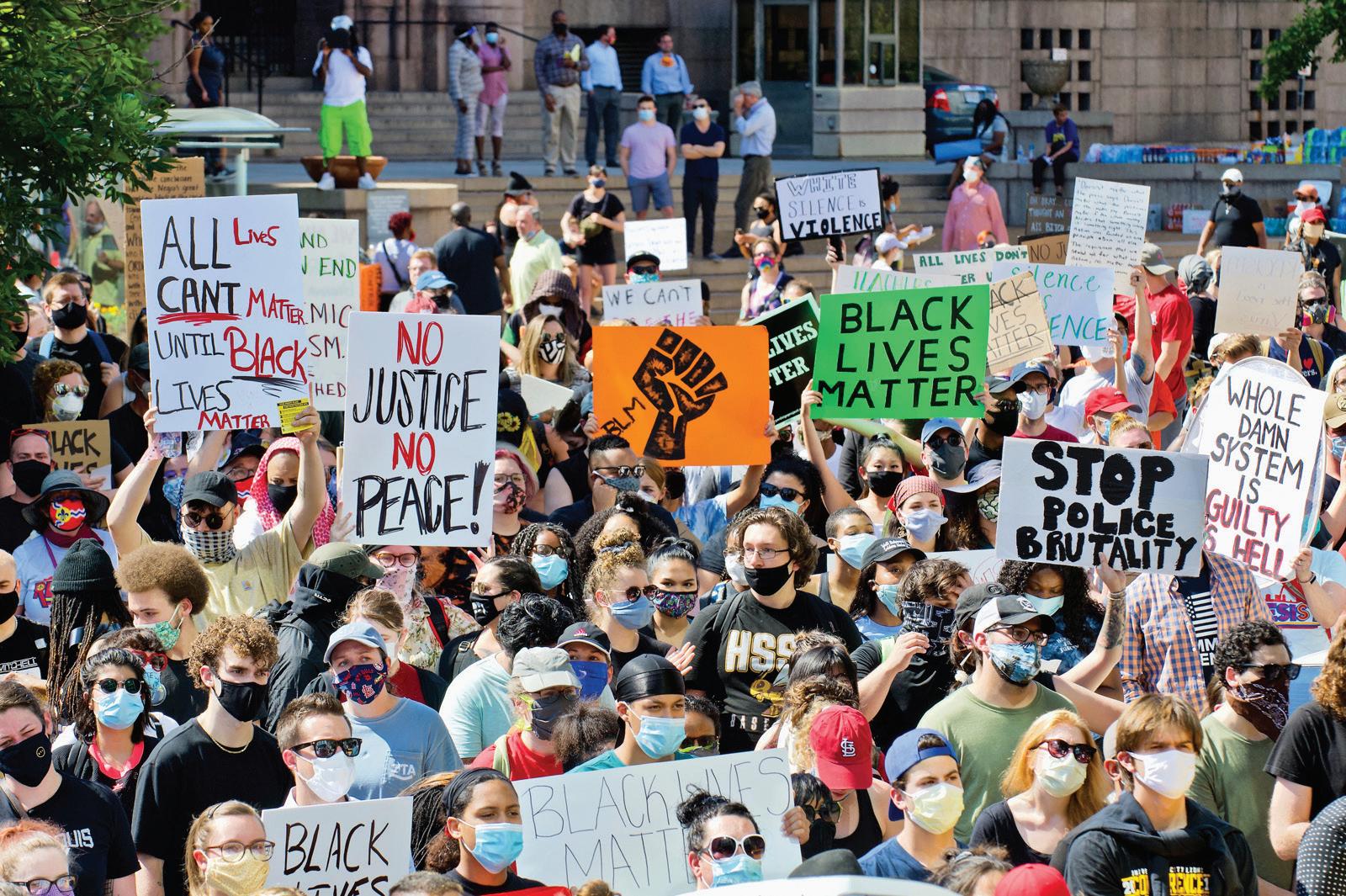






“During a pandemic, nobody should have their knee on any of our necks.
There’s
not enough respirators.”
– Kayla Reed, Action St. Louis
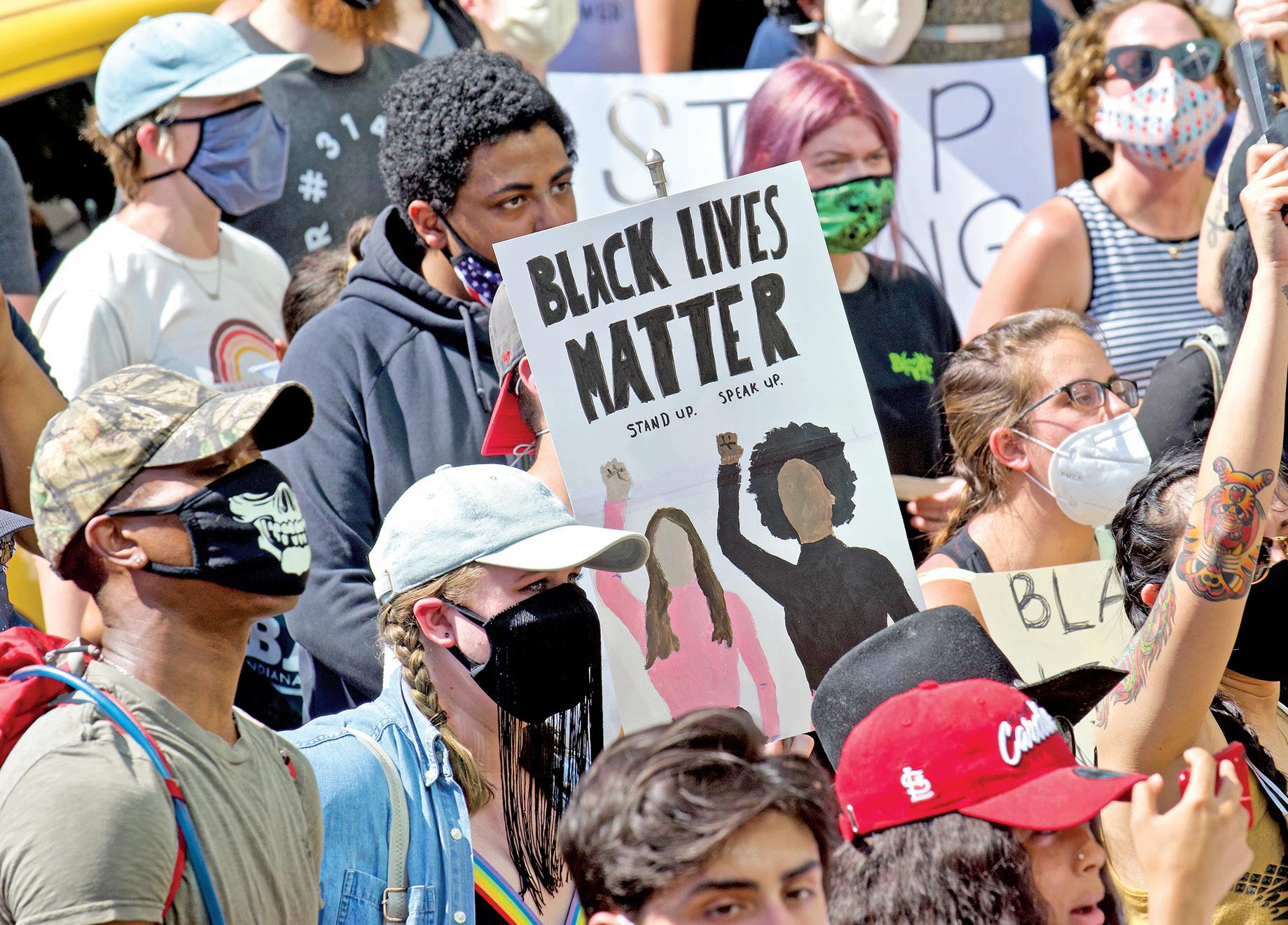
A diverse group protested police brutality in downtown St. Louis on Monday, June 1, as part of ongoing police accountability protests sparked nationwide by the Minneapolis Police killing of George Floyd. As of June 3, all four officers responsible for his death had been charged.
By Ashley Jones
For The St. Louis American
Thousands of people marched throughout the St. Louis region from Thursday, May 28 through Monday, June 1 to protest police brutality and the killing of George Floyd at the hands of Minneapolis police. Many carried signs with messages such as “Black Lives Matter” and simply “George Floyd.” They chanted slogans familiar from Ferguson and Stockley verdict protests: “Whose streets? Our streets” and “No justice, no peace, no racist police!” Masks, a common sight at former protests, now had another protective function, as many protestors followed public health guidelines and wore protective masks. St. Louis has only started to lifted public-health orders to control the COVID-19 pandemic.
“If we gonna have to be in the streets during COVID, then we’re going to be in the streets,” Kayla Reed, executive director of Action St. Louis and a Ferguson protestor, told the crowd in downtown St. Louis on June 1. “During a pandemic, nobody should have their knee on any of our necks. There’s not enough respirators.”
New mayors also elected in Berkeley and Pagedale
By Sandra Jordan Of
n “I see the city coming together, working together, so we can move forward,”
– Ella Jones, Ferguson mayor-elect
Ferguson Mayor James Knowles III. Knowles could not run for re-election due to term limits. Knowles defeated Jones in the 2017 mayoral election and has held the office since April 2011. He was mayor during the Ferguson protests of 2014-2015, notoriously watching the early days of protests from his couch. The city became the subjects of months of protests and part of a global conversation on the relationship between African
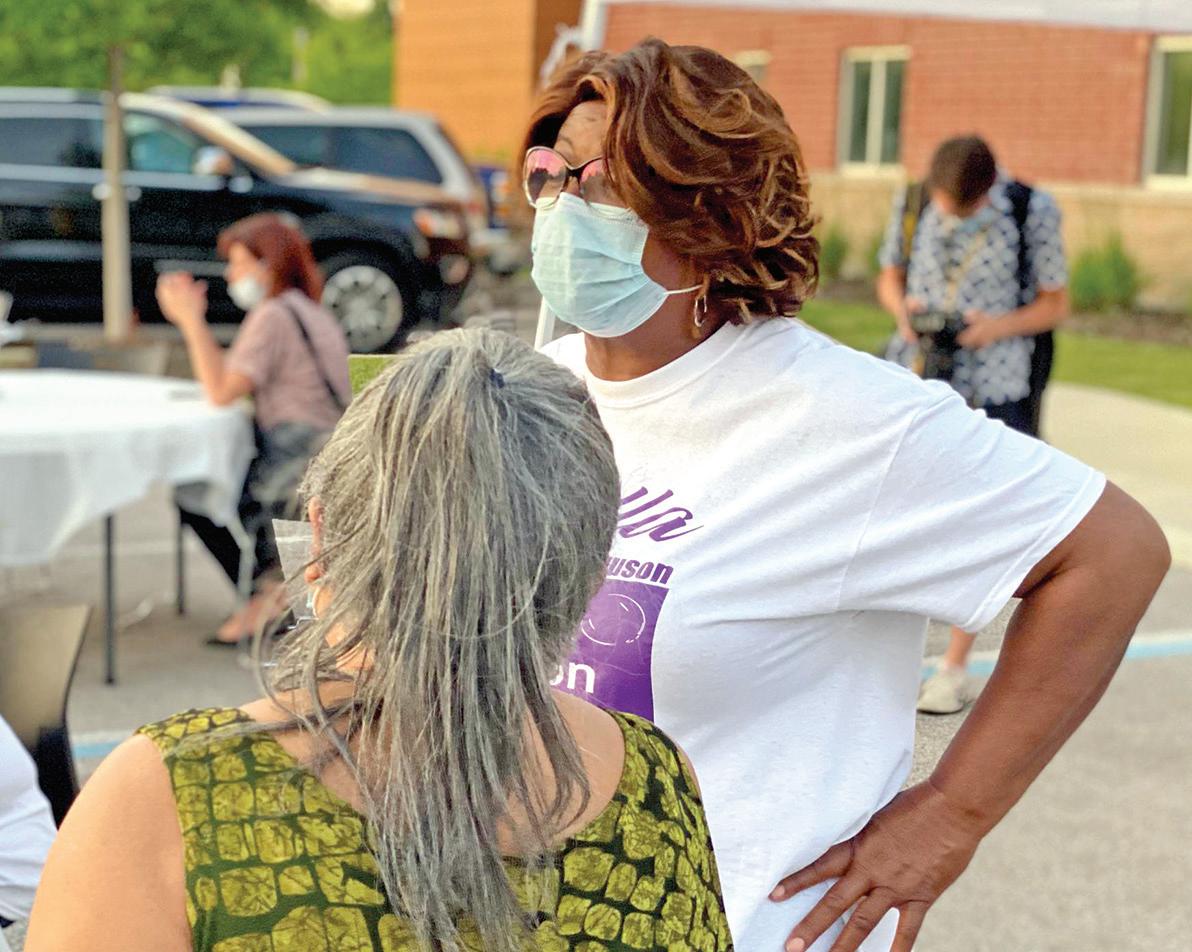
Ella Jones observed public-health precautions while watching election returns during the COVID-19 pandemic on Tuesday, June 2 at the Urban League’s community center in Ferguson. She made history when she became the first African American and first woman elected as mayor of Ferguson.
Leland Vittert of Fox News denies accusation from high school
By Chris King Of The St. Louis American
The activist and writer Brittany Packnett Cunningham, a St. Louis native, accused Fox News reporter Leland Vittert of harassing and spitting at her when they were students at John Burroughs School 20 years ago and demanded an apology. She made these claims and demands on Twitter on Saturday, May 30, where she has 283.1 thousand followers. More than a day after Cunningham made her claims and demand, he had not responded on Twitter, where he has 22.5 thousand followers.

The American asked Vittert to respond, and a Fox News publicist responded with a statement.’
“I can’t imagine the struggles Ms. Cunningham has faced in her life. But I was not a part of them. I can say unequivocally — I have never spit on or at anybody,” Leland Vittert stated. In his only post since she accused him of harassing and spitting at her, Vittert thanked Fox news colleagues for their concert and support. Vittert and crew were harassed and assaulted on Friday night while covering protests near the White House. It was the sympathetic news coverage Vittert received for that incident that sparked Cunningham’s tweet thread, which she introduced by writing, “For the sake of my own power, I’m going to say something I have never revealed in 20 years.” Then, in 16 tweets over a span of 12 minutes, she described Vittert’s alleged harassment of her,
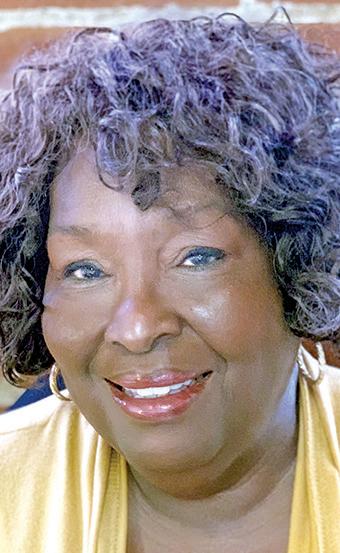
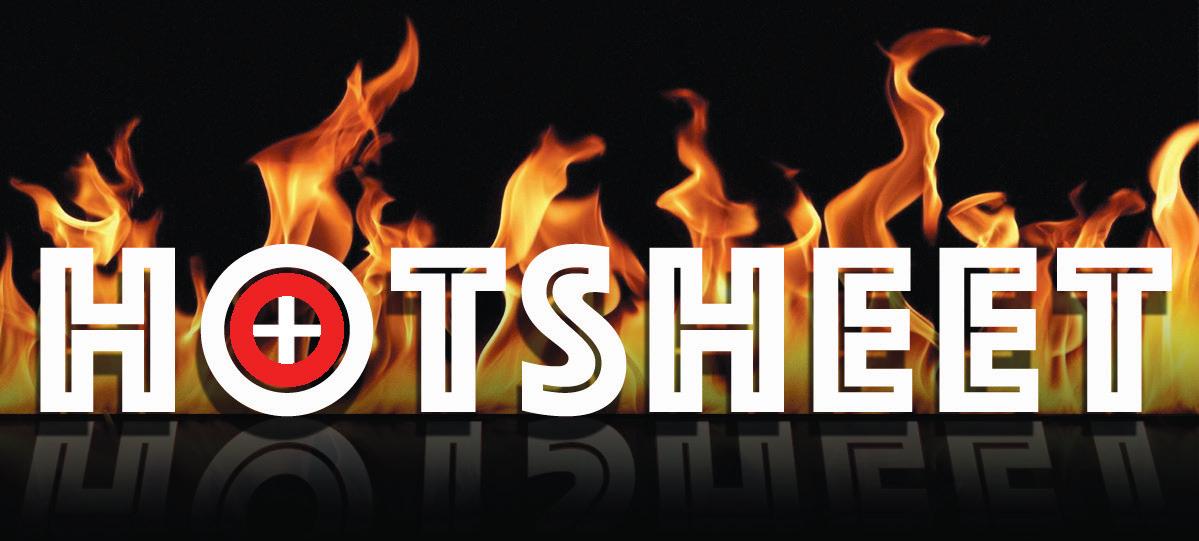
Jamie Foxx
“We cannot be silent anymore,” Foxx said via Instagram. “I’ve been going to rallies since Rodney King. When Trayvon Martin happened, I got a chance to forge a relationship with his mother, Sybrina Fulton who is now running for commissioner in Dade county Miami. We both have witnessed an acceleration of young black man being killed senselessly by police officers and random civilians trying to act like police officers. Being in Minnesota for George Floyd felt like the straw on the camel’s back. We have to change policy when it comes to police brutality. We will be heading up to San Francisco tomorrow to meet with the Mayor London Breed to have a Push for real change!! We cannot let all of these black folks down. #blacklivesmatter”
Beyoncé
said in a video posted on Instagram.
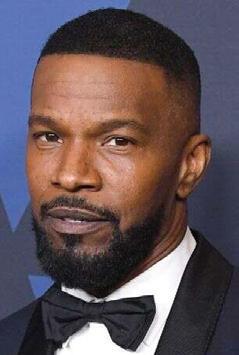

“We cannot normalize this pain. I’m not only speaking to people of color. If you’re white, black, brown and anything in between, I’m sure you feel hopeless by the racism going on in America right now. No more senseless killings of human beings. No more seeing people of color as less than human. We can no longer look away. our family – and humanity. He is our family because he is a fellow American. There have been too many times that we’ve seen these violent killings and no consequences. Yes, someone’s been charged, but justice is far from being achieved.
Continue to pray for peace and compassion and healing for our coun try.”
Rihanna
“We’re broken and we’re disgusted,” she

“Watching my people get murdered and lynched day after day pushed me to a heavy place in my heart! To the point of staying away from socials, just to avoid hearing the blood cur dling agony in George Floyd’s voice again, begging over and over for his life!!! The look of enticement, the pure joy and climax on the face of this bigot, murderer, thug, pig, bum, Derek , haunts me!! I can’t shake this! I can’t get over an ambulance pulling up to an arrest, a paramedic checking a pulse without removing the very thing that’s hindering it! Is this that [expletive] normal??? If intentional MURDER is the fit consequence for “drugs” or “resisting arrest”... then what’s the fit con sequence for MURDER???!

“For the last few days, the mag nitude of devastation, anger, sadness I’ve felt has been overwhelming to say the least,” Rihanna said via Instagram.
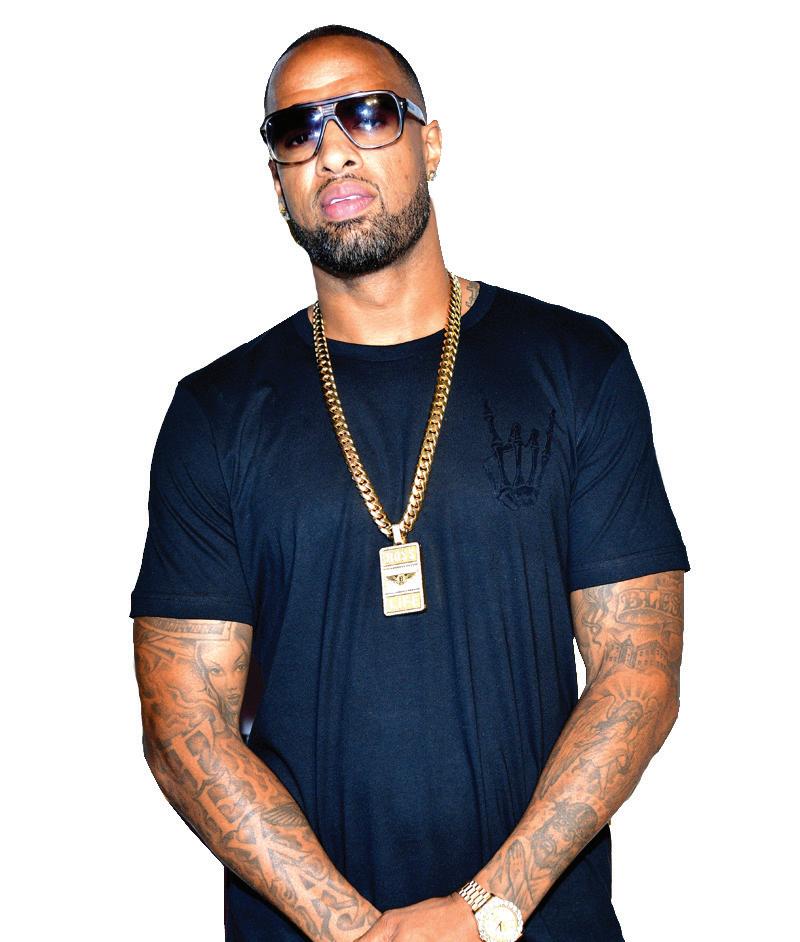

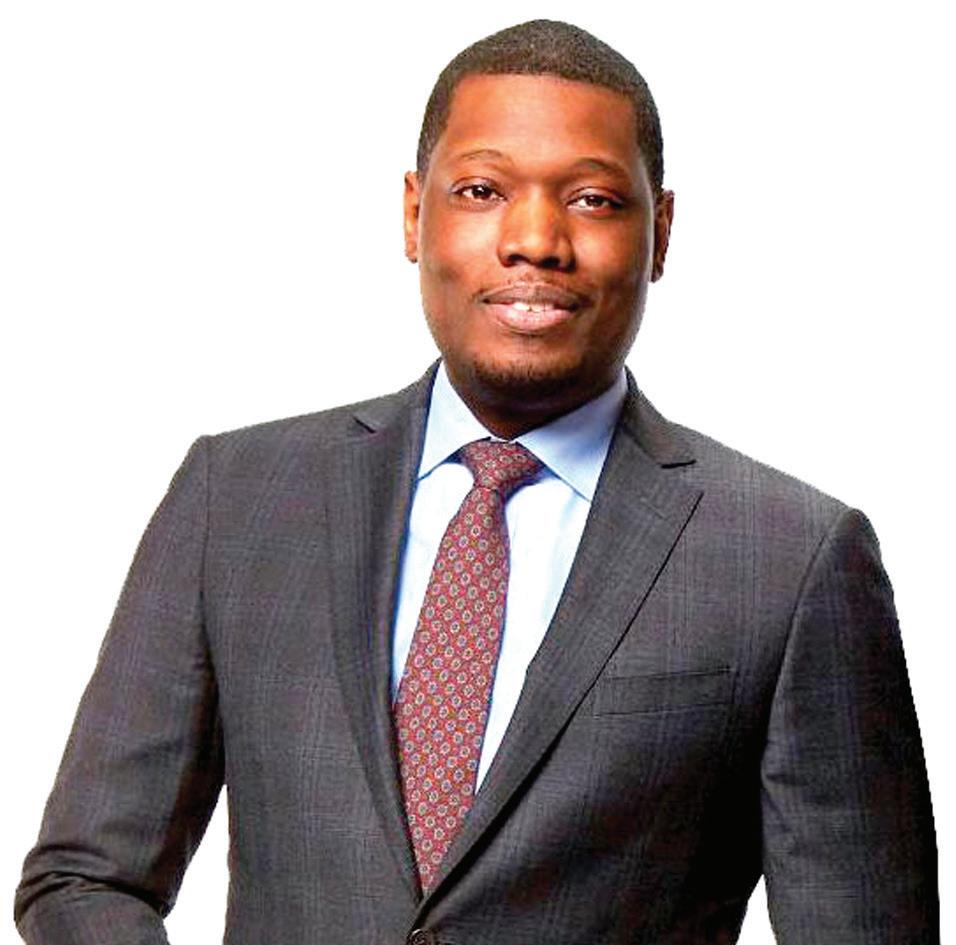
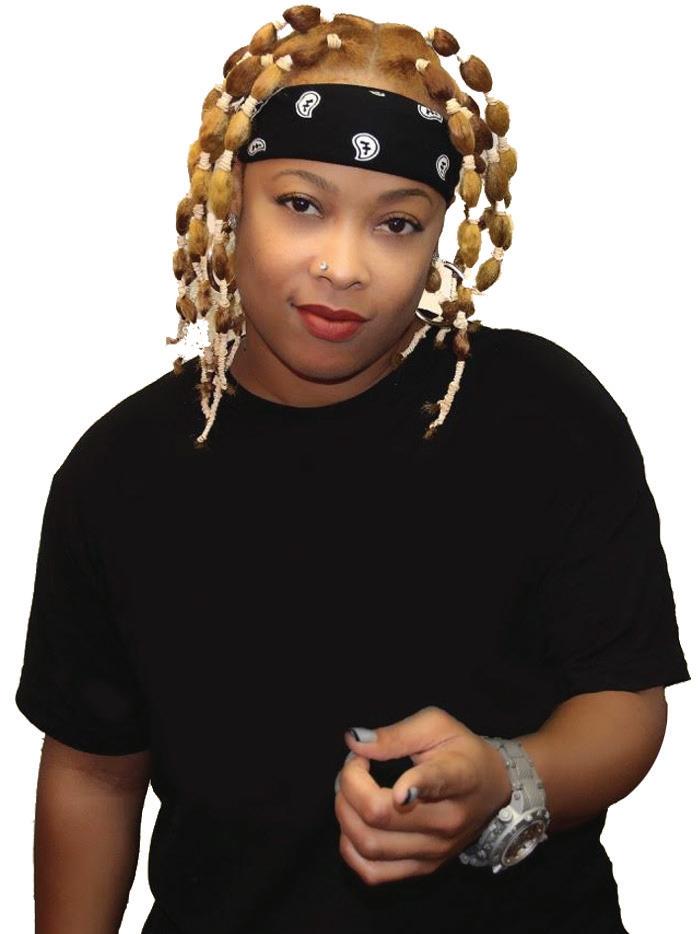
#GeorgeFloyd #AhmaudAr
Philando



Castile, so, so many ... the laundry list of names,” Cannon said in an interview with “Access Hollywood.” “Even in the same week as George Floyd, there was four other police killings. Obviously this one was recorded on camera, and I think to see a white man kneeling on the neck of a black man as he takes his last breath, and the white man has his hands in his pockets, so cavalier in a crisis – that we have now normalized trauma. You know what I mean? [That] we see public lynching daily on cycle on a feed, is something we can’t normalize. And it hurts my heart, and I cry at night, man. It’s hard to even wake up every day knowing that we have to get back into this fight. But we’re going to do it. We’re going to do it. I’m ready to put my life on the line for this, because there’s nothing more important to my community, nothing more important to my family. Nothing more important to me, than to evoke change in a real way.”
Sources: Instagram, Access Hollywood, CNN.com



By Chris King Of The St.
on days that schools have been closed. Students can receive P-EBT benefits even if they have been or continue to receive meals
provided by the school district during the school closure. If your child was not previously eligible for free or reducedprice meals, but you have now lost income, you may be eligible to receive P-EBT benefits. The funds are placed on an Electronic Benefit Transfer (EBT) card families use to buy food. If you received Food Stamp (SNAP) benefits in March, do not apply for these new/additional benefits. The full $302 will automatically be loaded to your existing EBT card. If you did not receive Food Stamp (SNAP) benefits in March, you must apply for this benefit by June 30. Art McCoy, superintendent of Schools for the Jennings School District, has been working to make sure district fami-
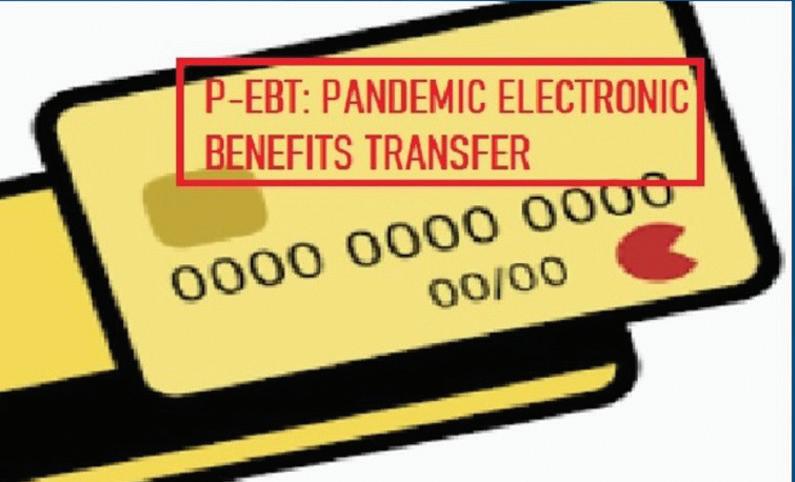
lies are aware of the benefit. He wrote a letter to district families on May 20 after the Missouri
Department of Social Services finally announced approval for the program.
The virus is still out there waiting to attack us
By Rance Thomas For The St. Louis American
Where has the coronavirus gone? Is it still among us? All 50 states have reduced their restrictions to some extent, some more than others. Many businesses have reopened with some restrictions that tend to vary from one state to another. In some states and areas, we
see people acting as if everything is normal. That is, they are no longer abiding by the suggestions of scientists, such as wearing protective masks, maintaining social distance (6 feet apart from one another), and avoiding crowded gatherings. It is only natural for individuals to want to relax and celebrate to some extent after being
sheltered in their homes and barred from gathering in some venues for several months. As a sociologist, I realize that people are social beings and want or even need to socialize with others. However, during times like this, they need to be mindful that their health and the health of their loved ones are at stake. In spite of the opening of various businesses and organizations, we still need to maintain some sense of caution. This is the case because scientists tell us that the virus is still out there waiting to attack us when we let down our guards. We are still in the middle of a pandemic. About 18 states
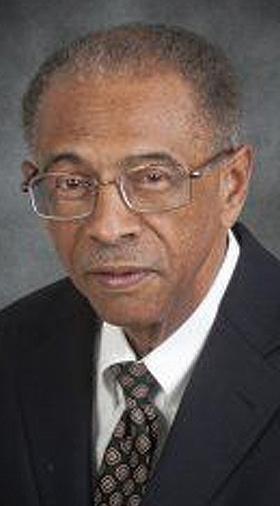
report an increase in the number of those affected by the virus and an increase in the number of deaths due to the virus. Seventeen states report that there has been a decrease in the number of individuals infected in their states; however, there are some questions about whether they are reporting accurate data. In fact, it has been reported that in some states the governors have prohibited scientists and health agencies from reporting their actual figures. This appears to be the case to please the politicians, business owners, and leaders who want to open the economy by getting back to work and keeping it going. Therefore, they do not
“This is not a Jennings School District program. But here is the good news,” McCoy wrote.
“Special provisions are available to students enrolled in certain schools.
The Community Eligibility Provision (CEP) provides eligible school districts the opportunity to offer free meals to all students in high poverty schools.”
Jennings School District is a
want to admit that the reopening is causing more infections and deaths. If they did, it might result in a demand for another closing. No matter what the states are doing, scientists tell us that it is still a fact that the virus is still among us and will be with us until a vaccine has been developed to prevent us from being infected. It has been reported by the scientific community that we may not have an effective vaccine until 2021. Therefore, we still need to continue to practice those means that are helping us avoid becoming victims for a little while longer. Once again, these include wearing masks, maintaining social distance, frequently washing your hands for at least 30 seconds, and avoiding large crowds.
CEP district, as is Saint Louis Public Schools and many other districts in the region.
“As such, students attending schools that participate in CEP are eligible to receive P-EBT. Households must submit an application to apply for the P-EBT card for children who received free meals through one of these special provisions.”
The most efficient and fastest way to apply is to submit your application online at EmergencyMealSurvey.com/ MO. You may also download a paper application at https:// tinyurl.com/PEBT-Paper. If you have questions, contact the Missouri Department of Social Services at 855373-4636 or visit mydss. mo.gov website.
A recent study found that wearing masks alone reduces the transmission rate of the virus by 75 percent. Of course, there are some individuals who believe or say masks do not make a difference. However, if they do not, then why do doctors and nurses working in hospitals wear them? They have been wearing them for many years. Why take a chance?
Rance Thomas was a faculty member in Sociology/Criminal Justice and served as lead faculty/coordinator of Sociology at Lewis and Clark Community College for 30 years. He became the first person in the college’s history to be granted the Professor Emeritus Award when he retired in 2002.
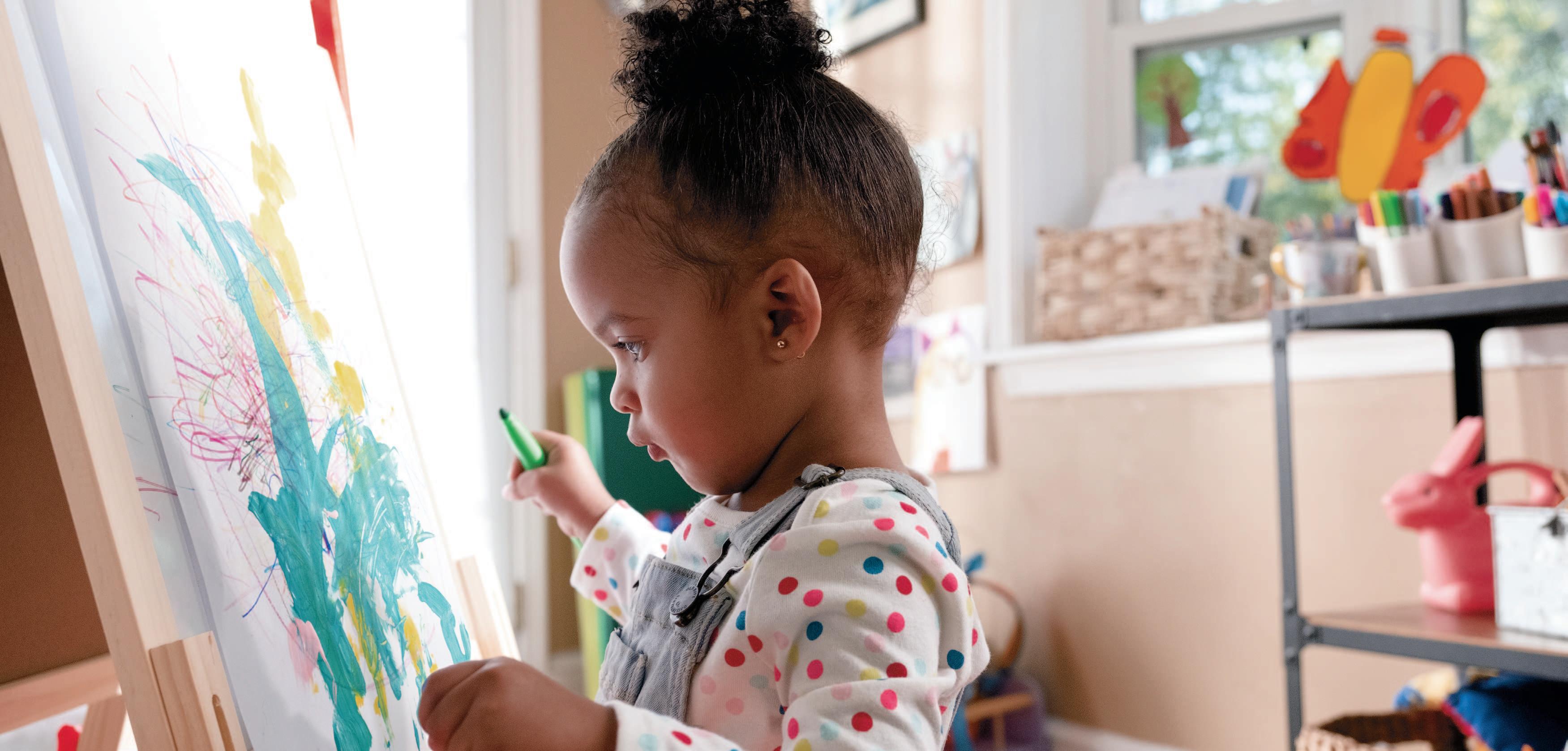
If you could do one thing for your community, what would it be? More daycare centers? More funding for Head Start? Completing the 2020 Census is a safe and easy way to inform how billions of dollars in funding flow into your community for hundreds of services. Respond online, by phone, or by mail.
May George Floyd rest in peace and may we bring lasting justice for African Americans in his memory. Before protests began over his torture and murder and the failure to arrest immediately the policemen who killed him, black mothers rocked with grief. How do we make sense of a world where the state and vigilantes can execute us?
How do we teach our children to value themselves and each other when the larger society does not?
We know that was the collective us under the knee of Officer Chauvin. We felt him squeezing the life out of us as he squeezed it out of George Floyd, just as Trump and his enablers are squeezing the life out of American democracy. Our dream for a different America bled out as we watched a white cop brazenly strangle a black man literally in front of the eyes of outraged bystanders who implored him to stop.
The police murder of George Floyd might have disappeared like so many other murders of black people by police, even when witnessed by the community. But fortunately this modern lynching was documented by a courageous 17-year-old, AfricanAmerican Darnella
With that evidence for the world to see, we started to protest and fight back.
systemic racism in the streets.
Protests are growing larger with support and involvement beyond the black community. People of all races are showing up to protest again and again. They are multiplying. While some infiltrators try to hijack the movement, the movement grows in size, power and strength. It grows with a spirit that appears to increase with every attack despite some aggressive policing and the National Guard.
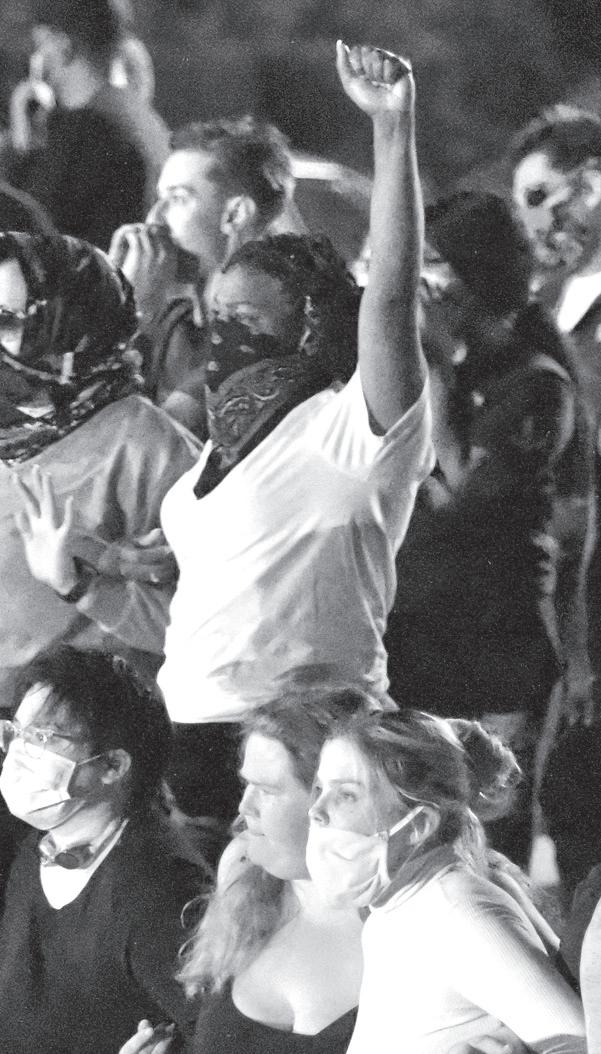
George Floyd is a part of the collective us. We are part of all the African Americans who have been tortured and executed by police with impunity. They knew they could get away with it because of our race. A piece of us suffered and died with George Floyd. But we rose up in his name and are fighting back.
Some new, outraged young activists have linked their words and purpose with veteran organizers to seize the moment. Even some elders are willing to face the dual risk to their lives, with careful precautions, in the face of the COVID-19 pandemic and the threat of police violence when they protest police brutality and
The intractability of racism in this country that we are fighting can be measured by the tribalized sector of white America that supports Trump. Even with his abysmal mishandling of the COVID-19 pandemic and the vast, needless loss of life, and despite recent polls that show that little more than 20% of Americans approve of his handling of these protests, still 33% of Americans hang on tightly. It is our duty to vote our strength, defeat them by punishing Trump at the ballot box on November 3.
The killers of George Floyd – hopefully, all four of them – will come to justice, we pray. The movement sparked by his torture and murder will continue to outlive him and bring justice from his senseless killing. Our brave young leaders in the streets and new, responsive officials in elected office face the daunting challenge of bringing lasting justice from the ashes of this tragedy. We must remake this into a country where police officers no longer feel entitled to harass and kill black people with no consequences. We must remake this into a country where, when police officers do others harm, they face the same system of justice they are paid to enforce. We must remake this into a country where black people enjoy equal justice and treatment under the law. We must remake this into a country where black lives matter.
By Jessie L. Adolph For The St. Louis American
Minneapolis Burning did not begin with Police Officer Derek Chauvin placing an NFL-style knee on the neck of George Floyd—it started with Trump’s whisper.
Although social media users falsely accused Chauvin of attending a Trump rally and wearing a “Make Whites Great Again” hat, nonetheless the president’s influence was felt. Donald Trump is a chameleon demigod worshipped by a base who have historically been repulsed by men and women of color. He is like the demon Magda from Showtime’s Penny Dreadful: City of Angels Magda (played by Natalie Dormer), a shape-shifting supernatural being, does not use powers to seduce mankind to engage in evil. Instead, she incites man to give in to his hateful nature. The demon accomplishes her goal by reminding us, “All mankind needs to be the monster he truly is is being told he can.” Like Magda, Trump reminds those who have access to institutional power to dominate because they can do so. For instance, in his July 2017 speech to police officers and crime victims on Long Island in New York, he encouraged law enforcement to use excessive force when dealing with suspects. The president mimicked police officers placing suspects in police vans. He urged law enforcement to go against trained protocol in comments such as: “Like, don’t hit their head, and they just killed somebody — don’t hit their head.” Trump continued. “I said, ‘You can take the hand away,’ OK?” Here the president devalued the humanity of suspects who should be deemed innocent
until proven guilty. Also, it is important to note, Trump’s veiled consent to officers was aimed at “thugs” or “gang members” who he deems second-class citizens. Recently, black people are considered criminals if they birdwatch, run, sleep, eat ice cream in their homes, or play cops and robbers in the park.
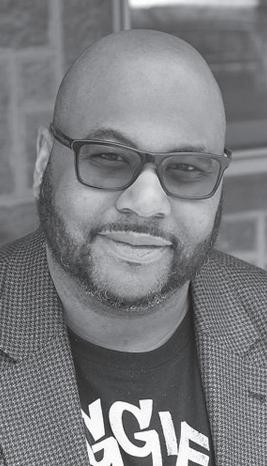
Since the so-called ending of slavery, African Americans have been criminalized by a justice system that utilizes lethal force to render them voiceless. Black people cannot breathe under America’s legalized terrorism without the fear of being lynched. Indeed, President Trump cannot be blamed for the United States’ history of racism. However, Trump’s constant whispers of hate encourage many in law enforcement to engorge and satisfy a bloodlust to purge the most vulnerable. In Reconstruction, the government allowed white males to violently vent their hatred for black liberation through terrorist groups like the KKK. Today, Trump manipulates and awakens a past evil—white backlash—for those lost souls who felt emasculated by the Obama administration. But instead of double-holed sheets, many of these frustrated men and women infiltrate law enforcement, using their shield like a burning cross to inspire fear. The president’s weaponized whispers empowered Chauvin to place his knee on Floyd’s neck. Floyd’s death becomes a cinematic symbol of the MAGA dream to maintain a racial pyramid where white
By Michael Jones For The St. Louis American
On May 26 of this already hellacious year, George Floyd was murdered by a police officer and his accomplices in Minneapolis. I am tired of talking to and explaining basic concepts to white people. They know right from wrong; it’s why they wait until the hoods are ready or the badges are bestowed. Anonymity or immunity has long been required as the uniform of slaughter. I want to talk to us.
We as black people in this country have adopted several white traditions into our cultural sphere: Thanksgiving, Fourth of July, urban sprawl, conservatism – and, now, the circulation of the visuals of murdered black bodies for entertainment.
Murdering black people randomly and racially became an American pastime directly after 11 Southern states spent four years committing treason, when poor white folks no longer had to fear rich white folks in regards to “destroying their property.” When black people no longer belonged to anyone, we started being hunted for sport and out of spite.
As soon as the photograph became accessible to Americans, one of the most eagerly photographed things was the corpse of a murdered black person. Pictures of “strange fruit” began to show up in newspapers and postcards. Men, women, children (some still alive right now) even posed and smiled by the bodies. In some areas, a rite
of passage was taking a white child to see a public murder. Black death was just as much of a pastime as it was a tool of oppression.
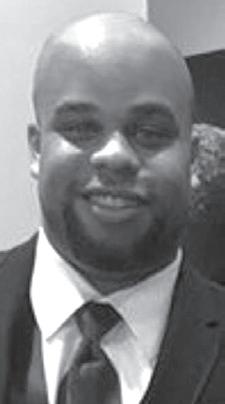
Somewhere along the line we as African Americans internalized this as acceptable and normal. In the smartphone era we have picked up a tradition that had to be abandoned by a nation whose leaders no longer felt like explaining it at world conferences. Every time a black murder is recorded, the video or picture is shared by us all over our platforms. You can see Mike Brown’s body in the street. You can witness Ahmaud Arbery and George Floyd’s last moments on this earth. There is no legitimate reason why we need to circulate murder tapes between us. It doesn’t make anything hit home anymore with the tape than it does without it. Death does not need any more descriptors. You are biologically wired to do everything possible to keep yourself alive; there is no stronger will than the will to live. Murder is already suitably outrageous as a concept; there is no need to make it visual.
In 1955 Mamie Till decided to open the casket at the funeral of her son Emmitt. She made this decision at the sacrifice of a bit of her sanity for the great-
George Floyd had a right to live
Hate is rising in the United States with a zeal, emboldened by the White House, among others. It is a stain on our humanity, and good people must gather together to resist and repel it.
supremacy rests on the backs of black bodies.
In Penny Dreadful: City of Angels, Magda’s goal is to silently create anarchy so that humankind can destroy one another. Likewise, in the chaos Trump hides his hand as Minneapolis smolders under the flames he produced. As the ink dries on this moment in America’s racist history, many lives will be lost and property will be destroyed. Sadly, the life of Floyd will be replaced by another hashtag of a person of color represented by Benjamin Crump.
Furthermore, the police officers will not be charged with yet another murder of an unarmed black person. The federal government will not enforce or limit the power of the so-called “champions of people” if they maintain the status quo. The government will not nationally require police officers to wear body cameras or punish officers for the use of deadly force.
Trump will stoke the flames to cover his political transgressions and to justify his presidency for a second term. For he will use the riots that Martin Luther King Jr. called “the language of the unheard” to argue for a stricter police state. The businesses destroyed will lead to further impoverishment of communities of color, and the cycle of conflict between law force and the poor will continue to spin. We do not need a crystal ball or a psychic hotline or tarot cards to rationalize these said predictions. All we have to do is listen to the whispers from a time when America used to send them, the criminalized other, out on stretchers.
Jessie L. Adolph is a college professor of African Diaspora Studies.
Nearly six years after the death of Eric Garner, how many more black men will die at the hands of authorities after saying “I can’t breathe”? George Floyd had a right to live. If Floyd had been white, would that police officer have continued to put his knee on Floyd’s neck after hearing him say he couldn’t breathe? Black families deserve to raise their children in a world that does not traffic in this gross inhumanity, and that does not also force them to bear the burden of confronting it.
If you were jogging like Ahmaud Arbery, or sleeping like Breonna Taylor, or driving like Philando Castile, you were simply living as a black person in America—until you weren’t. Every black person in this country has a right to live, a right to breathe, and a right to be a part of their community without fear of violence and senseless attack simply for the color of their skin.
The Minneapolis Police Department—like many police precincts across this country—must address the systemic stereotypes and profiling that make incidents like these all too common. We support the FBI in conducting a thorough investigation, and we implore the Justice Department to conduct a civil rights investigation into this murder.
Randi Weingarten, president Lorretta Johnson, secretarytreasurer Evelyn DeJesus, executive vice president AFT Washington, D.C.
Racism is our underlying disease
In Minneapolis, an African American man, George Floyd,
er good of us as a people. But it was her decision. We blatantly disregard the wishes of wives, mothers and children and add upon their trauma and grief by sharing the death of somebody they love. We claim it in the name of raising awareness when it’s really just commandeering the life and death of a person who never volunteered to be a point for anybody’s cause.
This isn’t Martin’s body. It isn’t Malcolm’s body. You didn’t know who any of these people were. You don’t own the body, and you don’t own the grief. The decision to share isn’t yours. It speaks to a disturbed psyche that one would be curious to willingly witness somebody else dying. It shows a lack of communal self-esteem and a devaluing of our purpose. It’s disconcerting that one of us can be murdered and we can decide in that moment that we can define his purpose and disregard the thoughts and feelings of a family just to entertain ourselves. And I mean entertainment. After you viewed it, you did absolutely nothing besides share it and talk about it – just like a cat video. We aren’t any more advanced for watching that video than had we just read about the incident. We must stop seeing our bodies both alive, but especially dead, as not belonging to us. We are not for consumption, in life or death.
Michael Jones is a native St. Louisan and co-founder of The Free Roots Project.
All letters are edited for length and style.
was killed by police, resulting in the firing of four officers.
George Floyd’s death comes on the same day that a white woman in New York threatened an African-American birdwatcher by calling the police and invoking his race. The following day, black people protesting the brutal murder of Mr. Floyd were assaulted with police tear gas and rubber bullets. This police violence stands in sharp contrast to the images of police standing calmly while mostly white protestors—some of whom were carrying weapons—demonstrated for the reopening of businesses.
These instances of overt violence toward African Americans come while we too are navigating a pandemic that disproportionately threatens our health as well as our safety.
Racism is our underlying disease. How is that you can put your knee on a fellow human being’s neck and listen
to him beg for air and just sit there? How is that you can call the police and weaponize the words “African-American male,” knowing that could very well lead to someone’s death? How is it that, despite knowing black people are dying at higher rates from COVID-19, more testing and resources aren’t deployed immediately to those communities? Black people will remain resilient, but this can’t be our fight alone. It must be a collective fight where white Americans join us in fighting for real freedom. We will continue to find joy. We will continue to speak out against injustice. We will continue to fight white supremacy. Join us.
Danyelle Solomon, vice president of Race and Ethnicity Policy Center for American Progress Washington, D.C.




Book drops at all 20 St. Louis County Library locations reopened to the public on May 26. Patrons may return books, music and movies to the book drops. Patrons should continue to keep items at home that can only be returned inside a branch. This includes musical instruments, puzzles, telescopes, Sci-finders kits, binoculars and other items that will not fit through book drop slots.
Curbside began at all branches on Wednesday, June 3. This contact-free service allows patrons to reserve and pick up books, movies and more while practicing social distancing. Patrons will also be able to request and pick up printouts. All library branches continue to offer password-free wi-fi that can be accessed from the parking lots.
Curbside hours will be 1-6 p.m. Monday – Thursday and 1-5 p.m. Friday and Saturday. To place a hold, visit www. slcl.org, call 314-994-3300 or use the SLCL mobile app.
All St. Louis Public Library book drops opened on June 1. Customers can return items through the book drops at any location with no fines. Holds are reinstated and customers can start placing items on hold. Beginning June 10, five city locations (Buder, Carpenter, Central, Julia Davis and Schlafly) will be open 5 to 9 p.m. on Wednesdays and 10 a.m. to 2 p.m. on Thursdays, Fridays and Saturdays with small collections you can browse. You can place requests online and pick them up, inside or curbside, at these five locations as well as at Kingshighway, which will be open for curbside pickup only.
You can also use mobile printing option to send documents to library printers for pick-up. Chromebook laptops will be available for check out. Customers can place holds at slpl.org, by using the mobile app or by calling 314-241-2288.

By Rev. Cassandra Gould For The St. Louis American
April showers are supposed to bring May flowers but apparently the showers of April continued to cultivate and fertilize the seedlings and the fruit on the trees infected with the deadly pestilence of white idolatry and so-called supremacy.
Like many black faith leaders, parents and village elders, I have sat with the daunting reality of black post-modernity in the era of Trump. It is a reality that forces us to be inundated with real-time imagery of the lynching and bludgeoning of black bodies who, by their very existence – whether sleeping in their own beds like Breonna Taylor, jogging in their own neighborhood like Ahmaud Arbery or driving in their own car like George Floyd – presented threats to the blued-and-badged bullies.
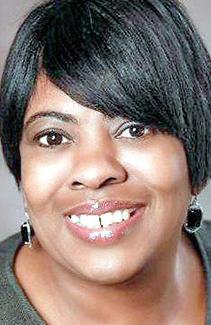
In the words of Dr. Britney Cooper, this “necropolitical” environment beckons us to weather a pandemic, police brutality and the unelected governor in Missouri, who closed the state too late and opened it too early. Now, in the midst of the COVID-19 crisis, the governor suggests, “If you don’t feel safe on election day you should stay home.”
While we still haven’t dismantled enough systems to keep us safe from state-sanctioned violence, we do still have the right to vote. This right was gained by bloody battles in the lynching fields. This battle was fought by the likes of my mother, the late Carrie Jefferson, who journeyed weekly, without license or public transportation, 47 miles from our hometown of Demopolis, Alabama to Selma to fight for the right to vote in the 1960s. This battle took countless lives and left her with a scar on her leg, a souvenir from Bloody Sunday on the Edmund Pettus Bridge.
It was a battle we won and a right we cherish.
Governor Michael Parson doesn’t get to decide if we vote. Yes, we want to be safe, and our ancestors already died so that we might live and vote. Our sacred memory tells us it is necessary to use what we have: our voices at the ballot box. It is a reminder that local elections matter. Elected mayors, commissioners, council people and governors get to appropriate budgets that enable corrupt and racist law enforcement officers to continue to peddle death on innocent and subdued black bodies.
An elected secretary of state like Jay Ashcroft of Missouri can make it safe to vote by instituting vote-by-mail policies. Governor Parson can also make it safe by signing SB 631 which allows certain people to vote by mail this year.
Put on a mask and honor the ancestors and practice your resistance and physical distancing by casting your ballot in person, if you were not able to do so absentee. Remind the unelected governor that you will remember to vote again on November 3 when we get to elect a governor.
Reverend Cassandra Gould is the executive director of Missouri Faith Voices, the Religious Affairs director of the NAACP Mo State Conference and the Faith co-chair of MO Jobs with Justice. She is an ordained elder in the A.M.E. Church.
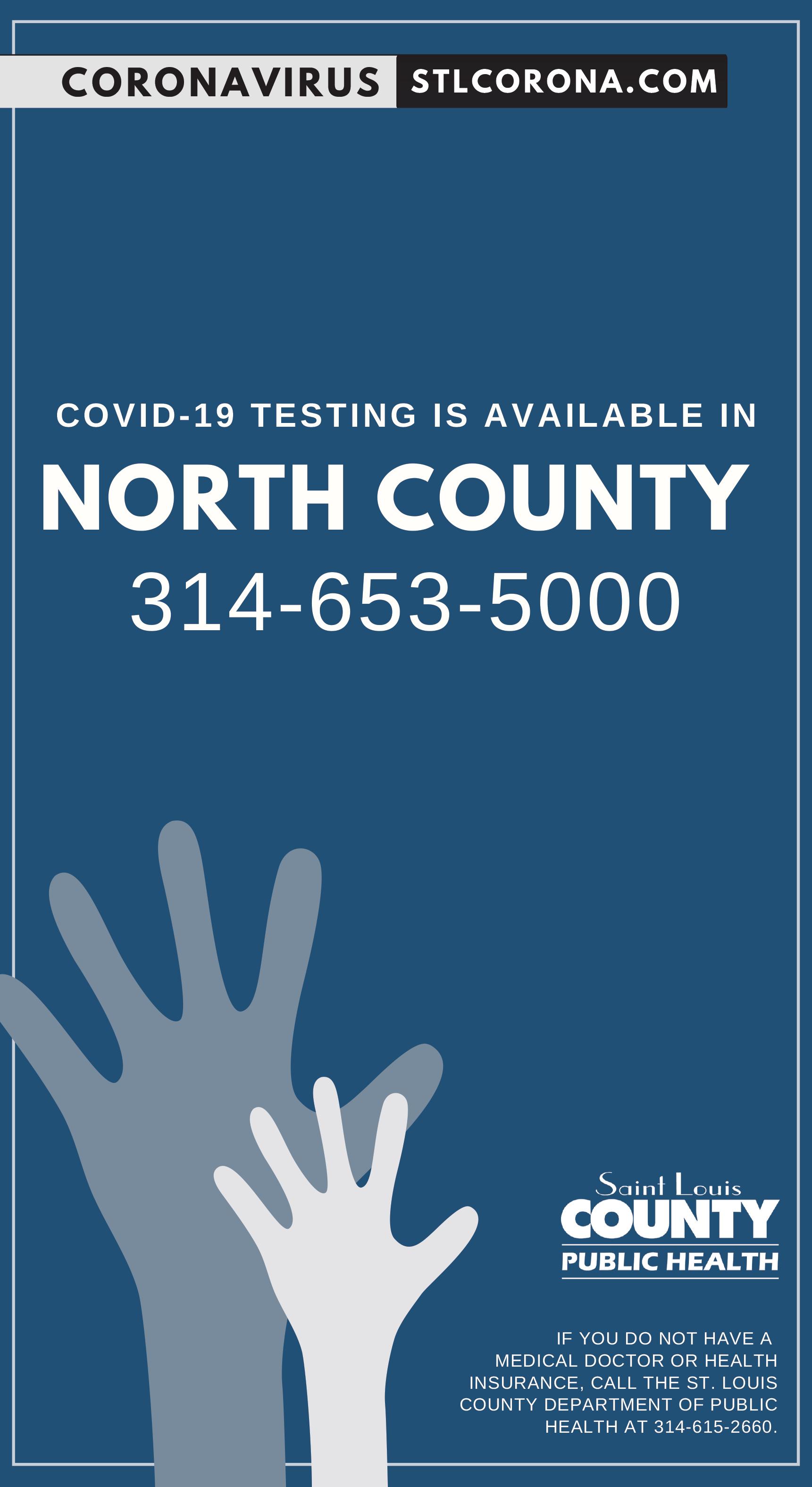
non-violent actions conclude.
also were mixed. The anger at the police boiled up and sometimes boiled over.
Many of the protests were organized by a collective called “Expect Us,” which includes Action St. Louis, Metropolitan Congregations United, Missouri Faith Voices, St. Louis Action Council, St. Louis Metropolitan Clergy Coalition and others.
New, young organizers also emerged. A young woman named Clara Holmes organized one of the first actions on May 28. She was moved to action by the senseless killing of Floyd and “all the families who lost a loved one due to police brutality,” including her own.
“I lost a nephew that was killed by the police after Mike Brown,” Holmes said. “We just want those people to stop killing us, especially on unnecessary crimes going on with the police brutality. Really, stop.”
A pattern familiar from Ferguson and Stockley verdict protests was repeated. Principled, organized, disruptive but non-violent actions would end in the evening. Younger activists then stayed in the street with a diverse mix of people whose motives
Continued from A1
Continued from A1 which she claimed culminated in his spitting at her.
“I’ve told this *story* before but always hid his name. Even when he reported from the streets of Baltimore where I protested,” she wrote. “I share it today not for karma, but because, as we rise up, I want it understood: We don’t ever have to relinquish our power to those who oppress us.”
Cunningham, a former St. Louis American intern, previously told the story on the
A young organizer who identified himself as Kenny tried to harness that anger on June 1 as night fell in downtown St. Louis.
“We need to plan, let’s not let this fizzle out,” Kenny said. “We are not prepared to face the police head-on. That’s the last thing we need. We need to stay cohesive to one plan.”
A young woman protestor who did not give her name joined Kenny at the makeshift podium. She spoke to both the diversity in the crowd and the awareness that some white protestors might present themselves as Black Lives Matter “allies” but have their own agenda.
“It’s a lot of white folks in the crowd,” the young woman said. “You’ve got to understand and respect your place in this war. Some of you think it’s Hunger Games. Do not come up in here trying to start your own struggle.”
There is sensitivity among the new, young organizers to be identified by name. A number of Ferguson protest leaders have lost their lives since 2014. Two St. Louis protestors, including the veteran Ferguson protestor Mike Avery, had just been charged
Amy Poehler’s Smart Girls website, where the boy who harassed her was referred to as “Privileged Pete.”
“On top of universal feelings of adolescent inadequacy, high school as one of four black girls in the whole class also meant traversing the jungles of teenage racism,” she wrote in 2017.
She wrote that Vittert, described as “Pete,” began to harass her after she co-founded the school’s first student diversity club. She said he thought “that talking about racism was racist.”
“Pete decided the best way to prove racism wasn’t real was
with crossing state lines to incite a riot after livestreaming their road trip to join protests in Minneapolis. Efforts to control the crowd’s anger – and to defuse those trying to start their own struggle or disrupt the movement from within – failed on June 1 in particular. There was widespread looting and arson. Four police officers were shot while working the protest; all have recovered. One retired black police captain, David Dorn, was killed while responding to a looting. “He was the type of brother that would’ve given his life to save them if he had to,” the Ethical Society of Police said of Dorn.
n “We don’t want anyone hiding behind our movement. Because once it’s hijacked, people will try to make the whole thing out to be invalid.”
“They have infiltrated our organizations, so they ought to know who is responsible,” Gray said outside St. Louis City Hall on Tuesday, June 2. Gray spoke with Bishop Elijah H. Hankerson III, president of the Clergy Coalition, and state Rep. Rasheen Aldridge (D-St. Louis), also a protest organizer. They shared a united message: there are organized, non-violent protests and disorganized acts of violence.
– Bishop Elijah H. Hankerson III
Dorn’s murder remains unsolved but St. Louis reported making 36 arrests between May 31 and June 1.
That next morning, the Rev. Darryl Gray, one of the Expect Us organizers and a longtime civil rights activist, said the police should be asked who is firing weapons and committing destruction at protests after the organized
to be more racist and harass me.” Cunningham wrote.
“When he’d catch me between classes, he’d walk up close behind me and repeatedly ask if his presence was oppressive, walking me all the way to my next class. You read that right: he was actively harassing me while asking me if he was oppressive.”
She wrote that he spit at her after she confronted him.
“I turned around and said ‘L — (Whoops! I mean…) Pete, you can’t keep doing this,’” she wrote. “Then, in one swift, instantaneous, racist reflex, he sucked in deep, gathered all his might, and hurled a giant wad
“There is a push for justice, and then there is a criminal element,” Hankerson said. “They are two different elements altogether. Others would like to hijack this movement, which is a valid movement. What happened to George Floyd — that was a murder. We don’t want anyone hiding behind our movement. Because once it’s hijacked, people will try to make the whole thing out to be invalid.”
Aldridge said he understands the pain and anger
of spit right at my face. It landed at my feet.” She was stunned into silence.
“The white, wealthy son of a school trustee and the black, scholarship daughter of a widow were no even match,” she wrote. “Even my 15-yearold self knew I’d lose that fight every time. Why put myself through the humiliation of speaking a truth no one wanted to hear?”
She wrote that a teacher and coach, Daniel Harris, convinced me to break her silence; “there was a terse, forced apology, and nothing more,” she wrote.
that could drive someone to violence and destruction against this system — but he does not condone it and knows of no one organizing or committing violent or destructive acts. Aldridge emphasized “the long haul,” the use of disruptive protests as a long-term strategy to force change in a system that has been extremely resistant to change.
The Expect Us coalition agreed to take Tuesday as a day for self-care. As they spoke, Mayor Lyda Krewson and police leadership were at police headquarters announcing a 9 p.m.-5 a.m. curfew for the city, though news had not yet reached them. When asked about the possibility of a curfew, Aldridge said, “A curfew would be like kettling people. People won’t abide by it. Then the police will pick and choose who to arrest. It will only make it worse.”
But on June 2, the curfew was largely obeyed. There were no confrontations with police or mass kettling arrests, as many feared. But the protests will continue, organizers said.
“When will it stop?”
Gray said. “When can I make that promise? When you can promise there
Harris now directs the school’s Office of Diversity, Equity & Inclusivity. School officials were asked to comment on Cunningham’s version of events.
“Brittany has been incredibly important to Burroughs both as a student and as an alum in helping to identify the ways that the educational experience for African-American students here -- and around the country – needs to be improved,” Head of School Andy Abbott responded.
will be no more killing of unarmed black people by the police. Don’t expect us to make a promise we can’t keep when you are making a promise that you can’t keep.”
As the young organizer Kenny addressed the young crowd on June 1 as night fell, before the chaos, “This is your movement. This is your power we must show. Because if we don’t do it now, they will never stop killing us.”
Meanwhile, the 9 p.m.-5 a.m. curfew remains in effect until further notice. The exceptions are people who are traveling directly to and from work or to their homes lawfully; city, state, and federal employees performing work assignments; news media with credentials; those traveling for medical treatment or assisting those traveling for medical treatment; and those who have no housing. Asked what directions the police had been given to determine who meets these exceptions and who is subject to arrest during the hours of curfew, a police spokesman said they would “be handled on a case-by-case basis.” Ashley Jones is a summer editorial intern supported by the Emma Bowen Foundation and the Democracy Fund.
“He tried to bury me. He did not know I was a seed,” she wrote. “They will try to bury you. Be a seed. I love y’all. Seize your love and power. It is your most precious resource. Let’s get free.”
One day and a few hours after she posted the thread, the tweet announcing the thread had been retweeted 8.1 thousand times and liked 40.2 thousand times.
“Over the years she has helped us develop the training that we now have for faculty, staff and students. Burroughs would not be the school you see today without her impact.” In her tweet thread, Cunningham focused on her transformation, not the past humiliation. Ultimately, her message was inspirational.

Continued from A1
its 2020 Lifetime Achiever in Health Care. She has been a patient advocate and ombudsman in St. Louis for more than 30 years. She believes her lifetime dedication to fighting for patients’ rights stems from the closure of Homer G. Phillips Hospital in 1979. Like many throughout St. Louis, Keeton believes that “a part of the black world in St. Louis died” when the teaching hospital closed — and her community has not been able to get equitable healthcare since.
“I think about that in terms of today when some patients go to the emergency room because they can’t take off their jobs,” Keeton said. “They don’t have insurance. How kind those people were to my father when he came to the emergency room,
Continued from A1
Americans and law enforcement following the Ferguson Police killing of unarmed teen Michael Brown.
Jones, an itinerant elder in the A.M.E. church, won with 52.59% of the vote over Robinett, who received 47.41%. Only 2,790 people cast a vote for mayor. The election was held during both a global pandemic and a new wave of police accountability protests, with Ferguson under both a state of emergency and an 8 p.m.-6 a.m. curfew declared by Knowles. The state of emergency and curfew both remain in effect.
The protests in Ferguson and cities throughout the nation were sparked by the police killing of another unarmed black man – George Floyd in Minneapolis – by white police officers.
Jones’ goal for Ferguson is for everyone to work together.
“In the midst of this COVID-19 pandemic, our restaurants, our businesses were closed, and now they were trying to open up and we have the protests, so it set a lot of businesses back. So, I am just reaching out to various partners to see how we can best help these businesses recover from the protests and open,” Jones told The American “We don’t want to lose any of our businesses, because
versus the comments I hear of patients going into the emergency room now. For me to see my people going into systems where people didn’t understand them, understand their plights, I guess that’s where it came from.”
Since then, Keeton has been fighting for the rights of patients who don’t have insurance.
“Healthcare to me is a human right,” Keeton said. “And quality healthcare should be a human right. As much as I can, I try to get them what they need.”
Her advocacy started while working healthcare jobs in the 1970s, when she took it upon herself to help patients understand their medical bills, even if it meant going to their houses on Saturdays.
“My job was to talk to these patients, get to know them, understand what their problems were and represent
they are the cornerstone of our community, and when we lose one, it just hurts all. My goal is to work, talk to anyone that will listen, to help stabilize these businesses in Ferguson.”
Jones, a chemist, previously worked in the Biochemistry Molecular Biophysics Department at Washington University School of Medicine, at KV Pharmaceutical Company, and as a sales director for Mary Kay cosmetics. She was elected to the City Council after Brown’s police killing in 2014. She was a member of the council that worked with the Department of Justice on a consent decree with the city based on the DOJ’s findings in its 2015 report on Ferguson’s police department and municipal court. The consent decree remains in effect. The latest hearing on its progress is scheduled for 2 p.m. Thursday, June 4. To listen, call (877) 336-1839 and enter Access Code 3539352. Asked what it means to be the first black woman mayor of Ferguson, Jones told St. Louis Public Radio, “That means I got work to do. Because when you’re the first African-American woman, they require more of you than they require of my counterparts. I know that the people of Ferguson are ready to stabilize their community. And we’re going to work together to get it done.”
New leadership in Berkeley and Pagedale
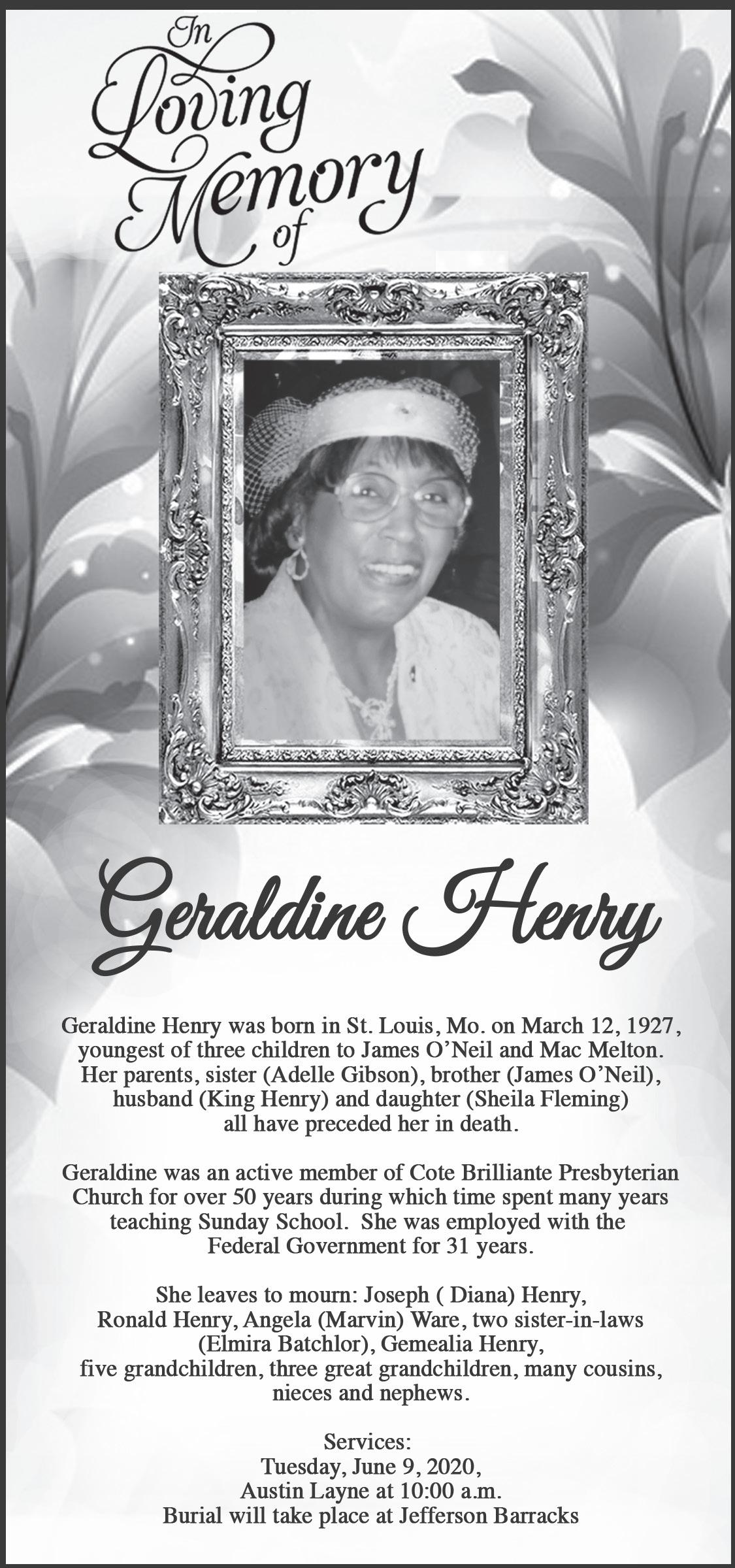
them if they had issues that they couldn’t resolve or didn’t have anybody to talk about,” Keeton said.
“And we found there were a lot of instances where a lot of people intentionally or unintentionally violated patient rights. Some people were amenable to changing – some people weren’t. Some departments and some organizations were amenable, and some weren’t. So it was our job to help the patient.”
n “Healthcare to me is a human right. And quality healthcare should be a human right.”
“That was the hardest thing to learn: what was the truth?” Keeton said. “As I grew in advocacy, I never forgot that you must look for the truth. And the truth will tell you what should actually be done. If there is an inequity, you’ll see it. The truth will tell you.”
– Rosetta Keeton
At one of those early jobs, at the now-demolished Truman Restorative Center on Arsenal Street in South St. Louis, Keeton said her mentor Jackie Jackson taught her that there are two sides to every story – and then there’s the truth.
In Berkeley, longtime Mayor Theodore “Ted” Hoskins was voted out of office and Babatunda Diembo was voted in, winning 41.7% of the vote to Hoskins’ 33.87%. Hoskins, a former
Keeton grew up in public housing projects in St. Louis, living with her hardworking father, stay-athome mother, two sisters and two brothers.
“We had a good, loving, wonderful family, so we were rich – more rich than some of these people who have lots of money,” Keeton said. “We were poor economically and … statistically I should not have been able to get past
state representative, faces felony charges for alleged voting irregularities. A third challenger, Barbara Jean Holmes, received 24.43% of the vote. In the Pagedale mayor’s race, Ernest “EG” Shields won with 38.71% of the vote.
high school, if I made it that far.” Keeton beat the educational odds, earning a master’s degree in health administration from Webster University and a bachelor’s degree in interdisciplinary sciences from Saint Louis University.
Among her community collaborations, she developed an abstinence-only education project for youth who learned visual arts, performing arts and music creation as an alternative to engaging in sexual activities. She worked with residents living in St. Louis ZIP codes at high risk for chronic diseases to increase health literacy and become active participants in their own health care. And she enlisted members of the Board of Aldermen to make the case for public health care needs in North St. Louis. She also is the founder and facilitator of Sistah Connection, one of the
Challengers Minnie Rhymes received 28.39%; Darline Crawley, 26.45%; and Tenell Cothrine, 6.45%. Shields is a pastor at Mt. Beulah MB Church in St. Louis. Pagedale Mayor Mary Louise Carter did not seek reelection.
oldest local breast cancer support groups. She was a 2012 St. Louis American Salute to Excellence in Health Care award winner and, more recently, served as the keynote speaker at the Homer G. Phillips Nurses Alumni, Inc. annual meeting. Rikki Takeyama Menn, the Regional Health Comission’s vice president of strategic engagement, said, “As Ms. Keeton plans to retire in 2020, we want to recognize the many years she’s advocated for her community, empowered thousands of patients, and provided a voice for the sick.”
The 20th Annual Salute to Excellence in Health Care Awards will be celebrated online as a free virtual event on Thursday, July 9. For additional details on how to participate, please visit www. stlamerican.com.
– at 15.71% according to unofficial election results.
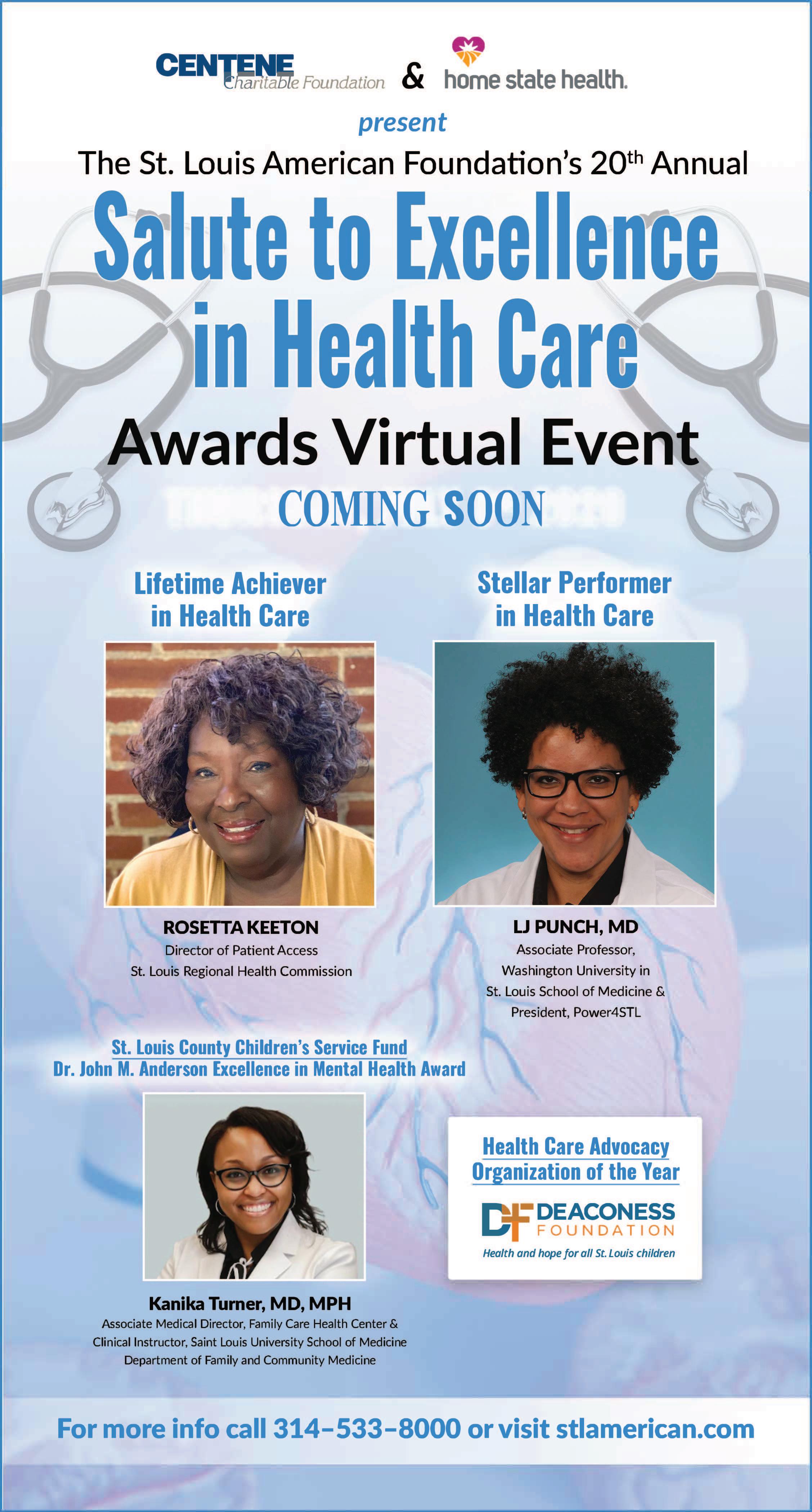
On Saturday, May 30, at noon, the Urban League of Metropolitan St. Louis, Inc. hosted the area’s most extensive food distribution to 3,500 families in need throughout North St. Louis County. The giveaway was the 9th weekly distribution that the Urban League has held to help residents ravaged with unemployment, poverty, and uncertainty during the COVID-19 Crisis. Since April 2, the Urban League has distributed more than $1 million in food, toiletries, and personal protective equipment to over 23,000 families.
At the kickoff to the Food & Toiletries Giveaway, U.S. Representative Lacy Clay held a press briefing to demand justice in the killing of George Floyd at the hands of Minneapolis Police officers. Following Clay’s pronouncement, Harris-Stowe State University President Dr. Corey S. Bradford announced that HSSU would donate $7,000 to the Urban League’s Food and Toiletries Giveaway to address food insecurity and healthcare support during the COVID-19 pandemic. These funds were gifted, courtesy of the American Honda Motor Company.
At last Saturday’s event, more than $150,000 in items were distributed to families in need courtesy of nearly 50 sponsors. For more information about the Urban League, please contact (314) 615-3668 or ulstl.com.
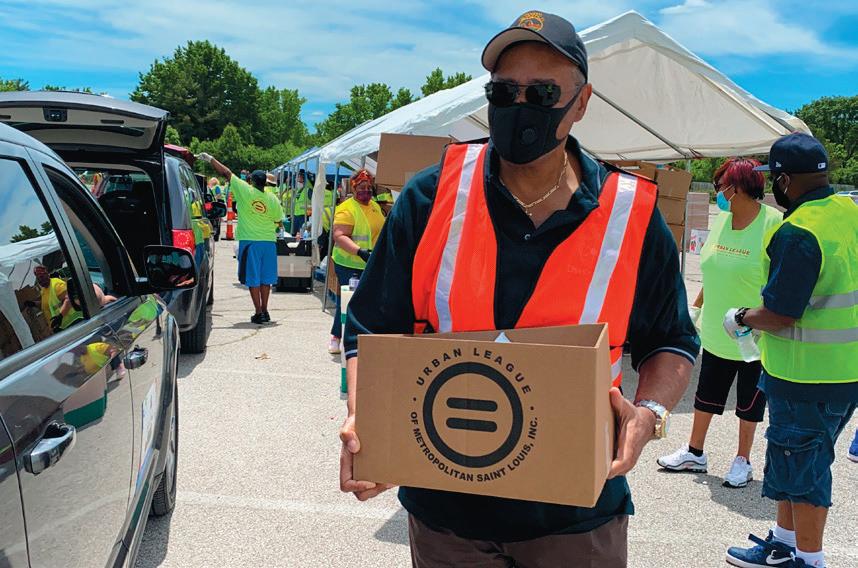
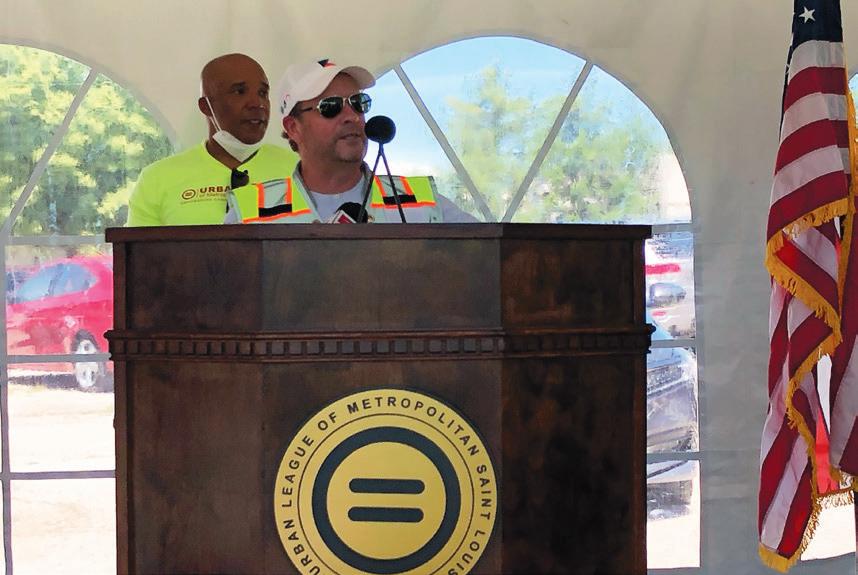
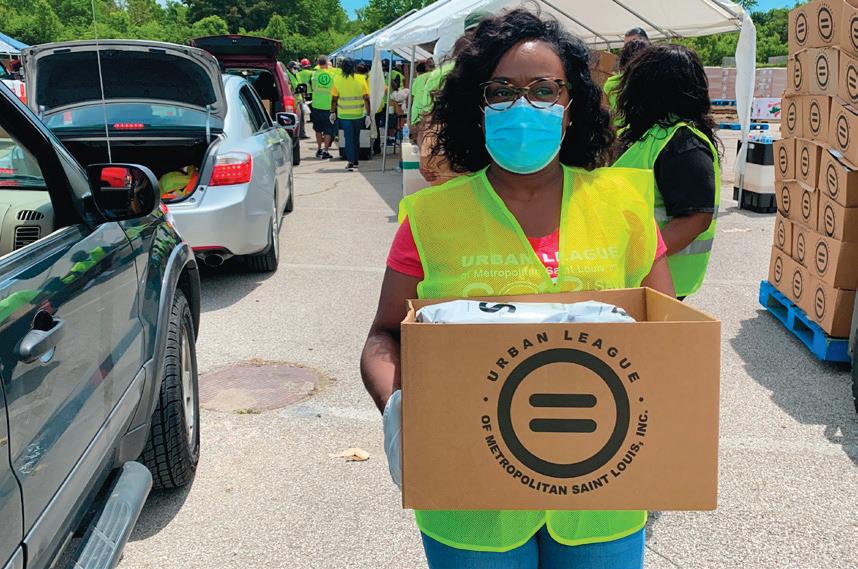
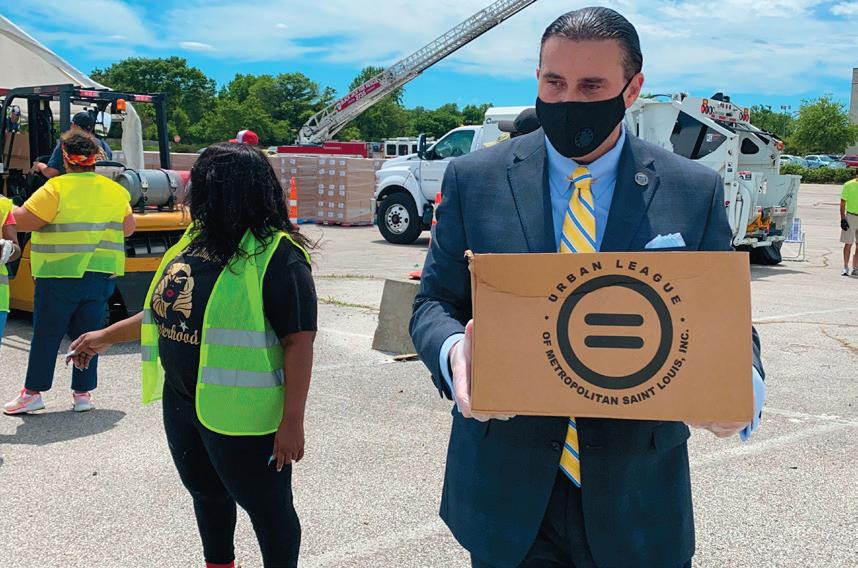
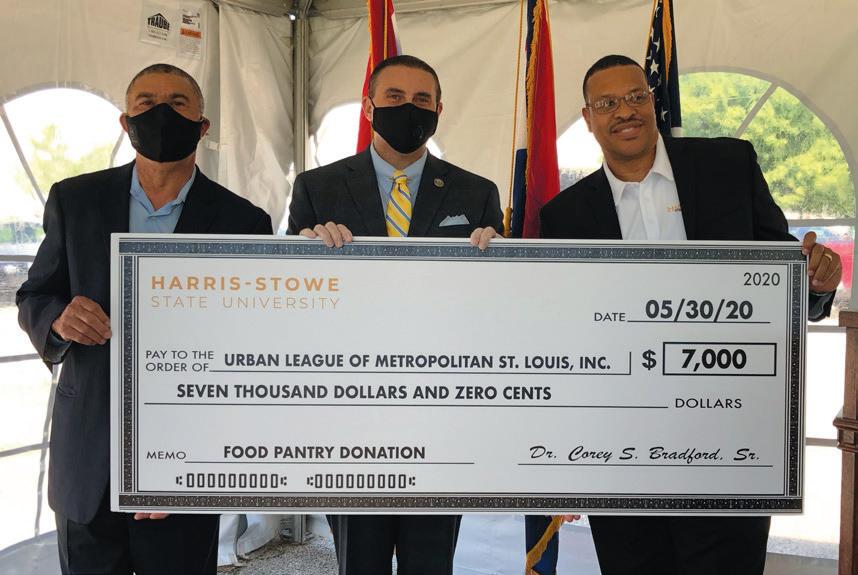
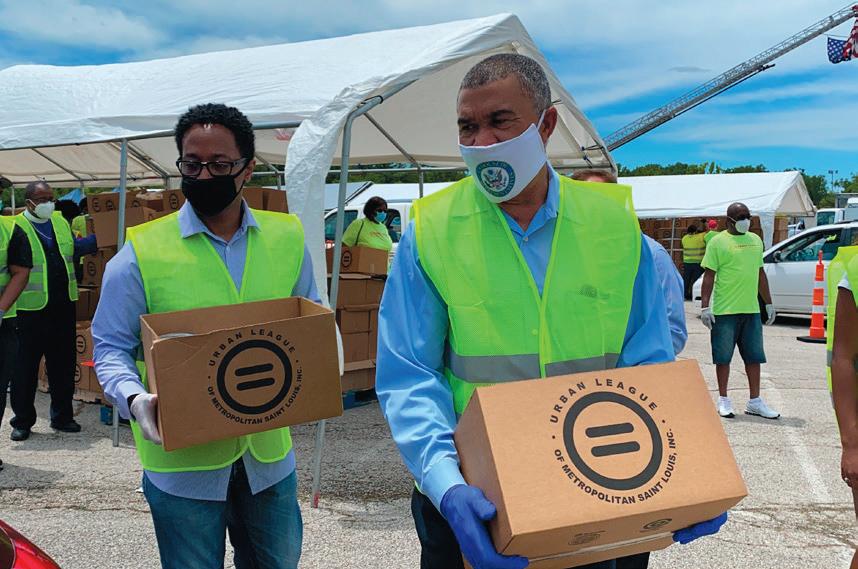
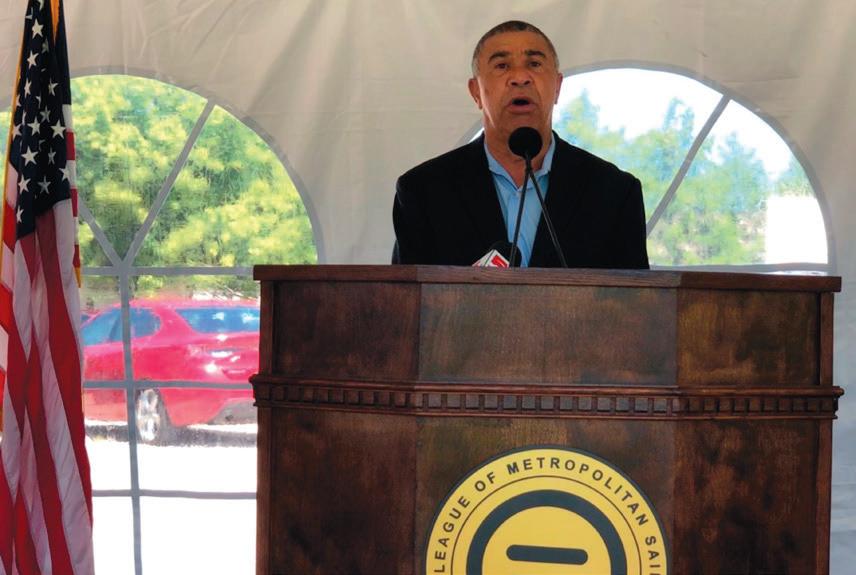
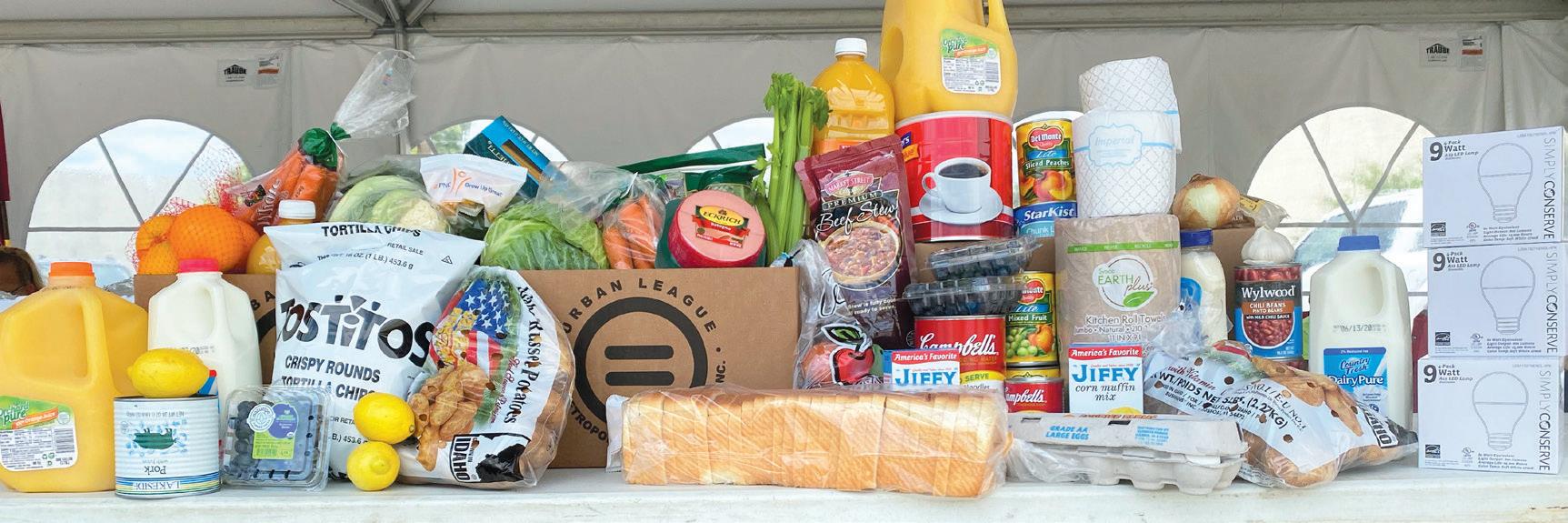
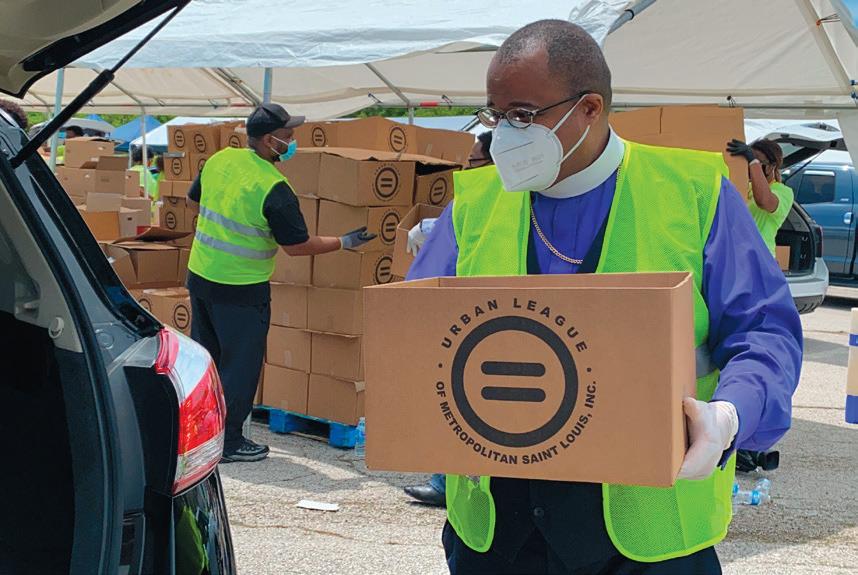
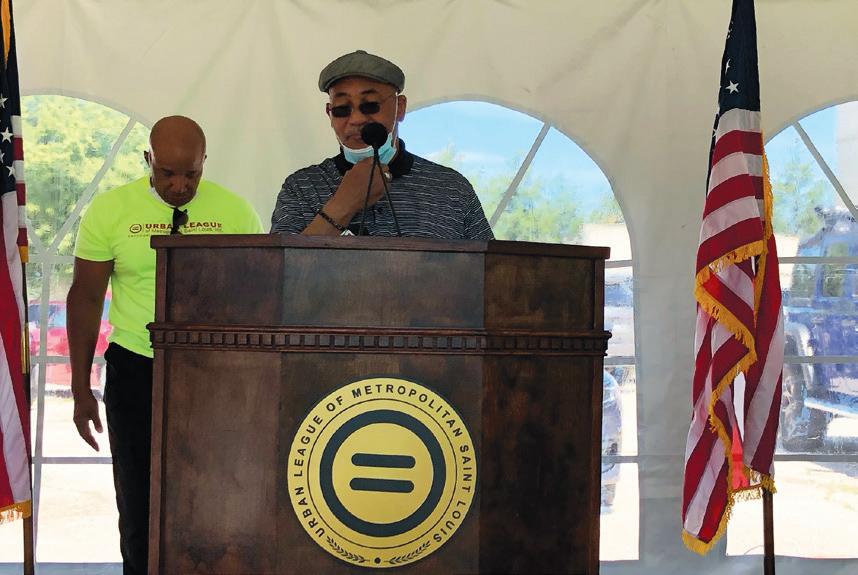

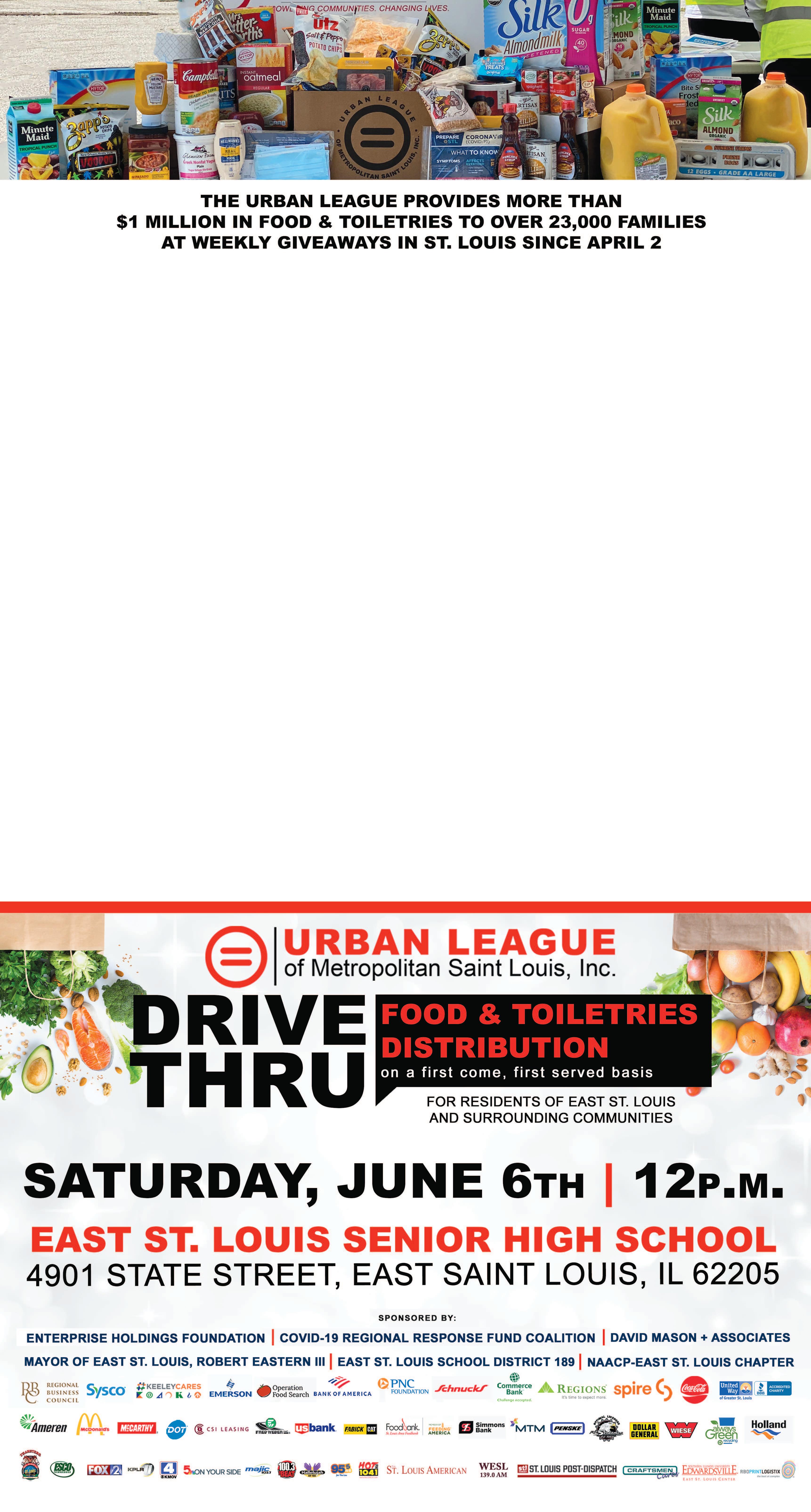
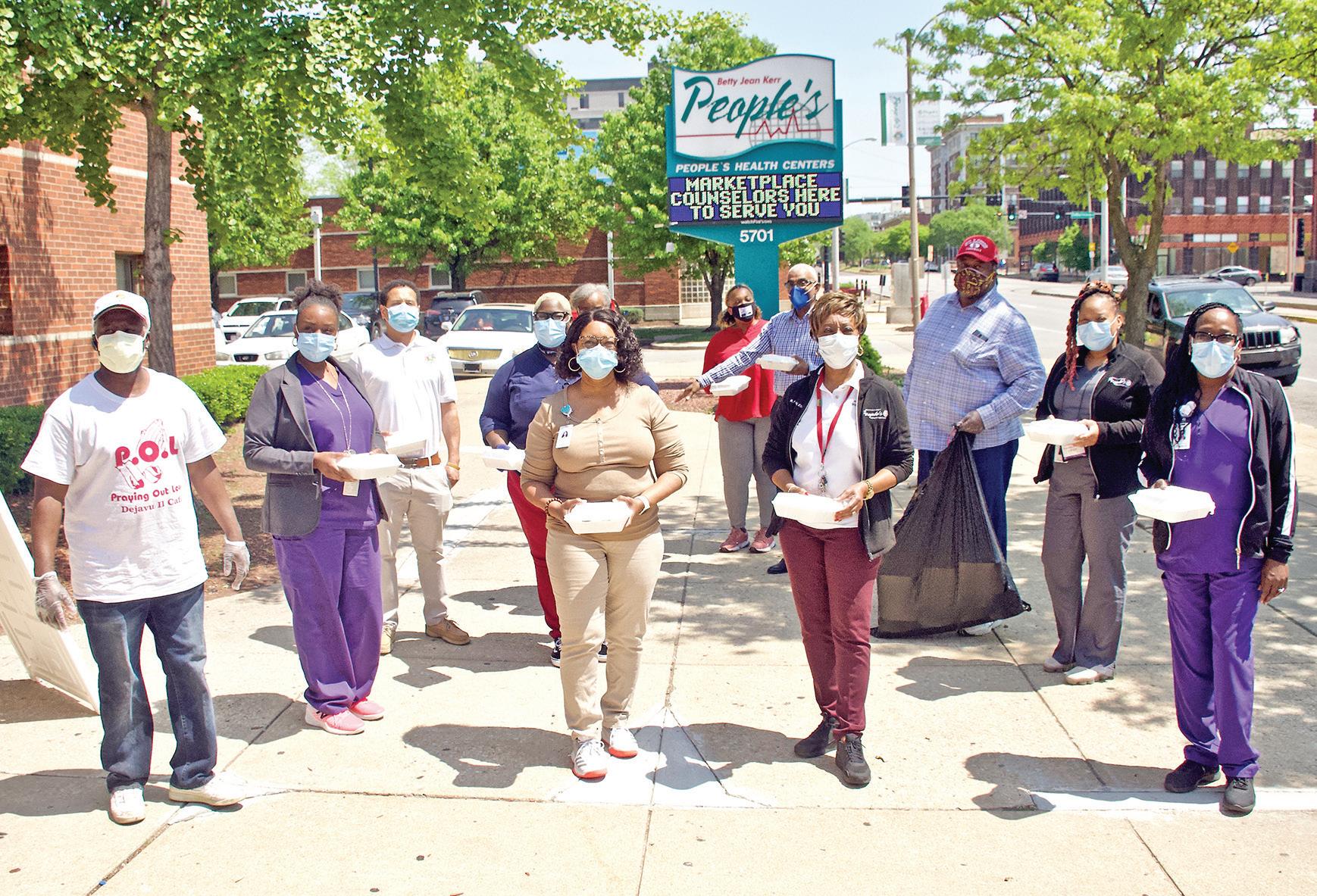
Gerald “Pee Wee” Johnson, left, owner of Dejavu II Café, donated lunch to the staff of Betty Jean Kerr People’s Health Centers at its Delmar location with the help of volunteers from the Coalition of Black Trade Unionists on April 28.
Café II
By Carrie Zhang
For The St. Louis American
Dejavu Café II and the Coalition of Black Trade Unionists (CBTU) have paired up during the COVID-19 pandemic to prepare and deliver free meals to frontline and essential workers.
Gerald Johnson, owner of Dejavu Café II, who is known as Pee Wee, kept his restaurant open for carryout after the shelter-in-place public-health order went into effect on March 23. He reached out to Lew Moye, president emeritus of the St. Louis CBTU Chapter, because he wanted to help his community.
Johnson knew Moye because Moye teaches a dance class at the club next door to Dejavu Café
n “Wherever we delivered those meals, the workers were very, very pleased and very, very happy that someone thought about them.”
– Lew Moye, CBTU
II, which is located at 2805 Target Dr., near the corner of I-270 and Old Halls Ferry Road.
Since the restaurant is located in North St. Louis County, Moye and Johnson decided to target locations in North County, starting with
We must tackle the real plague
Inequality and disparity were here long before COVID-19
By Orvin T. Kimbrough
For The St. Louis American
I am always shocked when I hear leaders suggest that the COVID19 crises somehow brought to the forefront disparities in our region and beyond. Each time there is a crisis, we have conditioned ourselves to use this same language. Let’s be clear: while disparity operates in full sunlight right now, it has always been there for those who have chosen to see it. The truth is some of us have the ability to insulate ourselves from the economic and social realities that many face on a regular basis. My greatest fear is that in our eagerness to get back to normal, in our rush to return to business as usual, disparity will fade back into the shadows. We cannot let that happen.
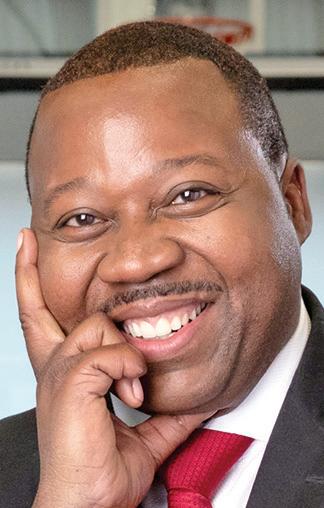
We must use this time to create a new normal. We must look at the systems, policies and attitudes that existed long before COVID-19. We must tackle the real plague that has eroded our communities for generations and has created stark inequality in healthcare, education and opportunity. I don’t know if the people who sit atop our region’s agenda for progress are listening – but the only way our region will grow is through a legitimate commitment to shared prosperity.
Recently, I have been invited to engage in dialogue locally and nationally around the impact of COVID-19 on diverse communities with specific emphasis on why minority businesses often suffer more in crises, why it’s difficult for these businesses to secure loans, and why it’s important See COVID-19, A10
Christian Hospital and the MetroBus North County Transit Center. Johnson also said that “the numbers coming out of North County were high so I wanted to help them first.”
Dejavu Café II is located in the 63136 ZIP code, one of the county’s COVID-19 hot spots with 373 cases, a rate of 857.1 cases per 100,000 people. By comparison, the 63124 ZIP code, which includes most of Ladue, has reported 28 COVID-19 cases, a rate of 258.6 cases per 100,000 people. That means someone who lives in a neighborhood near the restaurant is more than three times more likely to contract COVID19 than someone who lives in Ladue, though they
See DEJAVU, A10

Ameren Illinois customers who are having difficulty paying their utility bill are encouraged to apply for funding assistance through the Low-Income Home Energy Assistance Program (LIHEAP). Administered by the Illinois Department of Commerce and Economic Opportunity, LIHEAP is a federal program that provides utility bill assistance to those individuals who meet the income guidelines. Additional funding for the program has been provided under the federal CARES Act passed by Congress to address the economic hardships caused by the COVID-19 pandemic.
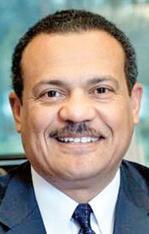
“We know some of our customers are experiencing economic hardship as a result of the COVID19 pandemic,” said Richard Mark, chairman and president of Ameren Illinois.
“Individuals who would normally not meet LIHEAP’s income qualifications may now be eligible to receive one-time bill assistance due to a change in income. Ameren Illinois customers who are experiencing difficulties paying their bill should act as soon as possible to take advantage of this funding.” Applications are being accepted through June 30, with funds available on a first-come, firstserved basis. For more information, including an application, visit IllinoisLIHEAP.com or call 877-411-9276. For residential customers who do not qualify for the LIHEAP funds, or business customers in need of assistance, Ameren Illinois is offering several payment options. Visit AmerenIllinois. com or call 800-755-5000 for more information.
St. Louis Treasurer Tishaura O. Jones, who resumed parking enforcement at curbs on June 1, will be waive all late penalties for those who pay off tickets—no matter how old— by August 31. Due to the pandemic, the office suspended ticketing and collections on March 16.
“The shut-down allowed us to migrate to a new system, which will offer new features such as the ability to set up payment plans on outstanding balances, and contesting tickets online,” said Jones. “If you need additional help, we offer free 1-on-1 financial counseling and classes at the Office of Financial Empowerment.” Payments will only be accepted online or in-person. To learn more, visit ParkLouie.com.
By Leslie Gill For The St. Louis American
Right now, we are all in a state of confusion and uncertainty. Some are working to balance new responsibilities, as schools have closed and our kids have become our coworkers. Many are reeling from the unexpected financial strain from furloughs and layoffs. With the situation changing by the hour, its normal to feel lost and wondering what is going to come next. We are right there with you. We also know that you are resilient, and that you have incredible power within you to weather this storm and come out stronger.
If you are ready to begin envisioning your life postCOVID-19, here are some actions that you can take right now so that you have a running start once this difficult period has passed.
Continued from A9
to invest in black and brown businesses.
Backing up a little bit, you have to see the bigger picture and look at some of the reasons why. There are reasons why black and brown people are suffering disproportionally from the disease. There are reasons why access to capital is denied disproportionally in black and brown communities. There are reasons why, and they have nothing to do with the current pandemic.
Majority-black ZIP codes in the St. Louis region have three times the rate of infections and nearly six times the rate of deaths as majority-white ZIP codes. Some cite underlying health conditions and use terms like “co-morbidity,” which is just a fancy way of saying
Health and self-care
Pick one or two habits to build during quarantine that will help your life now and later. For example, teach your kids to wash dishes or make folding laundry part of their daily routine. Try to train your pet to break that annoying habit. Start stretching every morning. Pick something that gives you a sense of daily control, doesn’t feel overwhelming, and will help life go more smoothly in the future. Think of it as a gift to your current and future self.
Start a daily COVID19 journal (great for kids, too). Spend 15 minutes each day writing about how things are going for you during this strange time. Expressing feelings daily can help our brains make sense of a world that seems to be constantly changing. It can also be a great place to write down ideas for the future, when the current crisis
that black and brown patients have more than one underlying health problem – maybe diabetes, maybe high blood pressure, maybe a respiratory ailment. These are not personal failures. Health care experts will tell you that these medical issues are due to systemic issues with economic insecurity, lack of access to preventative and mental health care, lack of access to good nutrition, lack of access to safe housing. Whether it is in multigenerational households or in our urban core, people are living in cramped quarters. So, when I am asked, “Why is it difficult for black and brown businesses during a crisis?” my answer is not intended to be dismissive, but to reflect reality. It is difficult for minority businesses when things are normal! The playing field is still not equal, and we the people still have not grasped the concept of leverage. Business
passes, and things evolve into the next new normal. Move for 10 minutes a day in your home or backyard. Pick one cardio move such as jumping jacks or running in place or stepping or jumping side to side, and do it for 40 seconds on and 20 seconds off, 10 times. Be sure to warm up before and stretch as well. Then when COVID is behind us, you know that you can exercise briefly at home when you are busy. This small change will burn calories, condition your heart, and reduce stress.
with loved ones, once COVID is over, we can use the video capabilities and these strengthened relationships to bring us smiles in future days.
Career growth
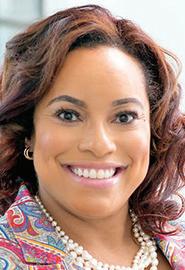
Leslie Gill
Take the time now to connect with family and friends. Use FaceTime or video chats to reach out to people who you have wanted to connect on a deeper level and maybe haven’t had the time. Not only will this added downtime help us all reconnect
and economic development in marginalized communities don’t have the same access to deal flow and focus on uplift of local or indigenous institutions. We generally import people who don’t live in those neighborhoods to take advantage of these newfound opportunities. And, while I am on this point, because we have historically underinvested in these communities, these business owners who reside there don’t have the capacity to keep up even if they get that access. Access to reasonable debt—not predatory loans—is directly tied to one’s ability to earn and pay off the debt. Balance-sheet strength is ultimately about one’s net
Get Clear. Take the time now to research companies and jobs that you would love and that you feel qualified for. Knowing what you are looking for is important for the next step. No one can refer you if you can’t tell them what you’re looking for.
Talk to
People. Reach out to people who you’ve already built trust with and share the type of work or positions you are looking for and ask them if they know anyone you should talk to or that they can introduce you to that can help in your job hunt.
n We must tackle the real plague that has eroded our communities for generations and has created stark inequality in healthcare, education and opportunity.
worth and ability to withstand really tough economic times. But there is another reason why. People often have potential leverage that they don’t exercise because they are focused on what’s in their best interest in the moment. They rarely focus on how their decisions impact others or the community. For the St. Louis region to grow, as we did a generation ago, we have to embrace an inclusive vision on the other side of COVID-19.
Left to momentum, left to business as usual, the folks who have been historically marginalized will only fall further behind. This this does not bode well for any one of us or for our broader economic
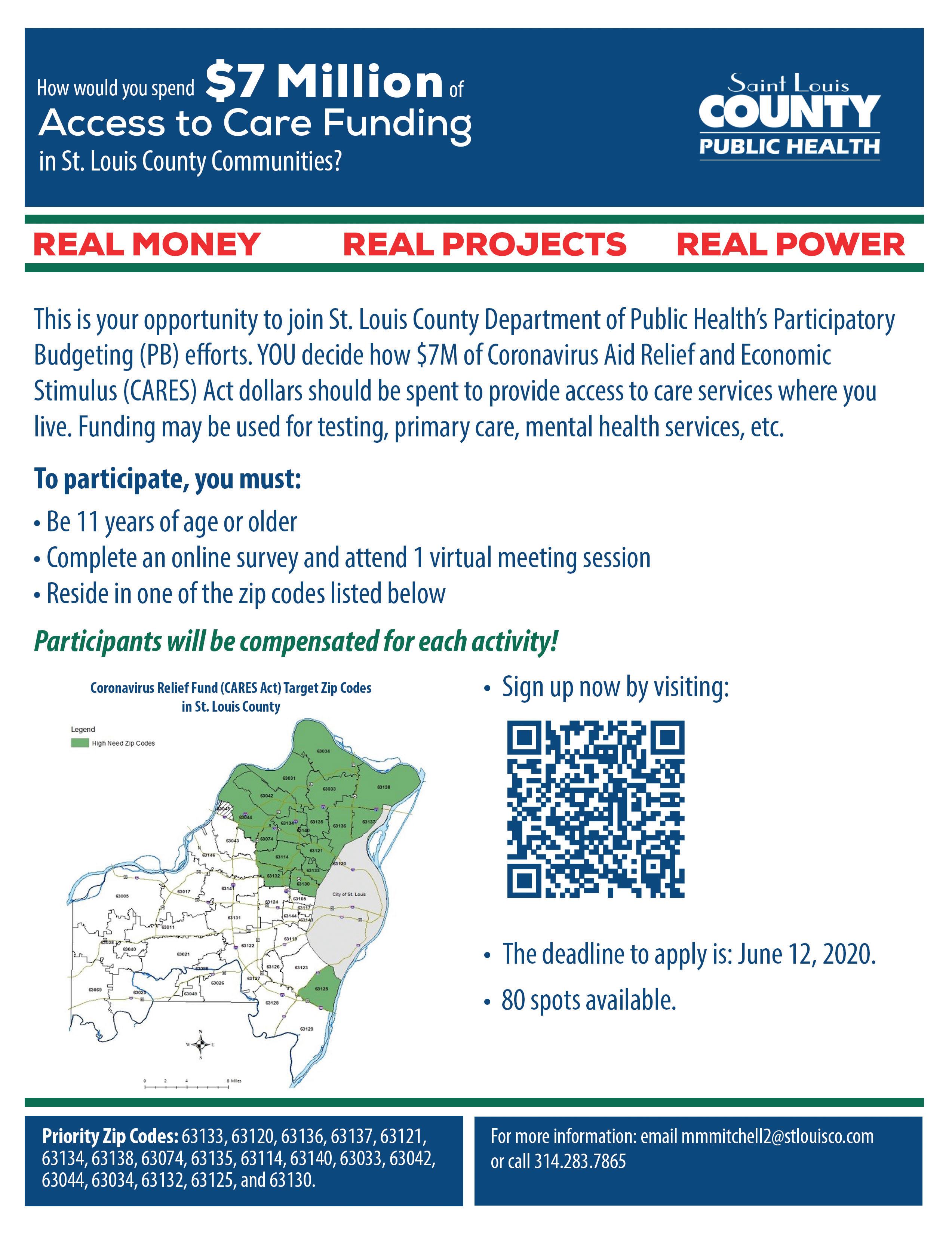

Update your LinkedIn page. It may have been a while since you have had a chance to work on your LinkedIn profile. According to one survey, 93% of recruiters use LinkedIn to find qualified candidates. Take some time to refresh your page now. You can find some good tips here. And while you are at it, leave a few endorsements for people in your network. It’s a good time to spread some positivity and appreciation.
Finances
Communication is key. If you feel you may be late on a bill, call your creditor. If you can only partially pay rent, call your landlord. There are many programs funded in light of COVID-19, and may are not available unless you ask. Start by paying your obligations, first. What bills
outlook. When you compare the economic outlook of the St. Louis region to more progressive parts of our country that have embraced a shared vision, a vision that includes economic progress for more of its citizens, we are projected to fall further and further behind in creating new, good-paying jobs and economic prosperity.
I am an optimist. My deepest hope is that we wage an all-out battle for a healthy Main Street: that we invest locally, that we bank locally, that we shop and dine and recreate locally. Let’s use this current COVID 19 crisis as a clarion call to double down on investments for businesses that continue to draw the short end of the stick.
During this incredibly difficult time for so many, Midwest BankCentre has stood with black and brown and other marginalized com-
Continued from A9
are separated by less than 15 miles.
On April 11, Dejavu
Café II and CBTU delivered 40 dinners to the Christian Hospital emergency department and 20 dinners to the MetroBus North County Transit Center.
Moye said that the nurses and doctors at the hospital were especially busy because of the high rate of death in the county. Though St. Louis County is not reporting death rates by ZIP code, as of May 28, 154 of the 395 who had died from COVID-19 in the county were black. That’s 39.0% of the victims when blacks form only 24.9% of the county’s population.
One of those early victims was a MetroBus driver, and more than a dozen Metro staff have tested positive for the virus. When Moye heard the news, he and Johnson contacted the North County Transit Center. Since April 11, they have been delivering 20 to 40 meals each week to the center. On April 28, they delivered 360 lunches to them.
As of May 28, Bi-State
Development, which operates MetroBus, had lost two staff to the COVID-19 pandemic, according to a spokesperson. In addition, it had 34 positive cases of COVID-19. At that time, it had 146 COVIDrelated absences, which includes mandated quarantines, self-quarantines, and individuals who need to care for children or for an individual who has COVID-19. Johnson and CBTU have expanded to feed other essential and frontline workers. They gave 70 meals to Schnucks Grandview Grocery Store on April 17 and followed with another 80 dinners on May 2. Other businesses that have received their dinners include Betty Jean Kerr People’s Health Centers and John Cochran Veterans Hospital in the City of St. Louis and the Jennings Post Office.
“How we determine the number of meals is based on what people tell us,” said Moye, who coordinates each delivery. Whatever number they ask for, Johnson and his workers at Dejavu Café II deliver.
“He has such a big heart,” Moye said of Johnson. “He’s been doing whatever count

report to your credit report? What bills can you not live without? These are first priority. Many creditors are able to defer 2-3 months payments, so call and ask.
With additional time home, talk with your family about your finances and spending plan. Many of us have high aspirations for our budget. However, things fall apart when it comes to fruition. Many times, this is because our family wasn’t part of the conversation. Remember – a 10-year-old understands more than we give them credit for. A joint goal is more powerful than a singular one.
Leslie Gill is executive director of Rung for Women. This article was written with Rung for Women staff and co-designers, The Fit and Food Connection, Family Care Health Centers, Prosperity Connection and Rodney Mueller, executive coach.
munities. In recent weeks, our team has processed nearly $200 million in government-backed small-business loans to businesses that serve our region. These loans are tied to nearly 20,000 workers. We are really proud of the fact that 85% of those loans have gone to companies with 25 or fewer employees, which directly correlates with the size of most black businesses and underscores our commitment to serve our neighbors. Let’s all invest in our communities. It is our best chance to tackle the real plagues that have been impacting our marginalized communities. Beyond that, it is our best hope to thrive economically and culturally as a region and have our kids want to live in this place that we love.
Orvin T. Kimbrough is chairman and CEO of Midwest BankCentre.
I’ve given.”
Several years ago, Johnson suffered a severe heart attack and flatlined for 15 minutes until the paramedics were able to revive him.
“When we deliver these dinners, he says, ‘I have a new heart,’ after what happened to him,” Moye said. “He has a new heart, and he wants to give back, and he wants to support people that have supported him and his business over the years.” Johnson said that experience did change him.
“Having that heart attack, I had a different look on life, different look on everything,” Johnson said. “I was blessed to still be here. And I don’t know if this is what God gave me back to do, to start blessing people like I was blessed.”
After Johnson started delivering meals, he noticed that others in his community started following his lead. He said, “I’m hoping I set a good example.”
Johnson has not solicited outside donations to fund these meals. He and one other member of his staff cook all the meals and work with CBTU volunteers to deliver them, but the donated meals come from the profits he makes from carryout orders.
“I don’t ask anyone for donations, but people like what I’m doing,” said Johnson. “So, they’ll send me 10, 15, or 20 dollars.” Whatever donations he receives go towards the free meals.
“Wherever we delivered those meals, the workers were very, very pleased and very, very happy that someone thought about them,” Moye said, “and that’s what they all say, whether they were nurses or doctors or grocery workers.”
When asked what his favorite part was about the deliveries, Johnson said, “It’s seeing the smiles. It’s seeing the joy on their faces.” Carrie Zhang is doing her May Project as a graduating senior at John Burroughs School with The St. Louis American.

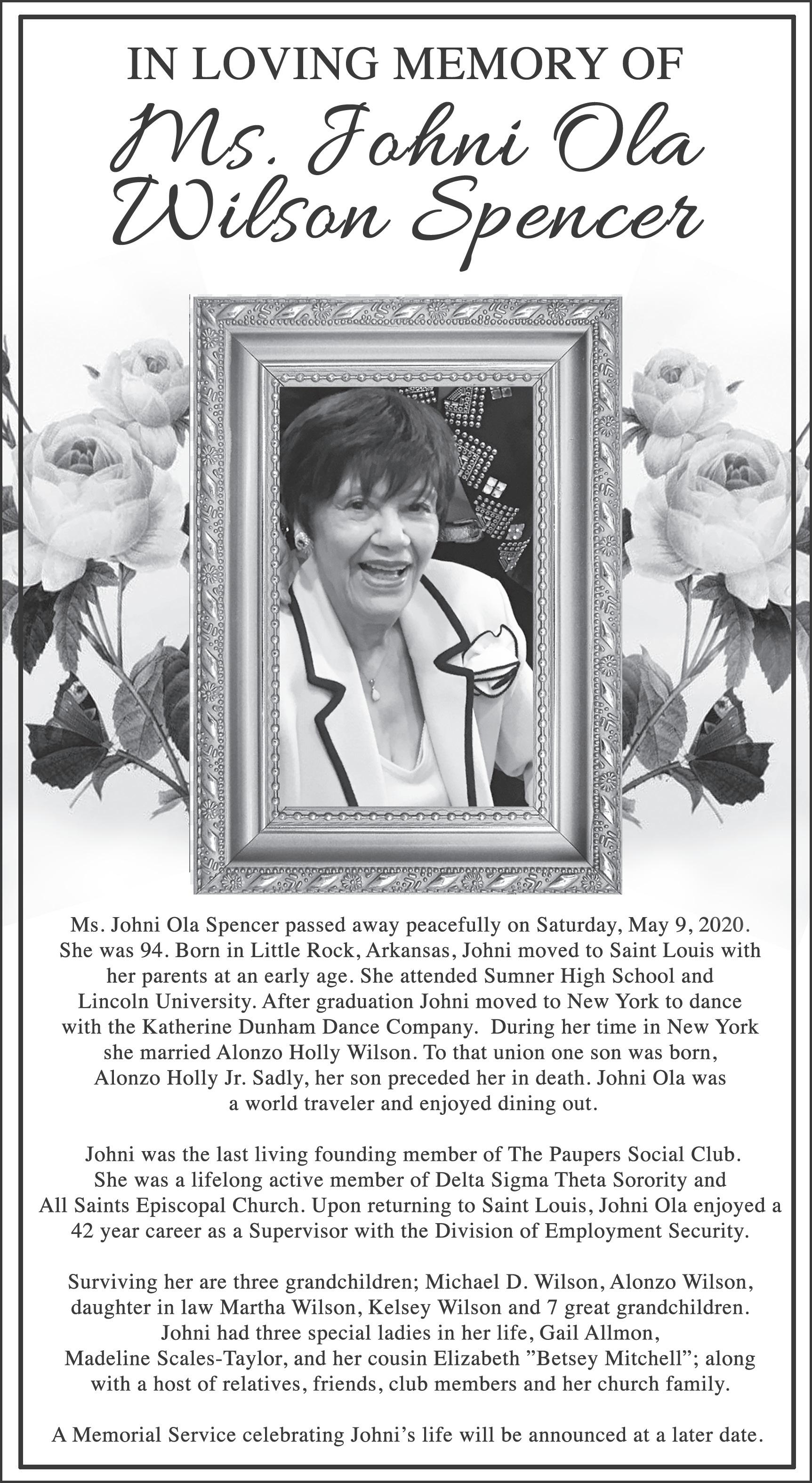
‘Beyond the grave, we will never forget,’ says Father Joseph Brown
By Ashley Jones For The St. Louis American
The Southern Illinois AIDS Coalition and the Tri-State Alliance co-sponsored the 37th annual International AIDS Candlelight Vigil online on Sunday, May 17. The International AIDS Candlelight Memorial is an annual event that commemorates the lives lost to AIDS.
“Beyond the grave, we will never forget,” Father Joseph Brown, professor of Africana Studies at Southern Illinois University Carbondale, said. “We turn to one another across vast differences. We hear one another in the silence.”
The memorial is an opportunity to honor those who dedicated their lives to helping people living with and affected by HIV and continue to mobilize our communities in solidarity.
“We would not allow sex and love to recoil during this epidemic,” regional trans activist Lagina Crim said.
The Global Network of People living with HIV (GNP+) started the International AIDS Candlelight Memorial in 1983. Since then, thousands of events have been organized across the world, such as motorbike rallies by women living with HIV and uplifting ceremonies in places of worship and workplaces.
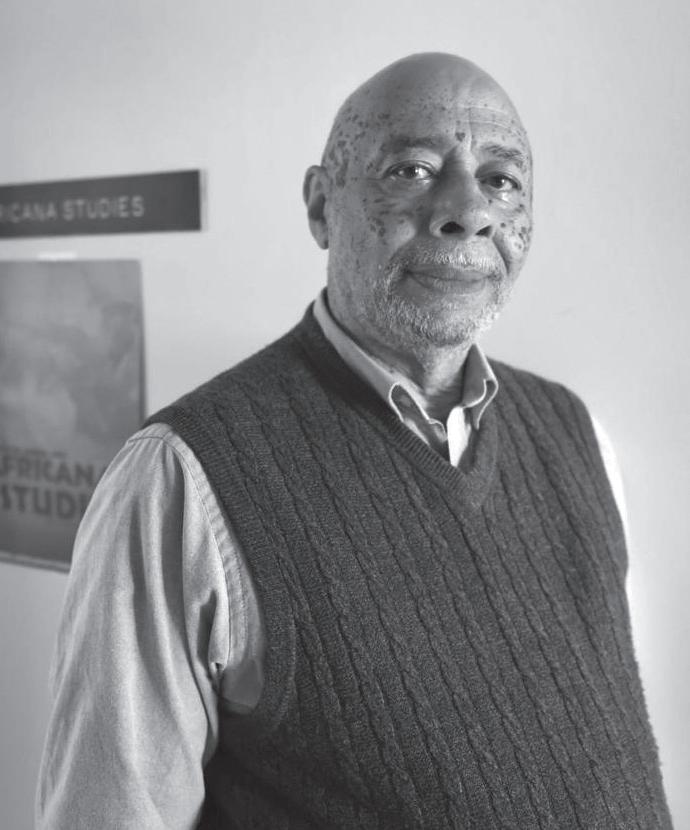
“Beyond the grave, we will never forget,” Father Joseph Brown, professor of Africana Studies at Southern Illinois University Carbondale, said. “We turn to one another across vast differences. We hear one another in the silence.”
“The International AIDS Candlelight Memorial serves as a community mobilization campaign to raise social consciousness about HIV and AIDS,” GNP+ stated.
“With almost 38 million people living with HIV today, the International AIDS Candlelight Memorial serves as an important intervention for global solidarity, breaking down barriers of stigma and discrimination, and giving hope to new generation.” The service can be viewed online at tinyurl.com/ AIDSCandlelight2020 or on the Facebook page of the Tri-State Alliance. Participants volunteered from throughout the TriState to make the video. For more information, visit www. TSAGL.org.
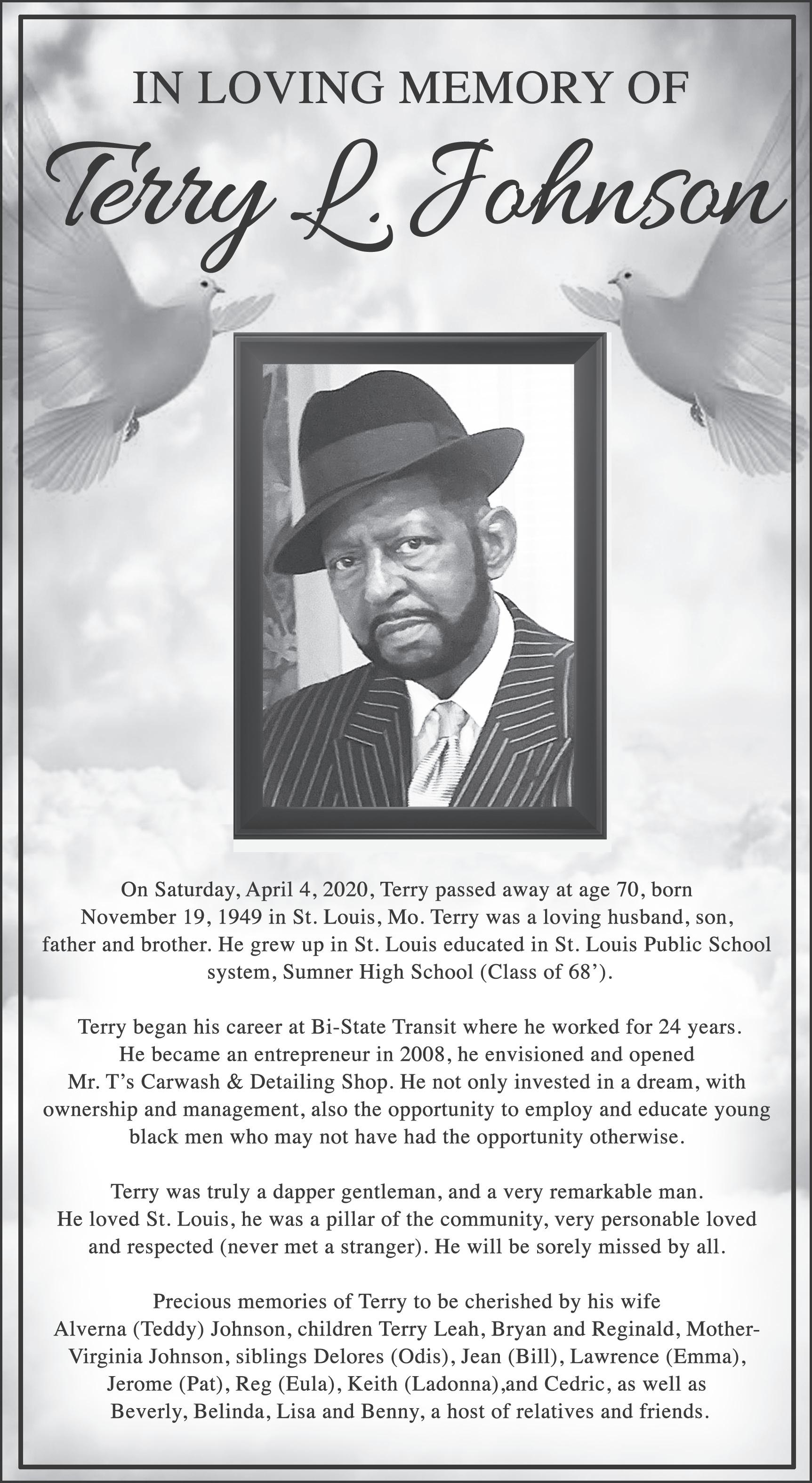

“TakingCareofYou”
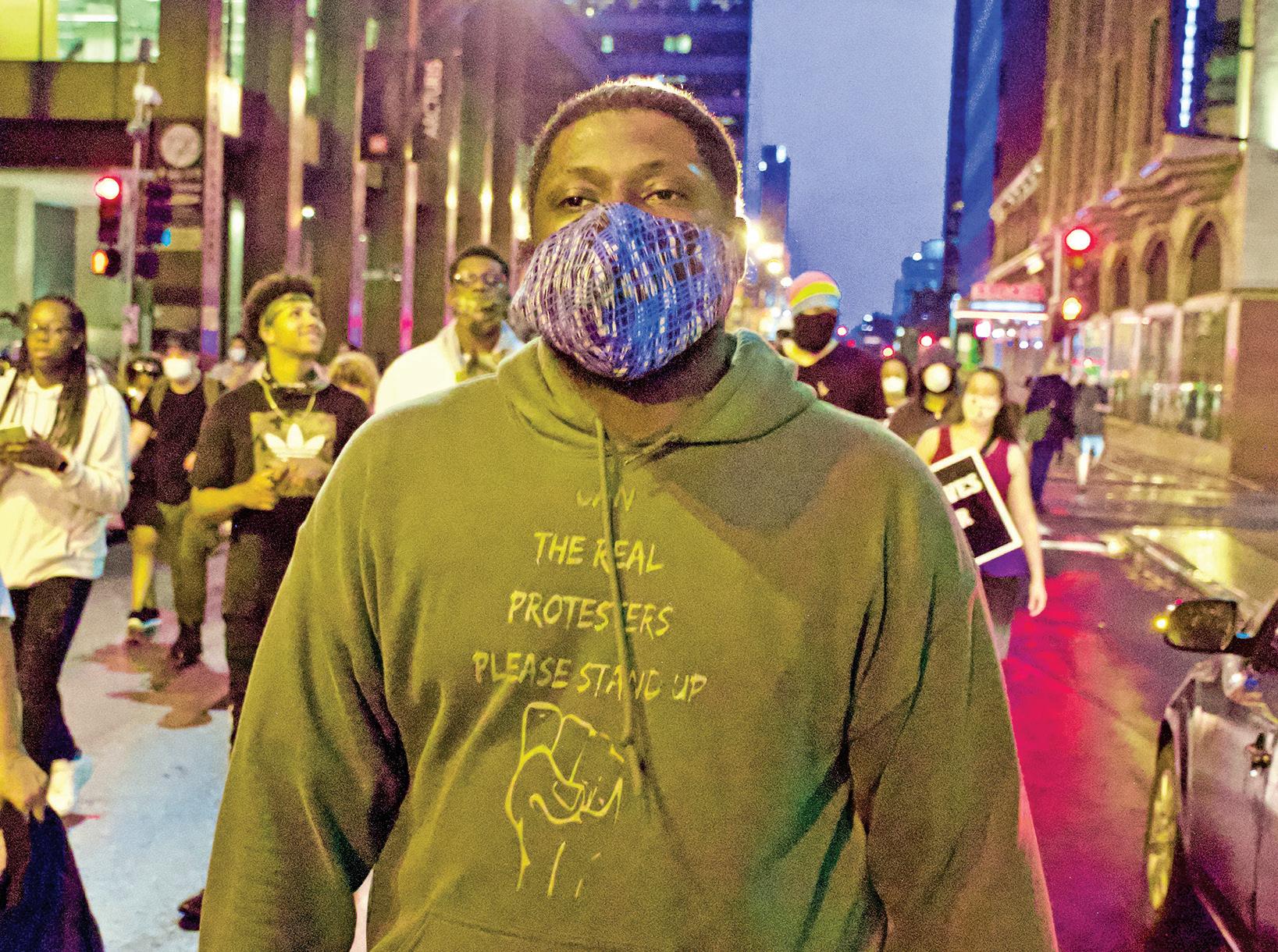
By Dr. Will Ross and Dr. Fredrick Echols
For The St. Louis American
As public health officials, we adhere to the Centers for Disease Control and Prevention (CDC) charge of protecting and improving the health of all people and their communities. We do this by promoting healthy lifestyles, implementing community engagement strategies, using evidence-informed science to investigate disease, and detecting, preventing and responding to infectious diseases. Inherent in our approach to disease prevention is the embrace of health equity, which states that all individuals should have access
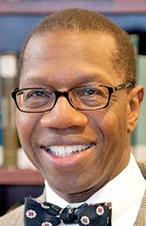
By Kendra A. Burgess For The St.
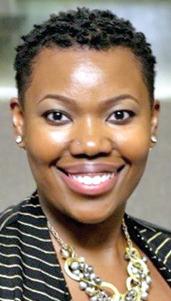
One in four U.S. adults – 61 million Americans – have a disability that impacts major life activities, according to a 2016 report by the Centers for Disease Control and Prevention. From classes in life skills to job training programs, The Whole Person’s mission is to help people with disabilities in Kansas and Missouri live more independently. Unfortunately, the same systemic shortfall that forces those in the health insurance coverage gap to choose between doctor visits and feeding their families also impacts people with disabilities. This essentially locks them into poverty to maintain eligibility for Medicaid coverage or wading through the lengthy process of awaiting a disability determination before getting medical coverage through Social Security Supplemental Income.
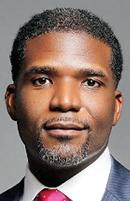
While working to fully mitigate the COVID-19 outbreak, we are yet again dealing with another terribly familiar public health emergency: an unarmed African-American male dying at the hands of the police. In this case, George Only a unified,
to the resources they need to reach their full health potential. As the COVID-19 pandemic unfolded in the St. Louis region, it became immediately apparent that a specific population, namely African Americans, were not reaching their full health potential. By now, most are aware of the COVID19 pandemic’s devastating, disproportional effect on the African-American community. In the City of St. Louis, as of May 31 African Americans account for 63%
of COVID-19 cases (1,234 out of 1,955) and 62% of COVID-19 related deaths (81 out of 130). This is not happening by chance, as we are keenly aware of the social and structural determinants of health that place African Americans and other vulnerable populations right in the line of fire of a highly infectious and lethal viral infection.
n By increasing the individual income eligibility limit up to about $18,000 per year, roughly 230,000 Missourians will access coverage through Medicaid expansion.
However, there is a better way, through Medicaid expansion – a path that 36 states have already taken, and which Missouri voters will have the chance to approve through the Amendment 2 Question in the August 4 statewide primary election. Medicaid expansion acts as an employment incentive for people with disabilities – and a needed investment in our Missouri workforce. By increasing the individual income eligibility limit up to about $18,000 per year, roughly 230,000 Missourians living in rural and metropolitan areas will access coverage through Medicaid expansion. Among those with disabilities, research shows higher employment rates in Medicaid expansion states versus those in non-expansion states.
Missouri still requires many medically unnecessary procedures to receive an abortion
By Sandra Jordan
Of The St. Louis American
In a big victory for women’s health in Missouri, an Administrative Hearing Commission ruled on Friday, May 29 that the Missouri Department of Health and Senior Services wrongfully withheld Reproductive Health Services of Planned Parenthood of St. Louis’ license to provide abortion services. The battle over the license has been going on since last spring. The commission has authority to hear cases and issue a decision when a state agency has denied renewal of a license. The case was decided by Commissioner Sreenivasa Rao Dandamudi. The ruling renewed the abortion license for Reproductive Health Services, and abortion services will continue at its St. Louis location. Following the decision, Yamelsie Rodriguez, president and CEO of Reproductive Health
n “There is much more work to be done to ensure patients can access safe, legal abortion inside their home state.”
– Alexis McGill Johnson, Planned Parenthood
Services of Planned Parenthood of the St. Louis Region, released a statement. “For more than a year, Missouri’s health department has targeted Planned Parenthood. Missouri’s health department director, Randall Williams made false allegations about the high-quality care we pro-
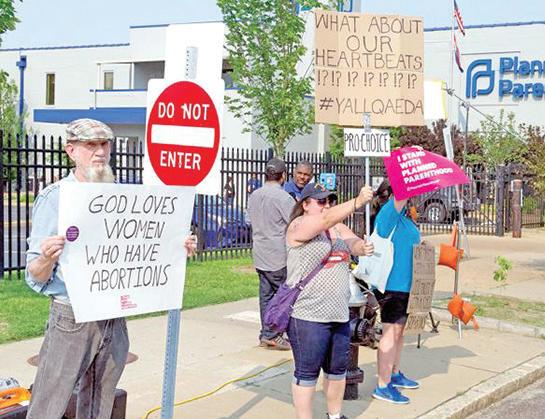

Continued from A12
Floyd died in Minneapolis after a police officer knelt on his neck for more than eight minutes. Mr. Floyd’s tragic death has led to widespread protests in Minneapolis, New York, Washington, Chicago, Atlanta, here in St. Louis, and other cities, as African-American citizens and their allies are demonstrating against the persistent, inequitable treatment of people of color (African Americans and other ethnic minorities) by the nation’s unjust criminal justice system.
As we in public health have declared the epidemic of gun violence in America a public health threat, so we must call out the root cause of police
vide and the dedicated, expert medical staff who provide it — all the while failing to tackle the real public health crises ravaging the state, including the COVID-19 crisis, rising infant and maternal mortality rates and skyrocketing rates of sexually transmitted infections like syphilis,” Rodriguez stated.
“Today’s ruling is vindication for Planned Parenthood and our patients who rely on us.”
Dandamudi wrote in his decision: “Planned Parenthood has demonstrated that it provides safe and legal abortion care. The physicians who perform abortions at Planned Parenthood through Washington University and [Barnes Jewish Hospital] are all exceptionally competent and well trained.”
Alexis McGill Johnson, acting president and CEO of Planned Parenthood Federation of America, said the decision is a hard-fought victory for its patients and for people across Missouri to ensure that abortion remains safe and legal.
“The data shows that many have already paid the price, with the vast majority of Missouri patients forced to cross state lines to get the care they need,” McGill Johnson stated.
brutality towards men of color. That requires affirming racism as a structural determinant of health and developing a strategic plan to unravel and excise it from the fabric of our community.
According to the American Public Health Association, if we are to achieve health equity and create the “Healthiest Nation in One Generation,” we must address injustices caused by racism, which we define as “the state-sanctioned and/ or extralegal production and exploitation of group-differentiated vulnerability to premature death.”
Professor Julio Frenk, dean of the faculty at Harvard School of Public Health, writes that racism is a public health problem “that contributes to higher levels of stress, greater exposure to risk factors, reduced access to medical and social services, and ultimately

“TakingCareofYou”
to excess levels of disease, disability and death.”
According to data published by the CDC:
• African-American women across the income spectrum and all walks of life are dying from preventable pregnancy-related complications three to four times the rate of non-Hispanic white women
• African Americans were 20 times more likely to die from heart disease than non-Hispanic whites
• African Americans have the highest death rate and shortest survival of any racial and ethnic group in the U.S. for most cancers.
n Nationally, we spend less than 3% of the GDP on public health. At the state level, Missouri ranks last in public health funding, spending $6 per person.
• African Americans were 1.5 times more likely to be uninsured than non-Hispanic whites, and
Toward that end, we unequivocally and categorically declare that racism is a public health crisis. We must execute the core functions of public health to mitigate and dismantle structural racism in the same manner that we are addressing the COVID-19 pandemic. We must systematically assess the level of systemic and structural racism in our community, we must develop policies that demolish the systems and behaviors that
contribute to structural racism, and we must assure the public that we are sincere in these efforts by consistently communicating with transparency and conducting evaluations that holds the right people accountable. Fortunately for us, a lot of this groundwork has been laid by the diligent efforts of Forward through Ferguson Health Equity Works, and other local initiatives. These efforts will require public funding commensurate with the importance of this work. Funding public health has not been a high priority for our country. Nationally, we spend less than 3% of the GDP on public health. At the state level, Missouri ranks last in public health funding, spending $6 per person. Locally, funding for health and human services is approximately 0.5% of the
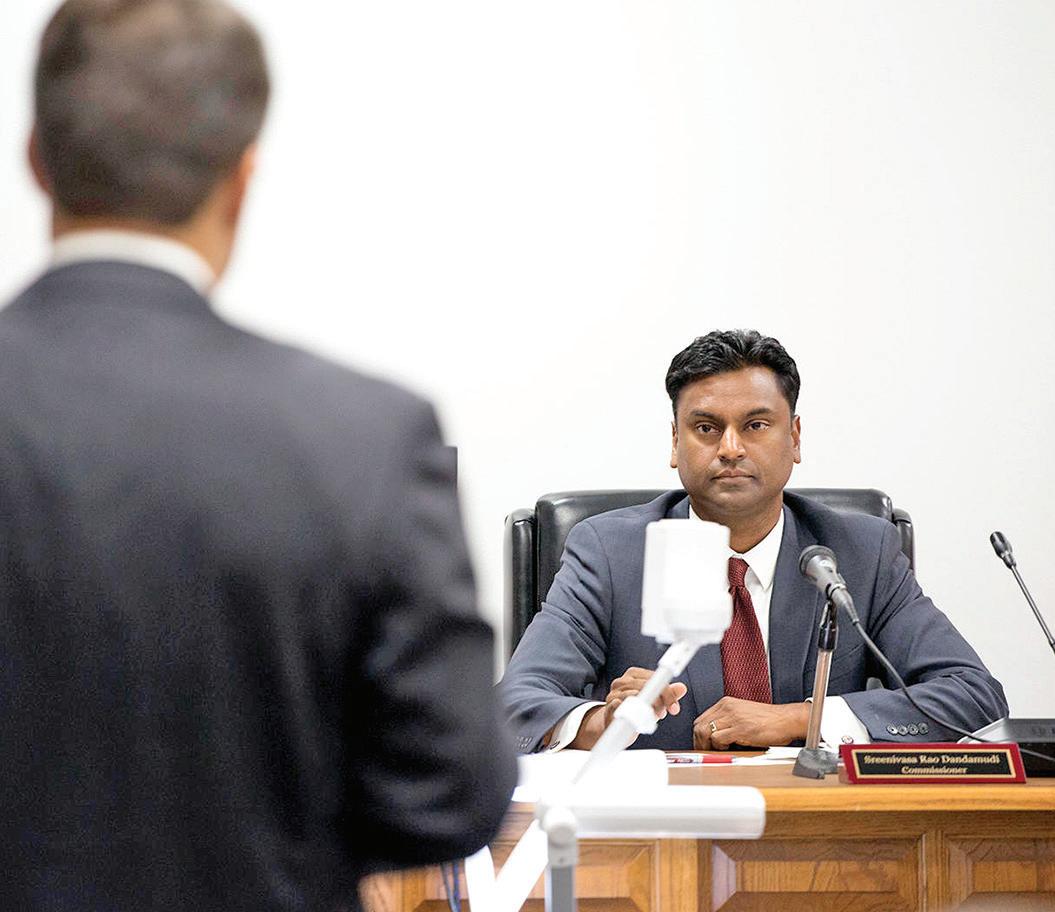
General Fund budget. We will not be a healthy country, a healthy Missouri, or a healthy St. Louis unless we come face-to-face with the specter of racism that has haunted us for centuries. We must adopt an anti-racist stance that is respectful and inclusive of all individuals. While we acknowledge that even the most assertive program may take a generation to succeed, inaction will only assure us of more tragic events, and more protests after this one passes. The “fierce urgency of now” compels us to action. Will Ross, MD, MPH, is chairman of the Joint Boards of Health and Hospitals for the City of St. Louis Department of Health. Fredrick Echols, MD, is acting director of the City of St. Louis Department of Health.
n “An abortion license, while critical to our ability to provide care, still cannot undo the harm that medically unnecessary policies in our state inflict on patients.”
– Yamelsie Rodriguez, Planned Parenthood
for medication abortion – still make it extraordinarily difficult for people to access care in Missouri,” Rodriguez said.
“An abortion license, while critical to our ability to provide care, still cannot undo the harm that medically unnecessary policies in our state inflict on patients. It does not have to be this way. Gov. Parson could eliminate these medically unnecessary restrictions using the authority granted in his emergency order. We continue to keep our doors open and can continue to care for all patients who choose to access reproductive health care, including safe and legal abortion, in Missouri and across the region.”
“This is what it looks like when abortion is a right in name only. There is much more work to be done to ensure patients can access safe, legal abortion inside their home state. During a worldwide pandemic, every public
Continued from A12 health care provider including Planned Parenthood should have all the resources they need to care for the complex needs
of their communities, including abortion.” Rodriguez detailed more of the obstacles to receiving an
By Missouri Foundation for Health
n We, at Missouri Foundation for Health, are committed to dismantling the systems that allow inequitable health outcomes to exist.
Racism is a public health crisis, resulting in a shocking and appalling number of deaths among black Americans. Beginning with and stemming from slavery, decades of public policy decisions have firmly instituted racism in all our public systems and structures. The practices, behaviors, and attitudes generally accepted or ignored by a majority-white society, resulting in the murders of Ahmaud Arbery, Breonna Taylor, and George Floyd and the high COVID-19 death rates for black Americans, are proof of this reality.
Continued from A12
Missourians are already paying for Medicaid expansion. We just are not getting any of the benefits right now. Our tax dollars are going to other states, like New York and California, that have already expanded Medicaid, instead of helping people here in Missouri. During the current global
pandemic, The Whole Person continues to safely provide home health care services for seniors and people with disabilities. Assistance with medical needs or activities of daily living such as bathing, dressing, and eating allows seniors to age in place and gives people with disabilities the freedom to live and work in the community with dignity. We rely on home caregivers who provide these services for the community. Yet, too many
Missouri is no different in this regard, with its own history of racist policy decisions and inequities in health opportunities and outcomes for communities of color. We, at Missouri Foundation for Health, are committed to dismantling the systems that allow inequitable health outcomes to exist. Racism has no place here. Missouri Foundation for Health is a catalyst for change, improving the health of Missourians through partnership, experience, knowledge, and funding.
of the same home caregivers who provide these essential services also fall into the coverage gap, earning too much to qualify for Medicaid and too little to afford private insurance. It is only fair home health workers are given the means to care for their own health, which they risk as they continue to care for our most vulnerable populations. Medicaid expansion would provide greater access for home health care workers to receive coverage.
medically unnecessary requirements – two in-person trips to the
Last year, Missouri enacted one of the most restrictive bans on abortion in the country before the Missouri Department of Health and Senior Services refused to renew Planned Parenthood’s license. Planned Parenthood sued, a state judge blocked the shutdown of services, and the Administrative Hearing Commission granted a stay, allowing Planned Parenthood to stay open while the case was litigated. This ruling is a result of a commission hearing in October 2019. Either side has 30 days to file a motion to reconsider the decision with the commission.
Rev. Traci Blackmon will facilitate free COVID19 testing and the distribution of 5,000 protective masks and sanitizer kits at her church, Christ The King United Church of Christ, 11370 Old Halls Ferry Rd. in Florissant, from 9 a.m.-12 p.m. and 1-4 p.m. Friday, June 5. COVID-19 testing is for individuals 18 and older and will be conducted from inside a vehicle. You must
The financial burden of our healthcare system should not solely rest on the backs of employers and people should not suffer inhumanely just because their job does not come with health insurance. With a little help, people with disabilities can work, play, travel, serve and thrive in their communities. Home and community-based services have shown to improve health outcomes for people with disabilities; they also help to save
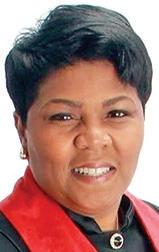
Rev. Traci Blackmon
register in advance by calling 314-7416806 or at bit. ly/2M2Qnin. Testing is being made possible by health organization Faith and For the Sake of All and Care STL Health, and the masks and hand sanitizer kits are being provided by Masks for the People, a human-
the state the cost of providing those services. People with disabilities are the largest minority group in America, and anyone can join at any time. We each have a shared interest in removing barriers to affordable healthcare for those in our most vulnerable populations. True to the disability community’s independent living philosophy of “for the people, by the people,” this decision to expand Medicaid now rests
itarian campaign co-created by Faith in Action Urban Strategies director and LIVE FREE director Pastor Michael McBride. McBride lent his support to Blackmon on the ground in the days immediately following the killing of Michael Brown in Ferguson, providing organizing training to local young people looking to heal their pain and harness their power.
with Missouri voters. The mission of The Whole Person is to promote independence for people with disabilities, and Medicaid expansion does just that by securing a more equitable Missouri for all. Kendra A. Burgess of Kansas City is Public Policy coordinator at The Whole Person, which serves clients in Cass, Clay, Jackson and Platte counties in Missouri and Johnson, Leavenworth, and Wyandotte counties in Kansas.
Your Health Matters is provided in partnership with Missouri Foundation for Health is a resource for the region, working with communities and nonprofits to generate and accelerate
in health. As a catalyst for change, the Foundation improves the health of Missourians through partnership, experience, knowledge and funding.

Nicole Galloway – the Missouri state auditor running for governor as a Democrat –said the Minneapolis Police officers responsible for the killing of George Floyd “should be held accountable.”
On Friday, May 29, soon after Galloway issued her statement, now former-Police Officer Derek Chauvin, who kept his knee on Floyd’s neck as Floyd said he was dying, was arrested and charged with third-degree murder and manslaughter. There also is an ongoing FBI investigation into Floyd’s death.
Galloway said the police killing of Floyd – who plainly told police that the knee on his neck was killing him just before he died – provided “another painful glimpse into our fractured criminal justice system.”
“In Missouri, we are all too familiar with this pain,” Galloway said in a statement.
“Fixing it starts with accountability; otherwise, we cannot foster trust and compassion between communities and the brave individuals who are sworn to protect them. The disparities in our criminal justice system are real, and we must do the work of building a Missouri that is fair and accountable to all of its citizens.”
Though Galloway has four opponents in the August 4 Democratic primary, they are little-known while she previ
ously won a statewide election. In the general election, she will likely be the Democrat to face the incumbent, Gov. Mike Parson Parson was elected lieutenant governor in 2016 then became governor through the resignation of Eric Greitens. He has three little-known opponents in the Republican primary. One, Saundra McDowell, ran against Galloway for state auditor in 2018 and was the only Republican to lose that general election.
Parson, formerly the sheriff of Polk County, said Floyd’s death “didn’t look too good” at his press briefing on May 28. “Law enforcement’s primary job is to help people and not hurt people,” Parson said. Galloway echoed what Joe Biden, the presumptive Democratic nominee for U.S. president, said two days earlier. Biden said the officer who killed Floyd and those who watched him die should be “held more fully accountable.”

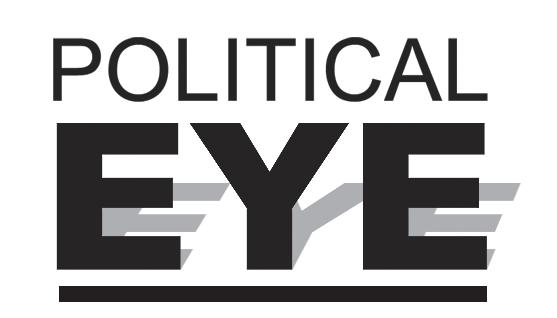
President Donald Trump said on Twitter early on May 29 that the National Guard should be deployed to quell the unrest in Minneapolis and should open fire on anyone taking goods from stores damaged during protests. “When the looting starts the shooting starts,” Trump tweeted.
Minnesota abolished the death penalty in 1911. In no state is property destruction or theft punishable by death. Biden responded, saying he was “furious” over the president “calling for violence against American citizens.”
Trump’s call for shooting protestors is ‘immoral and illegal’
“We call on the National Guard and law enforcement in Minneapolis to comply with the law and not President Trump,” said Jeffery Robinson, director of the American Civil Liberties Union’s Trone Center for
Robinson said Trump’s statement was “immoral and illegal” and that the president’s “actions consistently demonstrate a gross disregard for the racial terror and police violence that communities of color across the country experience on a regular basis.”
In July 2017, while speaking to police and crime victims on Long Island, Trump encouraged police to inflict pain on suspects being taken into custody.
“President Trump has told police officers in New York that they should feel free to use violence against ‘thugs being thrown into the back of a paddy wagon.’ He did not hesitate to claim to a foreign leader that there is no racial problem in America,” Robinson said.
“The president’s latest suggestion that law enforcement
murder Mr. Floyd,” Robinson said.
“Holding these officers accountable is the bare minimum needed to show that our legal system recognizes that black lives actually matter. The next step must be bold changes that address the racism at the root of our policing institutions.”
Ethical Society of Police: charge the officers
The Ethical Society of Police’s statement:
The Ethical Society of Police is absolutely disgusted and angry over the senseless murder of Mr. George Floyd at the hands of the Minneapolis Police Department.
We believe the decision to fire Officers Derek Chauvin, Tou Thao, Thomas Lane, and J Alexander Kueng for the murder of Mr. Floyd was justified. Mr. Floyd repeatedly said, “I can’t breathe,” as Officer Chauvin callously dug his knee into his neck. Officer Chauvin had no concern for the wellbeing of Mr. Floyd even as he called out for his mother and repeatedly pleaded for air.
Officers Tou Thao, Thomas Lane, and J Alexander Kueng didn’t kneel on the neck of Mr. Floyd, but they were equally as complicit and cowardly with their inactions and indifference to his life.
It’s also important to note the behavior of the first medic upon his arrival to the scene. There was no sense of urgency with Mr. Floyd’s life. This medic should be fired as well. Medics take an oath to render aid to those in need without delay. This medic failed Mr. Floyd.
Unfortunately, this is one of many instances where a black life didn’t matter to law enforcement. Mr. Floyd’s life should have been treated similarly to how law enforcement around the country has treated militia armed with assault weapons who’ve stormed, shut down, and conducted initiated mock hangings at capital build-
The Missouri Legislative Black Caucus decries the senseless killing of George Floyd by the Minneapolis Police Department. We express our deepest condolences to the friends and family of Mr. Floyd. His unjustified death, along with the killing of Breonna Taylor, has once again brought national attention to a pattern of police violence against African Americans that has persisted in this country and originated with the slave patrols of the South. We stand with nonviolent protesters and will focus our legislative agenda on comprehensive reform in response to police use of excessive and unnecessary force. Peaceful protests against these killings have been a positive movement and expression of the pain and anguish of communities that will no longer tolerate inaction or the continued lack of accountability for these crimes. This is in contrast to the hijacking of these peaceful protests by those who have no regard for justice or the memory of George Floyd. In downtown St. Louis, four police officers were shot and in a separate incident, a former police captain was killed by looters at a local pawn shop. Small businesses, many of them African-American owned and operated, have been looted and burned to the ground. This is not what we are fighting for. These actions are wrong and to be condemned. Anything less is an insult to the memory of George Floyd and the peaceful movement his death has inspired.
State Sen. Karla
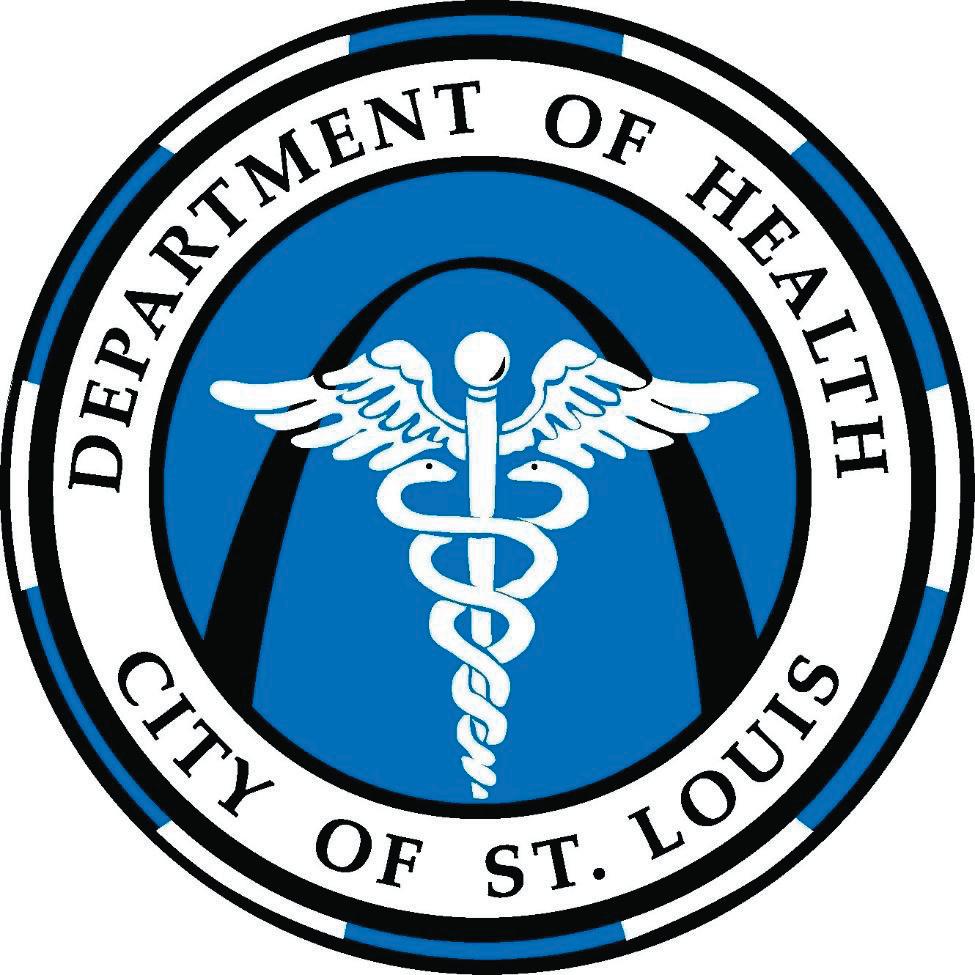
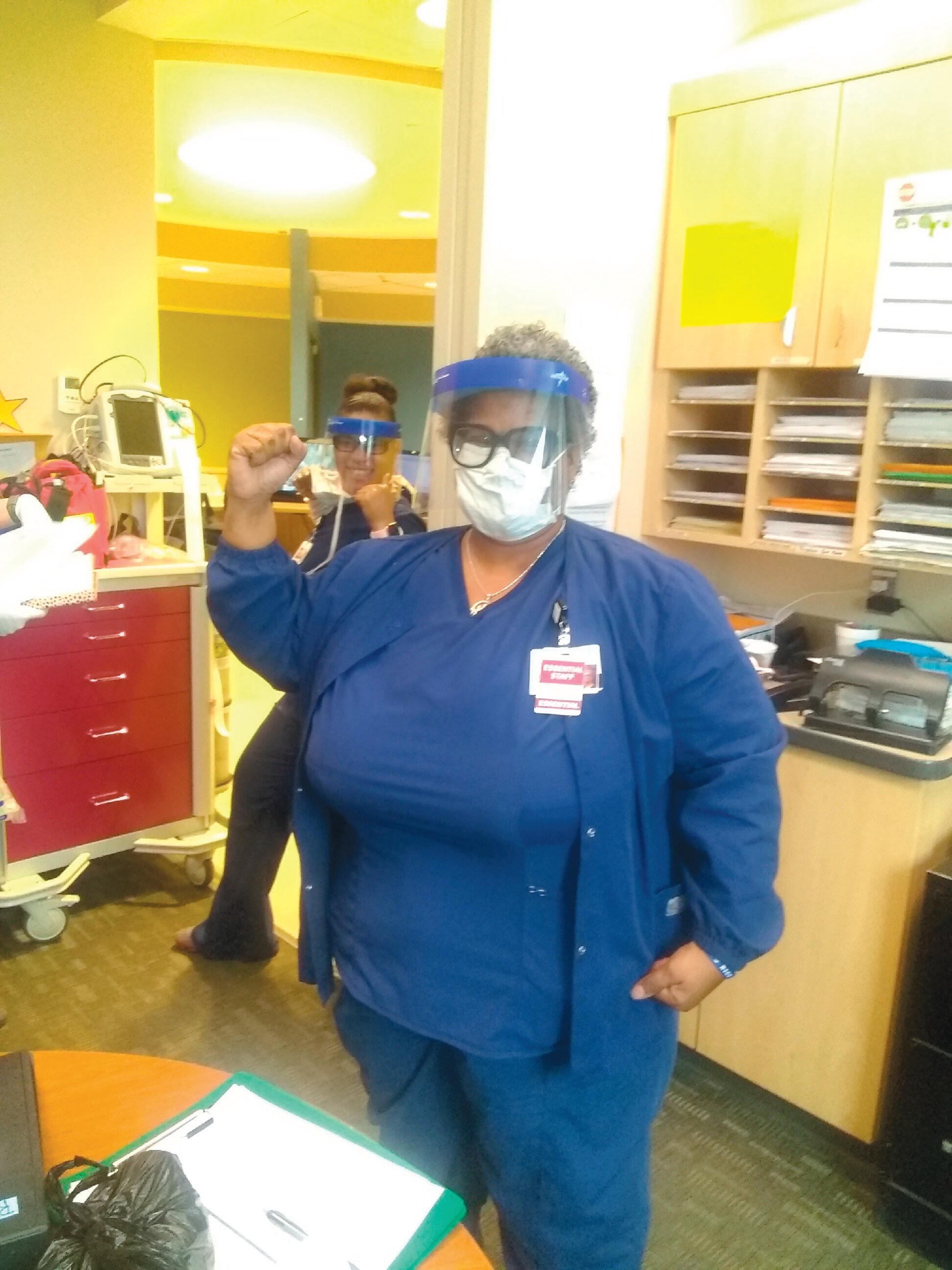


For the past 13 years, I’ve been honored to serve the people of the City of St. Louis in the Missouri General Assembly. With the final session of my legislative career now over, I look back upon our many achievements together, and I am humbled by this incredible journey you set me on all those years ago.
With your help, I’ve brought millions of state dollars back home to St. Louis to lift up our communities. We worked for better schools and safer streets. We expanded the A+ scholarship program to include vocational and technical schools. We brought awareness to and helped fight the spread of sex trafficking in Missouri. We passed historic criminal justice reform, “banned the box” and expanded expungement
opportunities to help reformed Missourians find a job. Strengthened by your support, your prayers and your kind words, I spoke truth to power and gave a voice to the voiceless.
Even this year, we managed to move our community forward despite unprecedented circumstances. The COVID-19 pandemic has hit the St. Louis region – especially its Black citizens – especially hard. That is why, as a member of the Senate Appropriations Committee, I made sure that $35 million in federal funding would be put to work in the City of St. Louis to help first responders, medical professionals and others on the frontlines of this fight. By strengthening the fight against the COVID-19 virus on all fronts, and focusing on underserved communities, we can save Black lives.
While the 2020 legislative session was abbreviated due to the effects of the COVID-19 virus in Missouri, the General Assembly was still able to pass more than 45 pieces of legislation. Below are several pieces of legislation I would like to highlight.
I was successful in adding an amendment to House Bill 1682, designating September as “Infant and Maternal Mortality Awareness Month.” According to the Center for Health Economics and Policy, Missouri has one of the highest maternal mortality rates in the country, with women of color being more likely to lose their lives to childbirth than their white counterparts. I hope this designation will help educate the public on the importance of health care for women and their new babies.
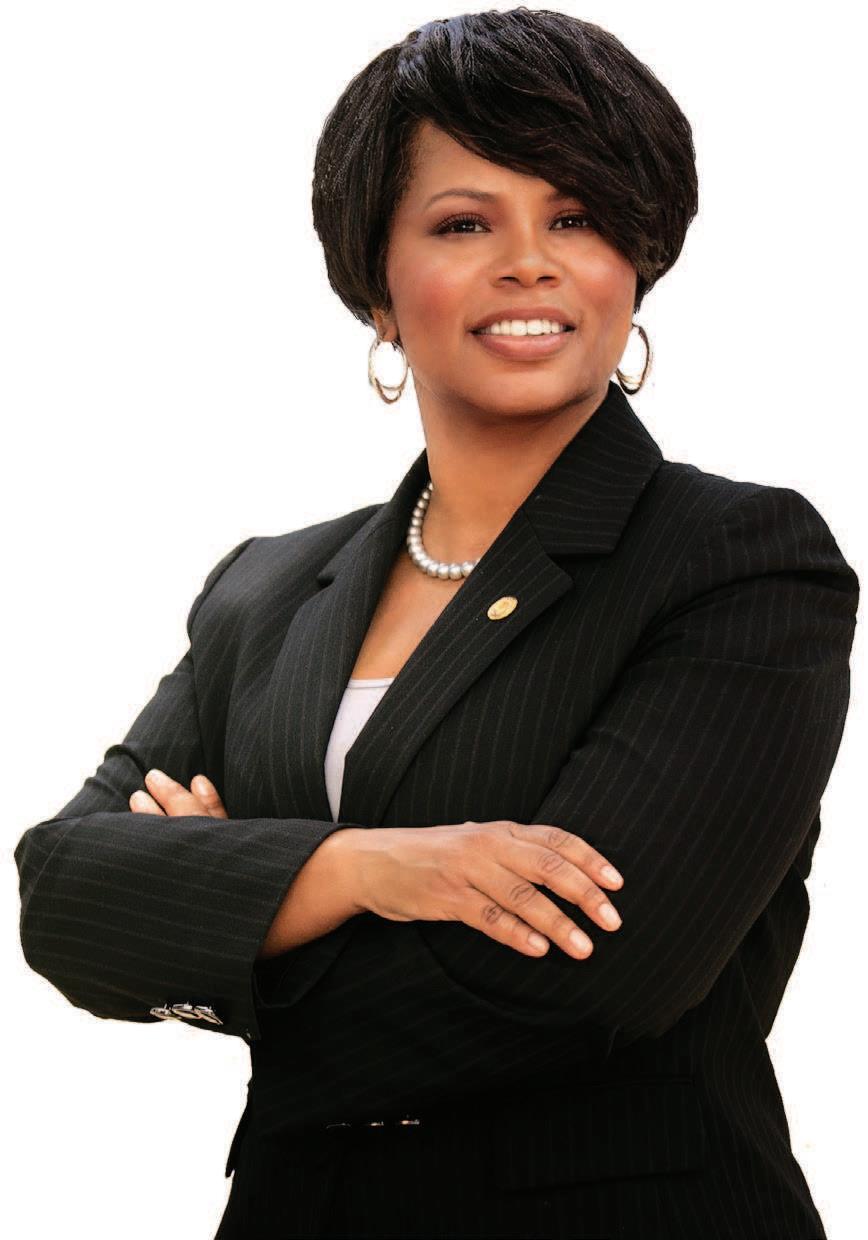
During session, I opposed Senate Bill 600. This omnibus crime bill, passed by the General Assembly, increases the sentencing requirements for those committing armed criminal action and prohibits parole, probation or conditional release for those convicted of this crime. Additionally, it creates the offense of vehicle hijacking. Lastly, the bill establishes the Missouri Criminal Street Gangs Prevention Act. This language requires individuals to serve consecutive sentences, rather than concurrent, and extends the amount of time individuals are behind bars. I oppose “tough-on-crime” polices because I believe our state should be pursuing criminal justice policies that address the root cause of the crime.
I, along with several other lawmakers from St. Louis, also opposed House Bill 1604, which would have removed residency requirements for police officers serving in the City of St. Louis. I believe communities are best served by law enforcement officers who are a part of their community, and removing residency requirements would sever a valuable tie between law enforcement and those they serve. House Bill 1604 did not pass this year.
Without a doubt, we have a long way to go in beating this virus, but I am proud that our community has willingly sacrificed so much to protect the health and safety of the most vulnerable among us. We responded as one community, working toward the greater good, and it is through this solidarity that I know we will prevail.
Indeed, this global pandemic has made my final legislative session a challenge like no other. But like every session before it, I cherished the time to serve my constituents. Hopefully, I shouldered your burdens to the best of my ability and ensured your voices were heard in state government.
Helping me do this important work was a skilled staff, led by the unflappable Dr. Jason Groce, a man with an incredible depth of talent and an even deeper faith. Over the years, the women and men
who have served in my office have helped countless citizens navigate the gears of government. To Dr. Groce, Jay Nelson, Blake Lawrence and my dearly departed friend, the late Eric Vickers, I could not have done it without you, and I am so very grateful for your service over the years.
Serving as your state senator has been the honor of a lifetime. I thank you with all of my heart for this rare and precious opportunity. Although my days in the Legislature will soon be over, please know that my commitment to you knows no end.
With all my love,

Senator Jamilah Nasheed - 5th District
Each year, the Missouri General Assembly is tasked with creating a balanced budget for the upcoming fiscal year. I have served on budget committees, both in the Missouri House of Representatives and the Senate, and I believe careful stewardship of taxpayer money is one of the most important responsibilities for elected leaders. With that in mind, below is information on funds from the state’s Fiscal Year 2021 operating budget that benefit the 5th Senatorial District. Fiscal

Nasheed Championed
$1,700,000 – Teach For America
$700,000 – Mission STL
$500,000 – St. Louis Workforce Pre-Apprenticeship Training
$35,263,562 – City of St. Louis – Federal Stimulus
$7,156,731 – Lincoln University – Federal Stimulus
$3,487,087 – Harris-Stowe State University – Federal Stimulus
$74,548 – Regional Engagement – Minority Participation and Inclusion Position
$2,500,000 – Veterans Commission – Community Assistance
$500,000 – Save Our Sons Program
$250,000 – Programs for Victims of Sexual Assault
Total: $52,131,928
SIUEEAST ST.LOUIS CHARTER HIGH SCHOOL
SIUE East St. Louis Charter High School is accepting applications for enrollment for the 2020-2021schoolyear.
To be eligible students must:
Be age 14 through 19,
Be in the 9th – 12th grade,
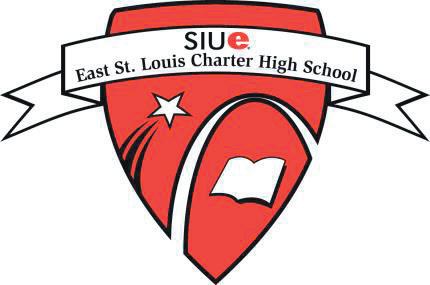
Live in East St. Louis School District 189,
Submit a complete application, and
If selected, provide transcripts, physical/medical forms, proof of residency, birth certificate, and other documents.
Students will be selected by lottery on June 8, 2020 to fill open slots by grade level. Deadline to be included in this lottery is June 5, 2020.
The application must be completed and submitted online at https://siuecharterhighsch.wixsite.com/chs2020
For more information contact the school counselor: Pamela Saffore Phone: (618)482-8374 | Email: psaffor@siue.edu
Gina
Jeffries, Ed.D, Director
SuccessIsTheOnlyOptionForCHSStudents!
SIUEEAST ST.LOUIS CHARTER HIGH SCHOOL
601 James R. Thompson Boulevard Phone: (618)482-8370 East St. Louis, IL 62201-1118 Fax: (618)482-8372
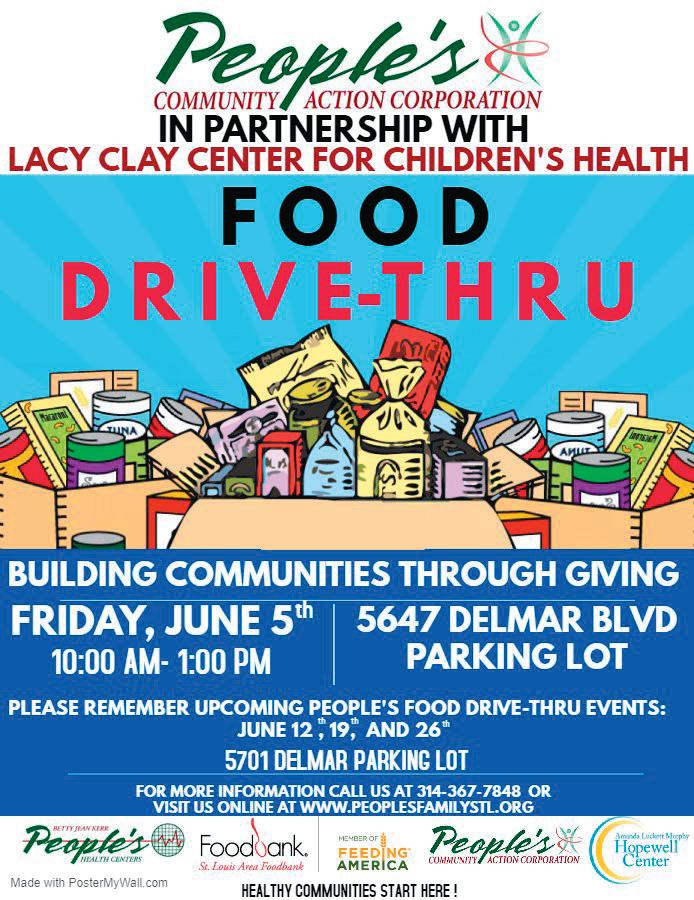
American staff
Maryville University named two black leaders to its Board of Trustees: internationally recognized physician-scientist Michael R. DeBaun, MD, MPH, and Flint W. Fowler, PhD, president of the Boys & Girls Clubs of Greater St. Louis.
“Dr. DeBaun and Dr. Fowler have dedicated their careers to ensuring young people are able to reach their full potential, especially young people of color and young people from underrepresented groups,” Mark Lombardi, PhD, president of Maryville University, said in a statement.
“Their expertise and insights will help Maryville continue to expand higher education access and opportunities for all.”
Lombardi called them “courageous and passionate leaders.”
DeBaun is founding director of the Vanderbilt-Meharry Center for Excellence in Sickle Cell Disease in Nashville. The center is one of the first in the country to establish a medical home care model for children and adults with sickle cell disease in a community health center.
DeBaun’s advocacy and research have resulted in fundamental medical advances in care of children and adults with sickle cell disease. For more than 20 years, his efforts in sickle cell disease have focused on epidemiology, cognitive impact, clinical significance and strategies for preventing strokes and silent strokes in children. He has been the leader of multiple clinical trials treating and preventing strokes in children with sickle cell disease in North America, Europe and

Africa.
DeBaun has a strong connection to Maryville University. His mother, Everlouis Rutledge DeBaun, was Maryville’s first African-American graduate in 1958. She served as a longtime teacher in St. Louis Public Schools. In lasting tribute, the DeBaun family supports the Everlouis Rutledge DeBaun Endowed Scholarship at Maryville, established by the Class of 1958 in her memory. Fowler serves as president of the Boys & Girls Clubs of Greater St. Louis (BGCSTL), which provides after-school, teen, sports and summer programs to youth in the St. Louis area while also providing a safe place for children to learn and grow. BGCSTL serves youth across St. Louis City and County at seven locations, a dropout prevention program in two high schools and through its Mentor St. Louis and St. Louis Internship programs. Fowler has received numerous awards for his contributions to the St. Louis community including the Thomas G. Garth Character & Courage Award from the Boys & Girls Clubs of America. Fowler serves on boards for The BackStoppers, Gateway Arch Park
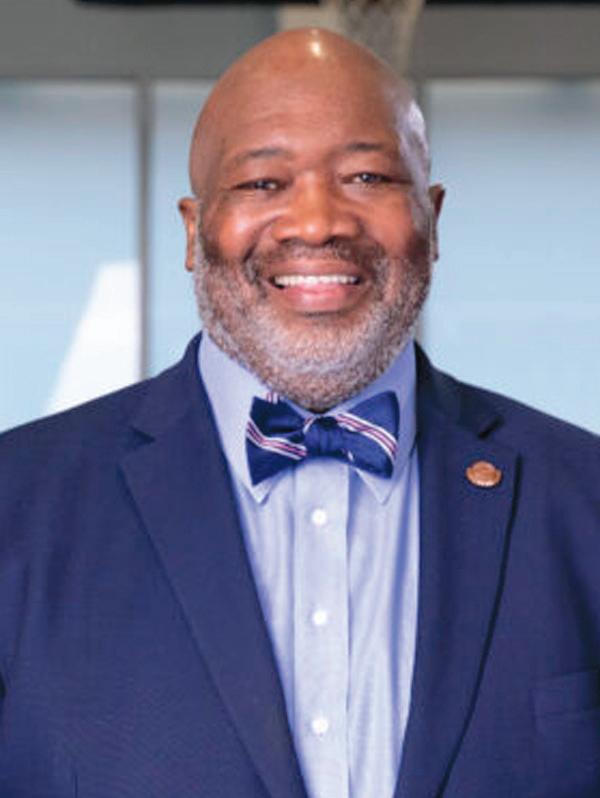
BGCSTL has been a longtime partner of Maryville, and the university introduced its successful life coaching model into the K-12 space through its work with the organization. BGCSTL members and staff train with Maryville life coaches on learning diagnostics and personalized learning strategies and are introduced to careers in emerging technologies like artificial intelligence and cybersecurity. Additionally, BGCSTL members learn to flourish in the areas of technology and STEM through college immersion programs and on-campus and clubsite experiences like robotics.
“The unanimous election of Dr. DeBaun and Dr. Fowler to Maryville’s Board of Trustees demonstrates our eagerness to have such talented and distinguished leaders join us as we accelerate efforts to revolutionize higher education,” Ed Ryan, chair of the Board of Trustees, said in a statement. “We look forward to their involvement in our work as we guide and support Maryville’s mission.”
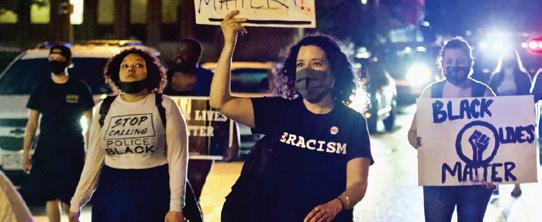
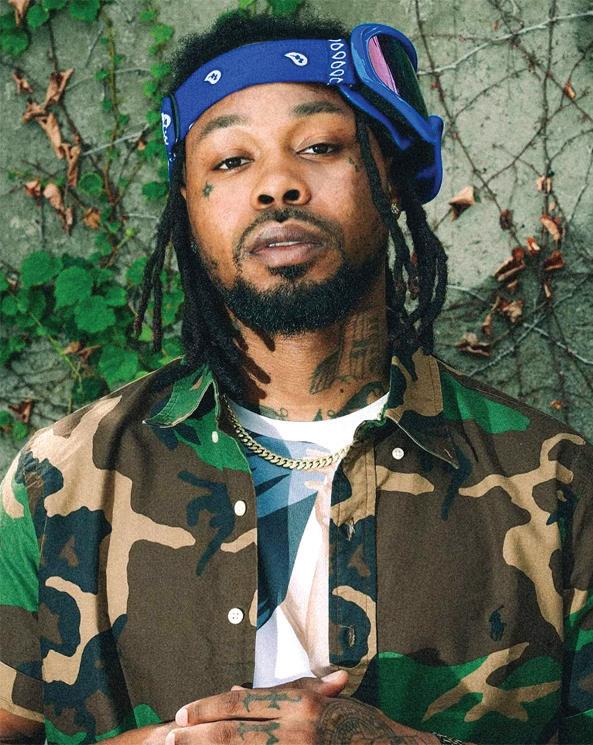
T-Dubb-O and crew cuffed and questioned while peacefully working in their studio
By Rebecca Rivas
Of The St. Louis American
On the night of Monday, June 1, young rapper and Ferguson frontliner T-Dubb-O was standing in front of his music studio and business, Audacity Music Group Studios, on 19th and Locust streets in downtown St. Louis.
Destruction was happening all around him, but he wasn’t worried that his business would be burglarized because the community knew him, he said. More so, he was trying to talk to some of the young teens, who might be making decisions out of anger and grief that could impact them for the rest of their lives.
Without warning, T-Dubb-O said about 20 to 30 city police officers rushed on the property with guns aimed, repeatedly yelling, “Get the [expletive] on the ground.” A video taken by one of T-Dubb-O’s white business partners shows them already on the ground while police are yelling this, and at one moment an officer taunts, “Somebody wants to die today.” The police officers proceeded to place the group of business owners in handcuffs and question them for 45 minutes.
T-Dubb-O sustained some injuries from the aggressive arrest, he said, but mostly he was angry.
n “Good cops stand by quietly as they let every other cop do this.”
- T-Dubb-O
“Don’t talk to me about good cops,” stated T-Dubb-O in a Facebook post about the incident. “Good cops stand by quietly as they let every other cop do this. While a baton is crammed into my leg because they are hoping I show a sign of pain so they can feel like men, the good cop is telling me to calm down and just talk to them.”
After the American’s inquiry into the incident, a police spokesperson said, “We have forwarded the video to our Internal Affairs Division.” The department did not respond with a comment about the incident by press time. When police officers first stormed the property, they kept asking where the “guy with the rifle” was, the “one with the braids.” None of the business owners had a rifle on them. However, earlier in the day, T-Dubb-O had marched in the non-violent protest throughout the city with his four sons — with a rifle strapped to his back. T-Dubb-O was making a statement about open carry for white men
See T-Dubb-O, B2
Walter Johnson book parallels history
By Malaika Horne For The St. Louis American
St. Louis has this strange identity, “a northern city with southern exposure” as it’s sometimes described. Yet most of its past is shrouded in mystery. Walter Johnson, The Winthrop Professor of History and Professor of African and African American Studies at Harvard
University, seeks to rip the veil off the city in his latest book, “The Broken Heart of America: St. Louis and the Violent History of the United States.” Due to the pandemic, most new authors are experiencing difficulties in promoting their books. Johnson is no exception and so Zoom it was on Thursday, May 28, 6 p.m. The program was part of STL History Live at the Missouri History Museum. Gwen Moore, curator of Urban Landscape and Community Identity, served as the moderator. She noted that his “exhaustively researched book is groundbreaking” considered by author Roxanne Dunbar Ortiz as perhaps “the most important book on United States history you will read in your life-
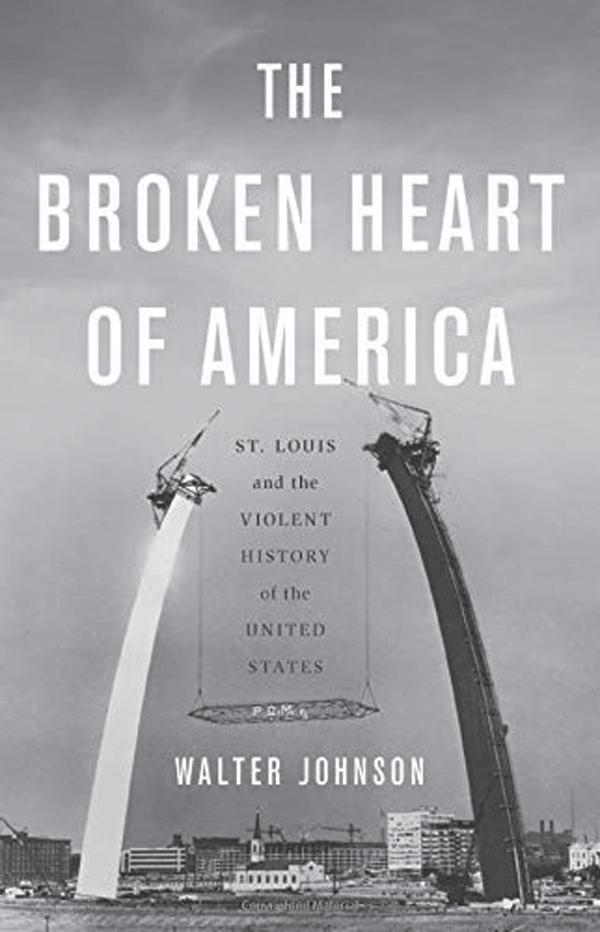
Moore described it as sweeping in scope covering some 200 years of St. Louis History from Lewis and Clark (1804) to the tragic killing of Michael Brown and the Ferguson uprising of 2014. “It has some hard truths; the operative word is truths,” Moore said. “Truths that must be confronted and addressed before we can begin to move forward for a more just and equitable society.” A recurring theme in Johnson’s book is racial capitalism, which a member of the Zoom audience later
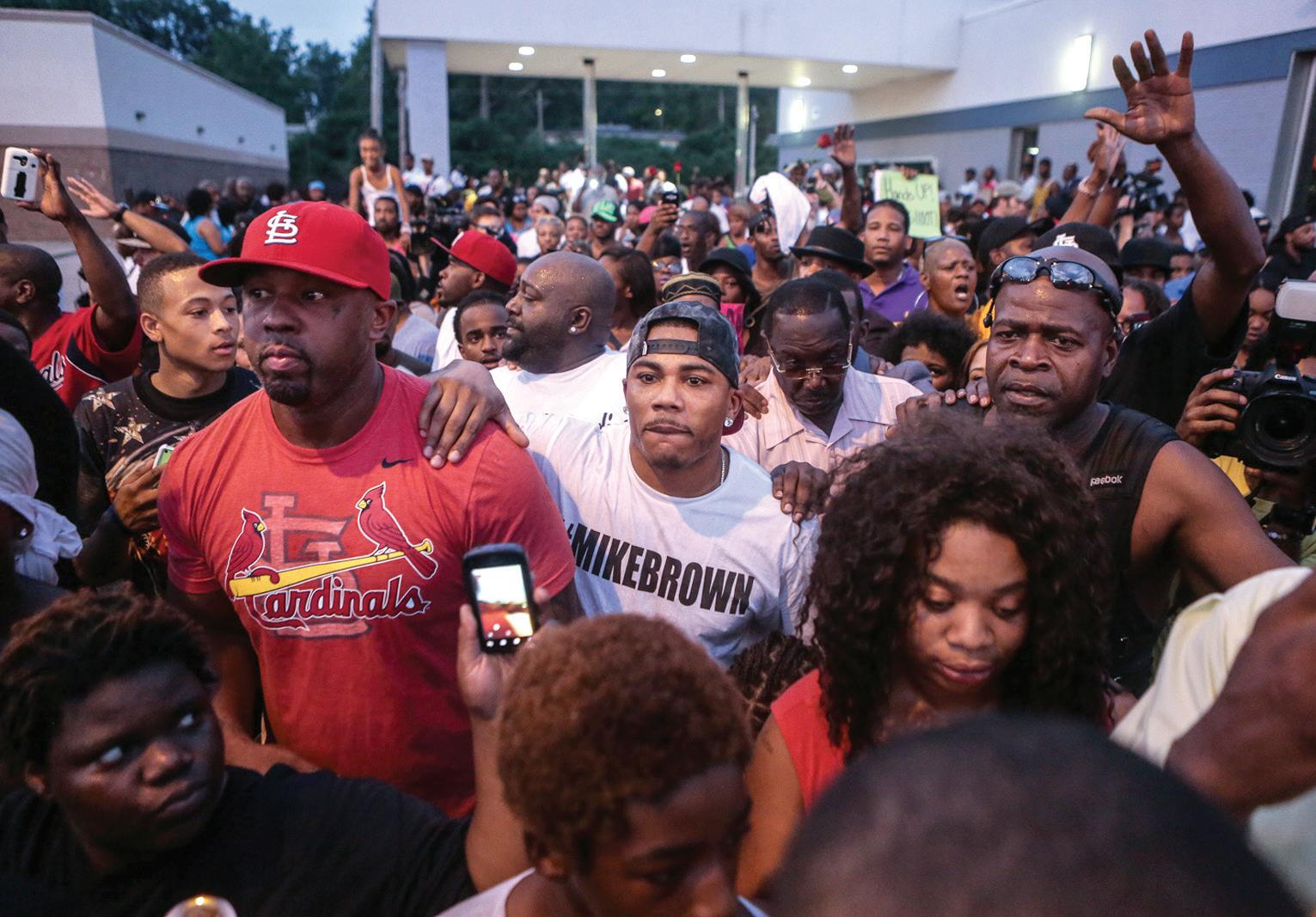
‘I’m at a loss for words’
Black owned 10th
Street Gallery hit by vandals during unrest
By Kenya Vaughn Of The
St. Louis American
Five and a half years ago, 10th Street Gallery was one of many host venues for the “Hands Up, Don’t Shoot” exhibit that featured artists response to the unrest in Ferguson in response to the death of Michael Brown.
On Monday, June 1, the black-owned gallery in St. Louis suffered damage as cities across the nation erupted after George Floyd was killed by a Minneapolis police officer.
“You experience a huge set of emotions when this happens,” said Patricia Smith Thurman, who owns the 10th Street Gallery with her husband Solomon Thurman Jr. “My initial thought was that it was a betrayal, but that didn’t last long. It didn’t last long because I know what happens when people get angry. I know what happens when family gets angry with family. They lash out at a family member. And then the same family comes together later, and you’re forgiven. That’s how I’m trying to see this.”
Looters broke through their door and a large window. Pieces of artwork close by the door
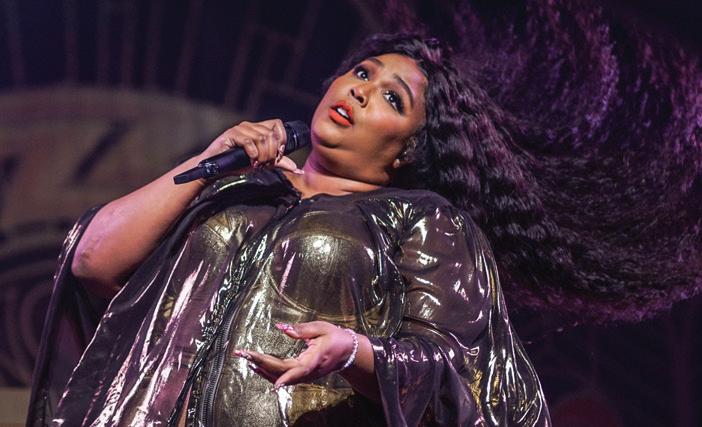
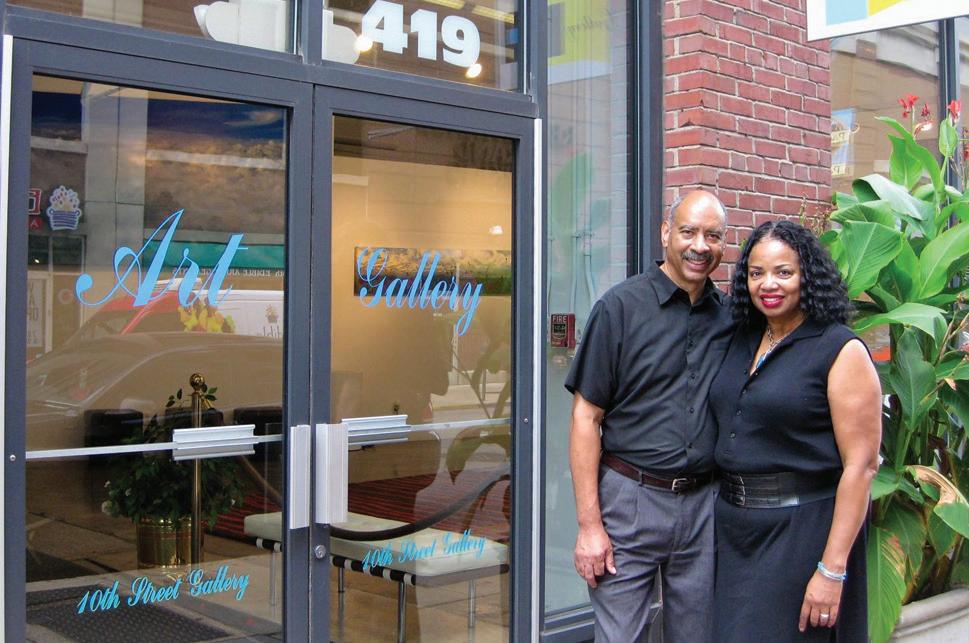
and window were stolen. “I was so saddened by it,” Patricia said. “We survived the Michael Brown era and we just thought we could survive this too.”
who protested the stay-at-home orders nationwide versus black male protestors.
“They could have labeled us ‘extremists,’” he said. “If you are a black man with a gun, you’re automatically a threat and fit the bill of a terrorist.”
The only way the city police would have known about the rifle was if they had been following his Facebook page or were tracking him at the protest. While the officers didn’t say T-Dubb-O’s name, they knew who he was because his business is directly behind St. Louis Metropolitan Police headquarters’ building, he said.
The police’s questioning ranged from whether or not they were involved in shooting the four officers that night to drug possession. One of the officers whispered in his ear that they didn’t get him in Ferguson, but they’d get him now if he didn’t keep quiet, he said. Then one of the black officers came over to mediate and talk about how he knew all about T-Dubb-O’s work with HandsUp United and youth mentoring.
After about an hour, the police left and begrudgingly gave back the group’s guns, which they all had legal permits for.
T-Dubb-O does not condone the violence that took place downtown, but he understands why it happened. This is not just a protest movement like it was in 2014, he said. It’s now become an uprising – and is being treated like one by authorities.
“It’s definitely more dangerous,” he said. “For me to say that, it says a lot. This is a more dangerous movement. There is a blatant disregard for people’s constitutional rights. They’re throwing out terrorism charges like it’s jaywalking.”
Before he spoke to The American on June 2, he was trying to help the mother of a
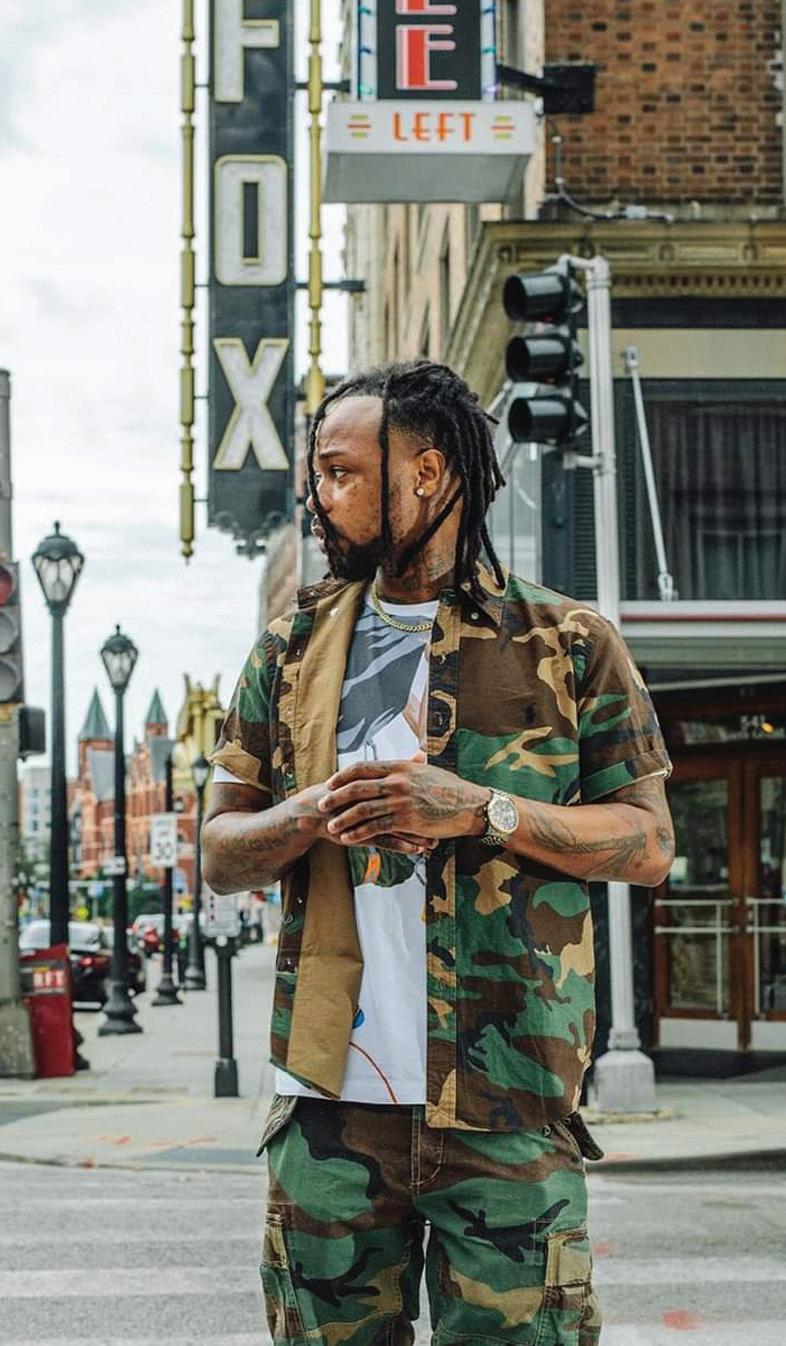
Son Solomon Thurman III was patrolling the area near their gallery as a St. Louis Metropolitan Police Officer when he heard a huge sound of breaking glass. He was a block away on his police bike. He rushed to the family gallery to find that it was targeted, as was the coffee shop next door.
“These windows are double paned, so the first little brick or bang is not going to break these windows,” Patricia said. The police found heavy wood pieces around the corner that would have been used by two people to break the glass. “Someone had to work really hard at it. The same with the doors. I’m at a loss for words about it – but I’m better today than I was last night.”
Solomon III stood watch until his parents arrived. Almost as soon as they showed up, he left to continue patrolling. About an hour later, they had to make a painful decision to put their personal safety ahead of securing their business.
“Our son called us and said, ‘Leave, right away. Drop what you are doing and get out of the area. Four police have been shot and the guys who did it are on the loose,’” Patricia said. It was yet another blow in a season of uncertainty that befell them before the unrest.
way, T-Dubb-O said.
19-year-old black female protestor, who was arrested for her Facebook post that talked about joining the revolution and “come [expletive] this [expletive] up.” The mother told T-Dubb-O that her daughter doesn’t have a criminal record. There was a teen that his group of business owners tried to talk to on Monday night, who told them that he wasn’t scared to die because police were going to kill them any-
These teens were children during the Ferguson unrest. For the past six years, they have watched as systemic racism became more oppressive while little has changed in the justice system, he said.
“This is the difference, this is the attitude,” he said. “This is six years later. It’s everything that the city has done wrong and how it’s failed these children.”
Introducing Vivent Health, founded on the combined expertise of AIDS Resource Center of Wisconsin, Rocky Mountain CARES and St. Louis Effort for AIDS. And steadfastly dedicated to serving anyone and everyone affected by HIV through our comprehensive prevention, care and treatment programs. Learn more at ViventHealth.org
it becomes nonproductive and when you hurt other people to this extent.”
It’s a hurt she made sure to reiterate.
“This thing with George Floyd is very painful,” Patricia said. “It was painful with Michael Brown because we envisioned what we thought happened. We’ve got footage now with George Floyd. That’s what makes it so hard and so sad. Just when you think it’s going away, that footage comes back and it’s back in your face again.”
Watching her business become an indirect casualty of systemic racism and police violence was a tough pill to swallow.
“The first feeling you have is to give up,” Patricia said. “Those were my first thoughts. That’s how I felt last night when we were sweeping up the glass and trying to secure the space. But today, I woke
n Watching her business become an indirect casualty of systemic racism and police violence was a tough pill to swallow.
Patricia and Solomon Thurman Jr. were still unsure if they would survive COVID19 when they were targeted. The intimate gallery had been closed for the past three months due to the pandemic. Now their business suffers two-fold because of the pandemic of racism.
“We know that everybody is hurting. That’s the other side of this,” Patricia said. “Everybody is hurting so bad. Sometimes when people are hurting so badly, they want to hurt everybody else. You want everyone to know that you are hurting. I understand that pain. I don’t understand when
Continued from B1
asked him to define during the Q and A session, since it didn’t come up in his 20- minute introduction.
He wrote about this intriguing term in his book connoting “… Capitalism and Negrofication were mutually— dialectically—constitutive of the modern world.” Or as he so poignantly noted at the vir-
up with so much support from the community that I said, ‘No, we are not going to give up. We are just going to find a safe space and make this happen.’”
The rainbow in their cloud was seeing neighbors come to their rescue. Before they arrived, they were out there at midnight sweeping glass and doing what they can to lighten the load for 10th Street Gallery.
“The level of kindness from people was just unbelievable,” Patricia said.
Thurman Jr. sees the ordeal as a best possible outcome in a worst-case scenario.
“In retrospect as it all turns out, I feel blessed,” he said. Because his son was seconds away, the vandalism and theft
tual live presentation, “political economy and racial control” go hand-in-hand. Many of these issues remain unresolved, he said.
Johnson asserted that the uprising in Minneapolis in reaction to the police murder of George Floyd to the “curbside justice” (police excessive force) of so many people of color such as Michael Brown in Ferguson, is a powerful reminder that while St. Louis is not alone in its anti-Black violence.
Yet why is it extreme?
According to the prodigious
were minimal.
“I was able to get my original artwork. Had he not been here, that would have been a different story,” Thurman Jr. said. “Things that I have worked on for years would have been lost. So, I feel very blessed that I was able to at least survive that part of it. The rest of it I can manage with no problem.”
There was another glimmer of hope in what could have been a hopeless situation. When Thurman Jr. returned for an additional trip to collect art pieces.
“People saw my husband taking stuff out and taking it down the street and thought he was looting,” Patricia said. “And then other people started running in there. He had to tell them, ‘No. This is my business. I am a black business owner and I am not looting.’ They honored that.”
They also count a neighbor to their business and fellow artist Christian King among their guardian angels. King and his wife live street level in a building next door. When they saw what was going on, they immediately sprang into action. They swept up. They also allowed the larger pieces from the gallery that could not fit into cars to be stored in their apartment. King is someone that Thurman Jr. had been mentoring the past few years.
“Christian and his wife were a godsend last night,” he said of his mentee. They are securing their inventory with plans to regroup and reopen. They are unsure if the gallery will remain at 10th Street, but certain that it will back. Patricia said that at some point there will even be an exhibit to house the creative response to the death of George Floyd.
“We want to reopen so that black artists have a secure place to exhibit their work,” Patricia said. “That’s really what we are all about. We are all about being here for the community.”
For more information on 10th Street Gallery, visit https:// www.10thstreetgallery.com.
ST LOUIS PUBLIC LIBRARY'S

St. Louis Public Library would like to invite all readers under the age of 18 to participate in its Summer Challenge.
Read books. Complete activities. Earn points. Win prizes.
To learn more and sign up visit slpl.org/summer-challenge/


researcher and deep and powerful thinker, history tells the tale. It was an imperial city that set the tone for the rest of the nation. “The morning star of U.S. imperialism” from stolen Indian land, genocidal wars and tragic Indian removal. Jefferson Barracks was the epicenter of the nation’s military westward expansion. Side-by-side was slavery and its commercial dominance as has been the modern expropriation of Black neighborhoods (oft-times termed Negro removal). He spends a whole chapter on Mill Creek Valley (think Harris-Stowe State University as a reference point). At one time a bustling community of 20,000 African Americans, it fell victim to the wrecking ball, scattering residents to mostly the city’s Westend. All to feather the nests of the capitalist overlords and appease the white working class through labor contracts. The ideology that emerged from this imperialist U.S. history sought to justify slavery, property rights and greed with the claim that “This is a White Man’s Country.” Therefore, he said “racism is enduring and repetitious with wanton experimentation and strategies of control and exploitation.”
“It’s a hard story,” he admitted, but what he also found was the history of St. Louis radicalism and interracial alliances that are “often forgotten and too scarcely memorialized.” This real thread of radicalism and the push back from conservatives has a long tradition here. From the German immigrant communist who were fiercely anti-slavery to activist Percy Green who was part of the Jefferson Bank demonstration and head of ACTION. Yet alongside him at the bank demonstration was Herschel Walker, chair of the Communist Party. In sum, what is racial capitalism? He reiterated, “White supremacy and empire.” Professor Johnson will be in person at Left Bank Books in the Central West End August 13 for a presentation and book-signing. For more information, visit www.left-bank. com.
With Alvin A. Reid
Since George Floyd’s death at the knee of a Minneapolis police officer, a usually callous sports world has (for the most part) come to realize that things must change in America. Comments from players coaches and commissioners have been coming by the score. Some are heartfelt. Some are suspect. But surprisingly, there seems to be consensus that –maybe for the first time in history – black athletes are black people.
Racism is the one thing that can cook the golden goose. Finally, it seems a majority of powerful, white sports figures have come to realize this. If this feeling of uneasiness lasts only a few months, weeks or days, it should be recognized as a watershed moment.
As usual, black players from the NBA and NFL led to charge to recognize the atrocity that occurred in Minneapolis. White players and coaches suddenly are not afraid to speak out. What was missing were the voices of white coaches and administrators from the major college ranks. We can thank North Carolina Central University basketball coach LeVelle Morton for challenging Power 5 coaches to speak up.
the next day.
“I can’t stay silent. We must stand together for human rights and against racism,” Izzo wrote.
“As a white American basketball coach who has been trusted and accepted into African American homes across our country, the racism and injustice I’ve witnessed has sickened my soul.”
Izzo’s statement somewhat cleared a path for other coaches to speak out – that and the fear of losing black recruits if they remained silent.
The most powerful college coach in America, Nick Saban of Alabama, dared to add the names of other black people’s lives that were ended in horrific ways at the hands of whites in a statement released last Sunday.
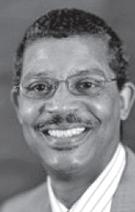
“I am shocked and angered by the tragic deaths of George Floyd, Breonna Taylor and Ahmaud Arbery,” Saban said.
“We’re at an important moment for our country, and now is the time for us to choose kindness, tolerance, understanding, empathy, and most importantly ... it’s time to love each other. Every life is precious, and we must understand we have so many more things that unite us than divide us.”
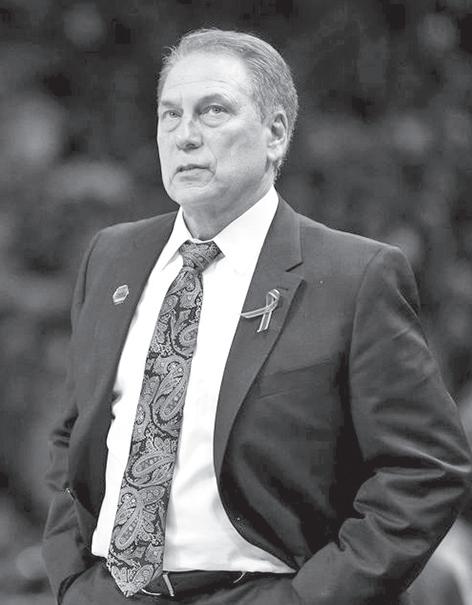
said.
A week had passed after Floyd’s death when told ESPN, “The reality is a lot of these coaches have been able to create generational wealth. Their grandkids’ kids are gonna be able to live a prosperous life because athletes who were the complexion of George Floyd were able to run a football, throw a football, shoot a basketball or whatever have you, so they have been able to benefit from athletes that look like George Floyd and many more.”
“But whenever people (who are) the complexion of George Floyd are killed, assassinated, murdered in the street in broad daylight, they’re silent.”
Michigan State basketball coach Tom Izzo got the message and released a statement
Saban also shared a late Dr. Martin Luther King quote, “Injustice anywhere is a threat to justice everywhere. We are caught in an inescapable network of mutuality, tied to a single garment of destiny. Whatever affects one directly, affects all indirectly.”
Oklahoma football coach Lincoln Riley said on Twitter, “I ALWAYS stand with my players and I am thankful that I was raised in a home that taught me that no human, regardless of race, religion, or any other factor ... should ever be treated differently ... we have a long ways to go as a society – I am committed to being a part of the change.”
Mike Gundy of Oklahoma State also was poignant in a
press release.
“I can’t stop thinking about the horrible situation that happened in Minneapolis. I’ve been at a loss for words to describe the shocking video of George Floyd,” he wrote.
“My heart and prayers go out to his family. This disgraceful event means we must work harder together every day to put an end to the mistreatment of black Americans in our country.”
Minnesota football coach P.J. Fleck, whose team plays in Minneapolis, said “It’s unfortunate and sad, and it hurts my heart and breaks my soul, that it’s happened in a city that I’m so fond and love so much and become so fond of.
“But if it can happen here,
it can happen anywhere. And I think that’s what everybody’s seeing around the country now – is that everyone’s hurting and everyone’s going through this, and it’s not just isolated to one city; that this can happen anywhere in our country. And that is the issue.”
NBA Commissioner Adam Silver, who runs what I think is the most progressive professional sports league in the world, grasps the magnitude of what is happening in America and what must change.
“Just as we are fighting a pandemic, which is impacting communities and people of color more than anyone else, we are being reminded that there are wounds in our country that have never healed,” he
“Racism, police brutality and racial injustice remain part of everyday life in America and cannot be ignored. At the same time, those who serve and protect our communities honorably and heroically are again left to answer for those who don’t.
“This moment also requires greater introspection from those of us, including me, who may never know the full pain and fear many of our colleagues and players experience every day. We have to reach out, listen to each other and work together to be part of the solution.”
Michael Jordan, maybe the most self-centered, non-caring player in the history of the NBA, even felt compelled to
decry racism. This might be the first time in his life he put someone else’s concerns before his own.
“I am deeply saddened, truly pained and plain angry. I see and feel everyone’s pain, outrage and frustration. I stand with those who are calling out the ingrained racism and violence toward people of color in our country. We have had enough.
“I don’t have the answers, but our collective voices show strength and the inability to be divided by others. We must listen to each other, show compassion and empathy and never turn our backs on senseless brutality. We need to continue peaceful expressions against injustice and demand accountability.
“Our unified voice needs to put pressure on our leaders to change our laws, or else we need to use our vote to create systemic change. Every one of us needs to be part of the solution, and we must work together to ensure justice for all.”
I’m sorry, but I can’t help but remember that these words are coming from the same guy who didn’t lift a finger or raise his voice to help a black Democrat taking on avowed racist Jesse Helms during a Senatorial race in the 90s. Lastly, I want to mention Joe Burrow.
The young man led LSU to the national championship, won the Heisman Trophy and was selected overall No. 1 in the NFL Draft by the Cincinnati Bengals. He will start at quarterback next year and the spotlight on him will be blinding. The last thing he needs is controversy. But he was among the first white NFL players to share his thoughts on Floyd’s death and the fate of America.
“The black community needs our help. They have been unheard for far too long. Open your ears, listen, and speak. This isn’t politics. This is human rights,” he said.
You can contact Alvin Reid at @aareid1.
Earl remembers his uncle, NBA great Wes Unseld
By Earl Austin Jr.
Of the St. Louis American
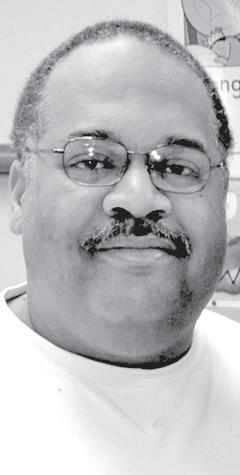
Earl Austin Jr.
The basketball world suffered another great loss this week with the passing of NBA legend Wes Unseld at the age of 74. To most, he will be remembered as one of the greatest players in the history of the National Basketball Association. He was a dominating figure during his 13-year career with the Baltimore/ Washington Bullets from 196981. To me, he was simply Uncle Wes. He was the fourth of seven children born to my grandparents Charles and Cornelia Unseld, in Louisville back in 1946. He was the younger brother of my late mother Sandra Austin, who was the oldest of the seven Unseld kids.
He was one of the best high school players in the history of state of Kentucky during his career at Seneca High. He stayed home for college to play at the University of Louisville, where he was a two-time AllAmerican. He was drafted by the then-Baltimore Bullets in 1969, where he won the Rookie of the Year and Most Valuable Player award in the same season. Only Wilt Chamberlain has accomplished that feat before in 1960 and nobody else has done it since. In 1978, he led the Washington Bullets to their only NBA world championship over the Seattle Supersonics. Although he was only 6 feet 7 inches, he was a star center while playing in an era of some of the greatest big men to ever play the game. He was the best player ever to throw the outlet pass to start the fast break and the best ever to set picks to get his teammates open. I still love it when I see a player throw a great outlet pass on television and the commentator always says, “That’s a Wes Unseld outlet pass.” He was also a larger than

life figure off of the basketball court with his community involvement. He and my Aunt Connie founded the Unseld School in 1979, which is still going after more than 40 years in Baltimore. They broke
ground on the new school just a few months after he had hit the clinching free throws to give the Bullets their world championship. What started as a day care center morphed into a fullfledged school that served kids
from daycare and nursery age through middle school.
Uncle Wes was my No. 1 sports hero and role model from the time he put on that Baltimore Bullets jersey as a rookie in 1969. I was only four years old and living in Milwaukee at the time, but I knew anything and everything about what was going on with the Bullets. I was always surrounded by Bucks fans, but I always represented the Bullets and Uncle Wes with great ferocity. Whenever the Bullets came to Milwaukee to play the Bucks, our family was front and center at every game. Afterwards, Uncle Wes and a few of his teammates would come over to the house and hang out with us.
As I got older and started to embark on my own basketball career, I patterned my playing style after his. I was an undersized center who used physical strength, fundamentals and intellect to overcome the opposition. I watched his every move on the court. When I got to college at Lindenwood University, I wore his No. 41 with great pride. The biggest
compliment I would always get was when people would tell me I played like Wes Unseld without knowing our family connection.
Most of all, I will remember Uncle Wes as just being a cool dude to be around. I worked his basketball camps throughout high school and I had a great time being with him, my Aunt Connie and my cousins Kimberly and Wes. He was a down to earth man with a great sense of humor. If you didn’t know him, you would have never thought that he was this NBA legend. He never talked about it. He was a quiet man who exhibited great character and strength in everything he did.
Uncle Wes never needed to talk about his basketball greatness. He had a proud nephew in St. Louis to do it for him. Rest well Uncle Wes. You were a great player and a great man.
Catch part II of “It runs in the Family” in next week’s edition.
By Orvin T. Kimbrough
For The St. Louis American
August 2014. I had just completed my first year as CEO of United Way when Michael Brown was killed. I was heartbroken by that event and disappointed by our inability as a country and region to grasp the enormity of the issues that underlie the people’s protest. At the time, our governor instituted a blue-ribbon committee to “study the social and economic conditions that impede progress, equality and safety in the St. Louis region.” The commission concluded, “Change requires different choices, different decisions, and different actions. Change requires new effort, new relationships, new habits. Change requires letting go of the known and wading through the unfamiliar found in the dark of the unknown.” It served as a national declaration and suggested a way forward.
perceived by the most powerful as a vote against self-interest. Instead, it should be embraced as a necessity for the future prosperity of our country and region.
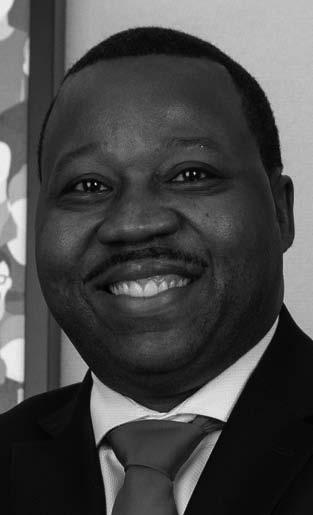
Michael Brown’s killing sparked a national movement with a thin ray of hope. Sadly, the momentum fizzled and the ray faded. Why? Because those who are in the most powerful positions in our country and region, up to this point, have chosen not to embrace fully the tenants of the commissions charge on a local, regional or national level. To embrace this declaration is
As a black man, I was really stunned by the intentionality with which so many in our region and beyond chose not to see the humanity of Michael and what this act truly represented for black America. I was both sad and numb by everything that I saw going on. I was dumbfounded that many in the most powerful corners of St. Louis were seemingly seeing, for the first time, the inequities and injustices that were generations in the making and not far from sight. I found it hard to believe that we as a region didn’t know life was this bad for many in black St. Louis. Sometimes denial is the sedative we ingest to avoid dealing with the really tough struggles in life. And the toughest struggles always come down to the fair dispensation of justice and economics.
As a child, I knew a fair number of black men who spent time in jail. It actually seemed more like a rite of passage. As an adult with a newfound understanding of statistics and probability, I found it absolutely abhorrent that such a disproportionate percentage of black men spend time incarcer-
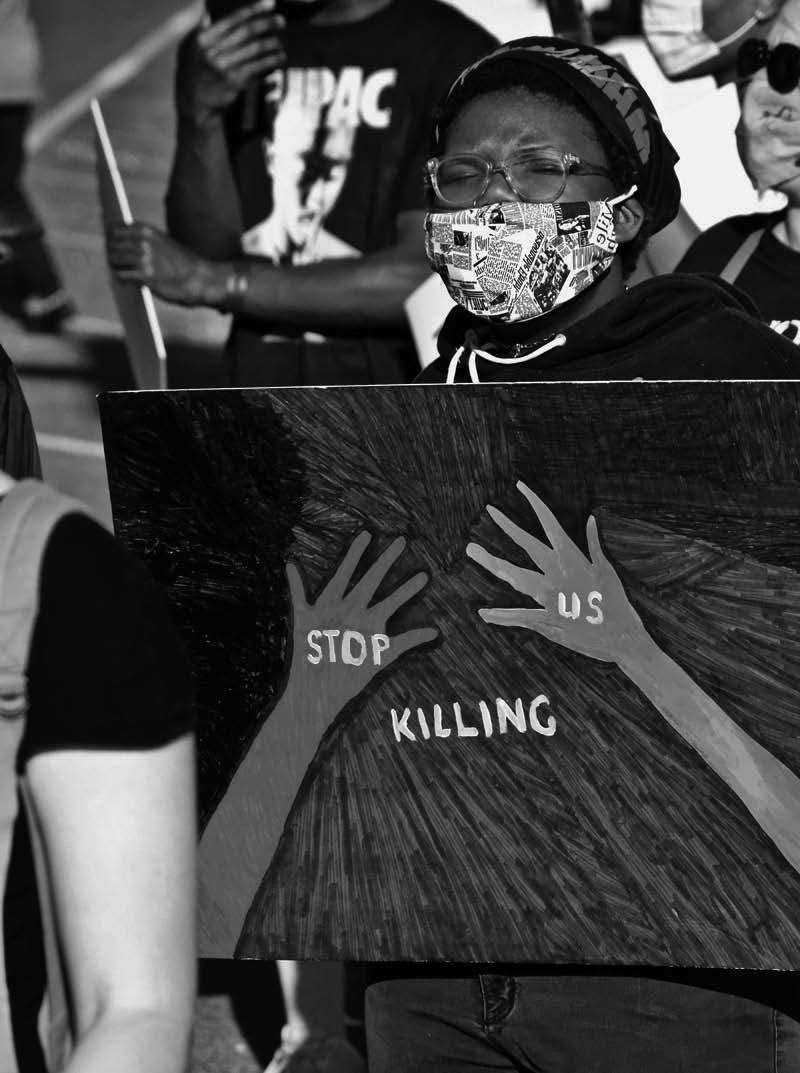
ated. I find it suspicious that black men are more likely to die for non-violent crimes and misinterpretations of normal behavior like retrieving license and registration upon command.
In the aftermath of Michael Brown’s killing, I engaged in many conversations with top leaders in our region. It was
rarely comfortable. I struggled with whether I should speak truth or placate these leaders by dodging the really thorny conversations that would have me challenge their world view.
I didn’t agree with their common belief that the protestors were anarchists. I didn’t think that to say “black lives matter” was to suggest that no
A woman made a simple request on a sign she brought to a protest of police violence against African Americans in St. Louis on Friday, May 29.
Photo by Wiley Price
other life mattered, particularly “blue lives.” These were and continue to be the binary choices that African Americans who walk in this country have to face.
Six years ago, I said, “Ferguson is the canvas on which so many people have chosen to paint the picture of their frustration, despair and hopelessness. I urge our region, for the sake of future economic and spiritual prosperity, to search our hearts and be intentional with systems change that give all people a shot at winning.”
Today we find ourselves in the midst of another people’s protest. The core of the outrage remains the same: the absence of equity across any number of domains. If we examine our national, local and regional balance sheet, where would we find equity? In most conversations about positioning the St. Louis region for growth we typically default to our many assets. We tout our charitable, cultural, academic and healthcare prowess. But these assets
do not match the scale of our liabilities.
We have chosen for generations not to see the humanity of all people. We have failed to consistently advance policies that promote justice. We have failed to address in any serious way the systems that continue to produce economic desserts and the means for upward mobility.
I still believe in this region and country. But I am frustrated by the lack of vision. I am frustrated that we keep doing and saying the same things and yet expect different outcomes. I am frustrated that we have not yet realized the interconnectedness of our destinies.
If you are wondering what you can do right now, choose not to be silent. Let your voice be heard. Choose not to allow a handful of violent agitators, who have embedded themselves among otherwise peaceful protestors, to distract you from the real tragedy – a life was taken prematurely. A system continues to fail the most marginalized.
Finally, choose to be counted in the U.S. census and vote. Your vote matters locally and nationally. The way forward is through shared power and inclusive economic prosperity, which demands accountability from systems and the people who build them. It is time to act.
Orvin T. Kimbrough is chairman and CEO of Midwest BankCentre.
National Urban League
The following statement was signed by National Urban League President and CEO
Marc H. Morial, Michael P. McMillan, president and
CEO of the Urban League of Metropolitan St. Louis, and 67 other regional Urban League leaders from around the country. Our communities are overwhelmed with grief. We are
heartsick over the inhumanity we have witnessed in the recent deaths of Breonna Taylor, George Floyd and Ahmaud Arbery. We are appalled by the callous response from the authorities who shrugged in the face of evil.
Cities across the nation have erupted in rage and despair.
As civil rights leaders who are committed to racial justice, we share the protesters’ anguish, and the heartbreak of the communities where uprisings have turned violent.
There are those who are inciting violence and mayhem. And there are those engaged in peaceful protest. No one should

assume they are the same people, and we refute any attempt to discredit or dismiss the just cause for which people are marching based on infiltrators bent on sabotage. We support the right of citizens to engage in peaceful protest. We condemn the use of excessive force to dispel demonstrations.
We are hearing what Martin Luther King Jr. famously called “the language of the unheard.” When George Floyd begged for his life as Minneapolis Police Officer Derek Chauvin pressed his knee into Floyd’s throat, he was unheard. The onlookers pleading with Chauvin to stop were unheard.
The cries for justice have gone unheard long enough.
The long-overdue arrests of Ahmaud Arbery’s killers and one of the officers involved in George Floyd’s death are merely a first step in a long journey. The other officers involved in Floyd’s killing also must be held accountable.
The Urban League Movement has proposed specific recommendations for police reform and accountability. These include the widespread use of body cameras and dashboard cameras, revision of use-of-force policies, officer training and hiring standards, and the immediate appointment
of independent prosecutors to investigate police misconduct. But even more than these measures, we need a revision of our culture. It’s a culture that teaches a white woman walking her dog in Central Park that racially-motivated police brutality is a weapon she can use to enforce her own preferred social code.
As we pursue these measures to reform the police in our communities, we call upon all community leaders, elected officials, corporate leaders and social institutions to join us in pursuing policies that promote racial reconciliation.
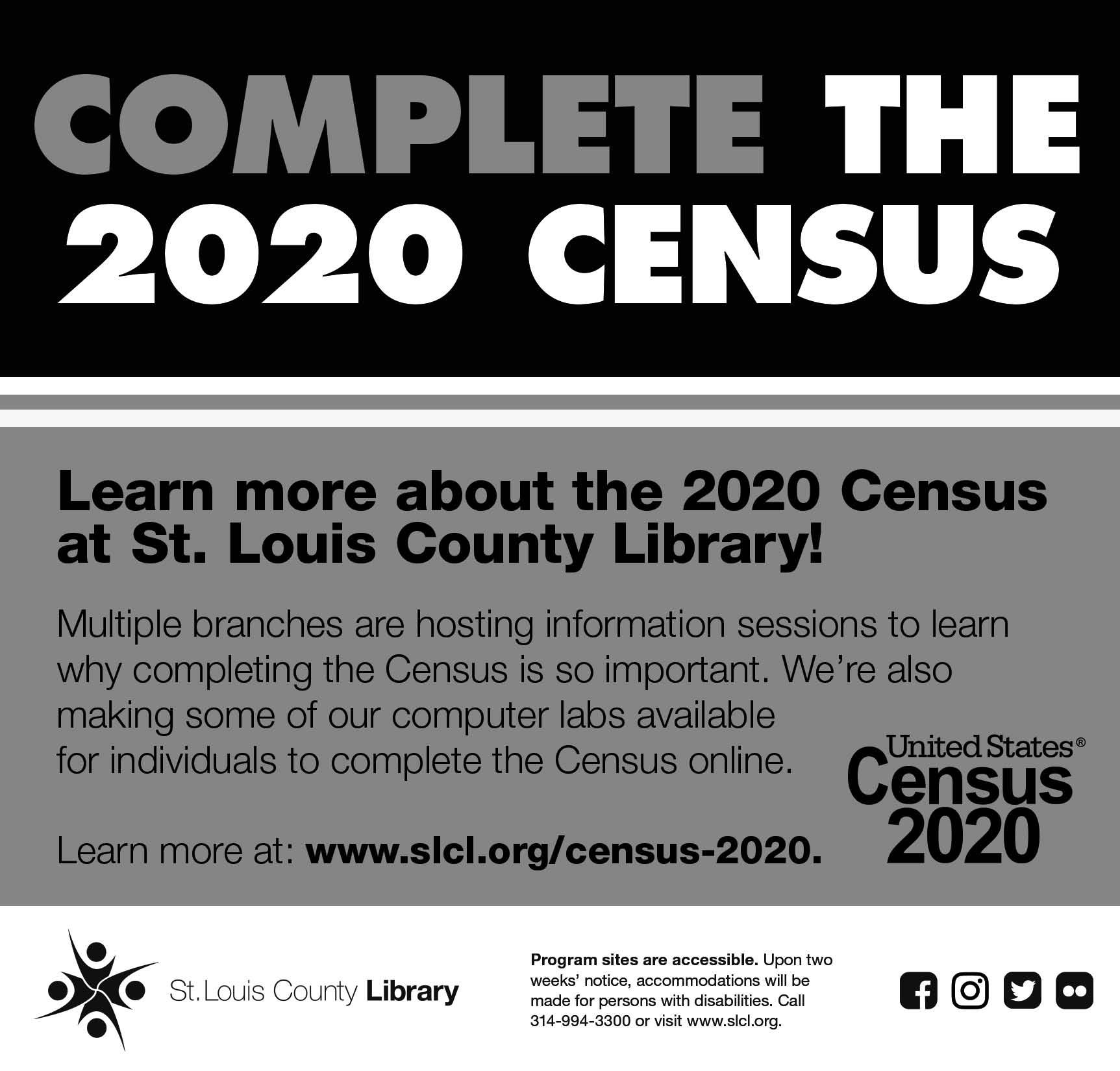
What we have done in the past will be different from what we do now
By District Elder Ron Stephens For The St. Louis American
The First Church Of God In Christ Board of Directors has decided to implement a social distancing plan for Temple Church of Christ. This is Phase 1, which proposes to protect the health of our members, guests, and community and to play our part to slow the spread of this virus.
The Phase 1 outlined below will go into effect starting Sunday, June 7 and will extend until Sunday, August 31. On or before August 1, the Board of Directors will evaluate whether or not to return to normal operations on August 31. What we have done in the past will be different from what we do now. Phase 1 clarifies how we enter the church, find our seat, use the restroom and make the church a safe place to worship. All meetings (revivals, conferences, and special events) on our 2020 calendar have been cancelled or postponed until further notice.
The weekly changes are as follows: Sunday School (online on Saturday at 10 a.m.), Sunday Morning Worship Service (10:30 a.m.), Children’s Church (cancelled for Sunday),
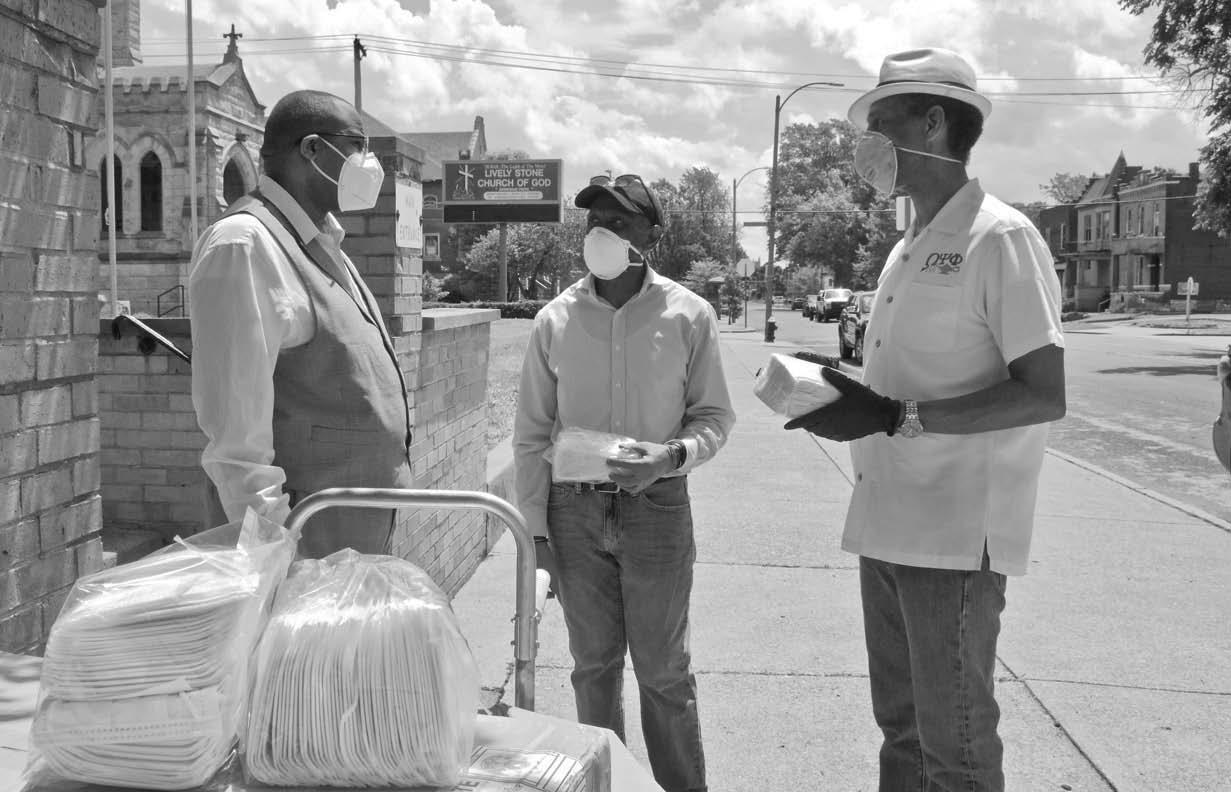
Monday Night Prayer (online at 7 p.m.), Wednesday Bible Study (online at 7 p.m.), Choir Rehearsal (Sunday morning at 9 a.m.).
To reduce the spread of germs, masks will be distributed to all members and guests who enter the sanctuary. Sanitizers and hand wipes will be available in the church lobby. While in the lobby area, the Nurses Ministry will take temperatures with an infrared thermometer on a voluntary basis.
The church leadership team will clearly communicate the cleaning plan to the congregation. Communication is paramount for instilling confidence (in members and guests) that pews, doors and the building have been sanitized.
Each Sunday morning, men will be in the lobby area. During the first day of returning to church, only men will serve as ushers and greeters. They will continue to serve in this capacity until August 31. Ushers will escort members and guests to a designated seat in the sanctuary. Everyone must wear a mask (which will be distributed to those without masks). Rubber gloves will be available (upon request for members). No shaking of hands of greeters and ushers. Sanitizer will be available in the lobby area). No hugging. No loitering in the lobby area. Seating will be assigned to accommodate the latest recommendations for safe physical distancing. Seating
will also be available in the balcony. Members and guests will be seated in a staggered fashion. Members will sit 6 feet apart from each other, and every other row will be closed. All seniors will be seated in a designated area on the lower level.
While using every other pew will cut our seating capacity in half or more, making seating available in the churches’ balcony will increase the seating capacity. We anticipate seating 100 people on the lower level and 100 people on the balcony.
The Counting Ministry will continue to count members. Knowing where members are assigned and their likely circulation paths throughout each Sunday can support a focused cleaning response if
a member does exhibit symptoms. Using a seating chart, members will put names to seats to clearly communicate which pews are assigned to everyone.
Nurses Ministry is critical to the transitioning plan. We are implementing voluntary screening protocol for all members. Every Sunday before a member enters the sanctuary there will be an opportunity to be screened. Screening questions may be asked. Screening questions range from travel-related questions to health symptoms. An infrared thermometer may be used. The results of the screen will indicate whether the member should enter the sanctuary or remain home.
While many members have transitioned to worshipping
God from home, some members must come to church. They cannot work remotely due to the nature of their role at church. Some of these individuals are deacons, staff on audio/ visual ministry, and janitorial staff. These essential individuals must be identified and scheduled to work at specific times and days.
Church staff will post signs indicating symptoms and urging people to stay home and seek medical attention if they have symptoms. Cross-contamination from multiple people sharing pews is a key concern. The Men’s Ministry will wipe down pews and doors before and after worship service. Clean pews are key for a safe environment. The Men’s Ministry will clean the building regularly, paying extra attention to high-touch surfaces. The message of weekly cleaning will be paramount for instilling confidence that pews have been sanitized and the church is clean.
Staff will isolate anyone who is or becomes symptomatic while at church. The pastor will designate






Responsible for handling assigned claims from initial assignment to closure, as well as provide assistance in various administrative functions associated with the large casualty lines of business.
To apply, please visit: https://www.safetynational.com/ careers-page/
Responsible for various tasks related to: creating, closing, changing and reopening claims in ClaimCenter and SICS
To apply, please visit: https://www.safetynational.com/ careers-page/
Responsibility for the collection, preparation, documentation and communication of IS requirements, both business and technical. Demonstrates clear and working knowledge and concepts of Business Analysis and Information Technology. Capable of working independently, but may be assigned to work under the guidance of a Senior Business Systems Analyst when engaged in larger, more complex projects. To apply, please visit: https://www. safetynational.com/careers-page/
The City of Brentwood is creating a hiring list for the Fire Department. Application packets and information can be picked up in person at the Brentwood Fire Department or Brentwood City Hall. Information can also be obtained online at www.brentwoodmo.org/jobs. Please see the website for all details and application requirements. Posting closes June 30th, 2020.
This position is responsible for overall development, coordination and oversight of the delivery of Covenant House Missouri Support Services that include, but are not limited to, wellness services, outreach, employment, education and all other services needed to ensure youth can achieve the goal of living independently in the community. To apply, visit our website at www.covenanthousemo.org
The Circuit Court of St. Louis County, Missouri, is soliciting candidates for the position of Family Court Commissioner of the Circuit Court of St. Louis County - Juvenile Division. The Circuit and Associate Circuit Judges en banc will make the appointment for a term of (4) years at an annual salary of $137,745, payable by the State of Missouri. Go to the Court’s web page at https://wp. stlcountycourts.com/. Complete the questionnaires and submitted in writing to Hope Whitehead, Judicial Administrator, 105 South Central Avenue, Clayton, Missouri 63105, or via email to Hope.Whitehead@ courts.mo.gov on or before 5:00 p.m. Friday, June 12, 2020. The selection of the Commissioner is scheduled to take place upon a vote of the Court en banc on Wednesday, July 8, 2020.

CAASTLC is accepting sealed bids to provide labor and materials for its residential weatherization program. LIWAP (made available through CAASTLC) is federally funded and administered by the U.S. Department of Energy (DOE) through the Missouri Department of Natural Resources (DNR).
This weatherization grant is funded through the DOE and is subject to all of its provisions. Bid packages will be available to be picked up at CAASTLC starting Wednesday, 6/10/2020, at 9:00 a.m. and will be available for downloading on CAASTLC’s homepage at https://www.caastlc.org.
CAASTLC will have a Pre-bid Conference, via online Zoom Conference, on Tuesday, 6/16/2020, at 9:00 a.m. for questions, etc. The meeting link for this Conference will be available on CAASTLC’s homepage (https://www.caastlc.org/) the day of the Conference and the login attendee ID and password for this Conference will be in the bid packages.
Bids must be sealed, marked “LIWAP – DNR Sealed Bid” and delivered to CAASTLC, Inc., 2709 Woodson Road, St. Louis, MO 63114, no later than 5:00 p.m., Friday, 6/26/2020.
Bids will be opened and read publicly, via online Zoom Conference, at 2:00 p.m., Monday, 6/29/2020 at CAASTLC’s main office. The meeting link for this Conference will be available on CAASTLC’s homepage (https://www.caastlc. org/) the day of the bid opening and the login attendee ID and password for this Conference will be in the bid packages.
Great Rivers Greenway is soliciting sealed bids for demolition of improvements at 572 Yarnell Rd. in St. Louis County, Missouri. Go to www.greatriversgreenway.org/ jobs-bids/ and submit by July 1, 2020.
The City of Crestwood is seeking bids for the 2020 CDBG ADA Compliant Picnic Table project. This project is funded in whole or in part with Community Development Block Grant funds pursuant to Title I of the Housing and Community Development Act of 1974, as amended. All applicable federal regulations shall be in full force and effect. Qualified contractors may obtain a Project Manual online at www.cityofcrestwood.org or in person at the City of Crestwood Public Works Department in the Government Center located at #1 Detjen Dr. St. Louis, MO 63126. Bids are due by 10:00 A.M., on Thursday, June 11, 2020. Please call (314)729-4720 for more information.
Public Notice of Single Source Procurement
Notice is hereby given that the Metropolitan St. Louis Sewer District is proposing to procure temporary
services from Amitech Solutions in an effort to support the IT Technology Plan. The District is pro-
the internal expertise to fulfill this Information Technology role. Any inquiries should be sent to strenz@stlmsd.com. Metropolitan St. Louis Sewer District is an Equal Opportunity Employer.
Pinnacle Contracting
Front Page Lofts
300 North Tucker Boulevard, St. Louis, MO 63101
Due date: 6/30/20 at 2:00pm Pre-bid walkthroughs: 6/9 (8am-9am), 6/16 (1pm-2pm), 6/23 (1pm-2pm), 6/25 (8am-9am)
*Please visit the Building Connected Project page to access the sign up sheet for the walkthroughs. You must sign up to attend.
Description: Pinnacle Contracting is accepting bids for: Renovation and adaptive re-use of the former PostDispatch Building in downtown St. Louis. The building will be converted into 51 apartments and amenity spaces. The following trades have been awarded: Roofing, Plumbing, Fire Protection, HVAC, and Electrical. Project to start 8/1/20 with an overall 9 month duration. Project is Sales Tax Exempt. MBE/WBE participation is required per Mayor’s Executive Order. Project will require Missouri Annual Prevailing Wage Order #26.*You may view the plans/specs and submit bids on Building Connected. For any questions please contact Keana at bids@pinnaclecontracting.com, or 314-783-8000 ext. 0.
via MissouriBUYS. Bidders must be registered to bid. For specific project information and ordering plans, go to: http://oa.mo. gov/facilities
ST. LOUIS COMMUNITY COLLEGE
The St. Louis Community College is requesting submittals of experience and qualifications from architectural/ engineering firms, Consulting Agreement Contract No. A20 0320 for Design Services for the Renovation of the 4th Floor Interior Spaces of the Center for Nursing and Health Sciences at St. Louis Community College at Forest Park. Submittals of
ing services and consulting agreement procedures may be obtained from the Manager’s office, at the above address or by calling (314) 951-9897
An Equal Opportunity and Affirmative Action Employer
www.stlamerican.com
Ferguson-Florissant School District is issuing a Request for Proposals to furnish, ship and install all materials and equipment for various water cooler installations. Proposal must be submitted no later than 1:30pm., Monday June 15, 2020. For additional information visit our Website at http://new.fergflor.k12. mo.us/Facilities-rfq Matt Furfaro 314-824-2418.
UNTIL 1:30 PM, 6/11/2020 v i a MissouriBUYS. Bidders must be registered to bid. For specific project information and ordering plans, go to: http://oa.mo. gov/ facilities
Bids for REBID – Repair Parking Lots and Driveways Troop C Headquarters Weldon Springs, St. Charles County, Missouri Project No. R1905-01 will be received by FMDC, State of MO, UNTIL 1:30 PM, 6/11/2020 via MissouriBUYS. Bidders must be registered to bid. For specific project information and ordering plans, go to: http://oa.mo. gov/facilities
OF ST LOUIS DEPARTMENT OF HUMAN SERVICES REQUEST FOR PROPOSALS (RFP)
Beginning May 18, 2020 Requests for Proposals for FY2020 Emergency Solutions Grant (ESG) Emergency Shelter Operator(s) for Biddle Housing Opportunities Center (BHOC) are available at: https://www.stlouis-mo.gov/ government/procurement/ or by contacting BickfordA@stlouis-mo.gov
The deadline for submitting proposals is 4:00 p.m., June 17, 2020. INVITATION TO BID FERGUSON-FLORISSANT SCHOOL DISTRICT WATER COOLER INSTALLATION (3) LOCATIONS
Bids for Roof Replacement, Missouri School for the Blind, St Louis, Missouri, Project No. E190801 will be received by FMDC, State of MO, UNTIL 1:30 PM, 6/11/2020 via MissouriBUYS. Bidders must be registered to bid. For specific project information and ordering plans, go to: http://oa.mo. gov/facilities
Bids for Westminster R e c l a m a t i o n Project, Callaway County, Missouri, Project No. Y2002-01 will be received by FMDC, State of MO, UNTIL 1:30 PM, 5/28/2020 via MissouriBUYS. Bidders must be registered to bid. For specific project information and ordering plans, go to: http://oa.mo. gov/ facilities


Advertised herein is subject to the Federal Fair Housing Act, which makes it illegal to advertise any preference, imitation, or discrimination because of race, color, religion, sex, handicap, familial\status, or national origin, or intention to make any such preference, limitation, or discrimination.“We will not knowingly accept any advertising for real estate which is in violation of the law. All persons are hereby informed that all dwellings advertised are available on an equal opportunity basis.”
